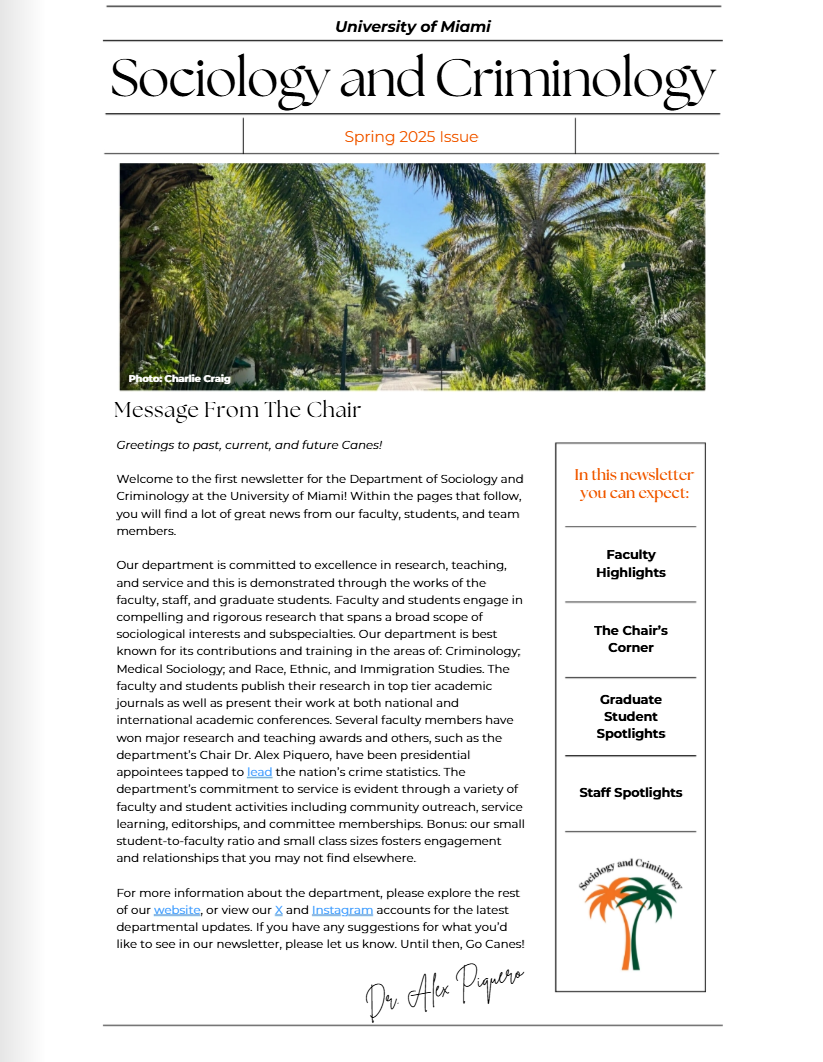 We’re excited to share with you our inaugural Department of Sociology and Criminology newsletter, highlighting the remarkable strides from our students, faculty, and staff!
We’re excited to share with you our inaugural Department of Sociology and Criminology newsletter, highlighting the remarkable strides from our students, faculty, and staff!
 The Department of Sociology is proud to recognize Professor Alex Piquero’s induction into the Bouchet Honor Society, a prestigious organization that honors exceptional scholarly achievement and promotes excellence in doctoral education and the professoriate. This distinction reflects Professor Piquero’s longstanding commitment to academic excellence and his dedication to advancing equity and leadership in higher education.
The Department of Sociology is proud to recognize Professor Alex Piquero’s induction into the Bouchet Honor Society, a prestigious organization that honors exceptional scholarly achievement and promotes excellence in doctoral education and the professoriate. This distinction reflects Professor Piquero’s longstanding commitment to academic excellence and his dedication to advancing equity and leadership in higher education.
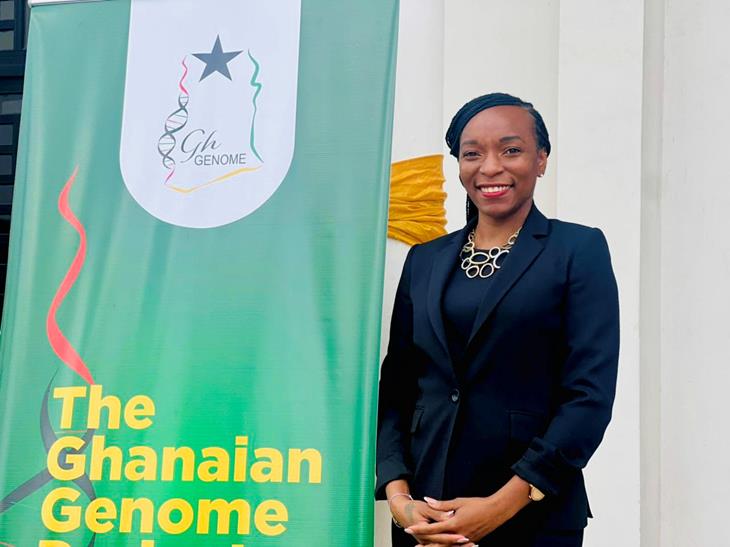
PLEASE Congratulate!
Shameka Poetry Thomas, Ph.D. is a now a Global Health Fellow 2022-23, joining the Department of Global Health and Population for the new academic year at Harvard University. Dr. Thomas is a Medical Sociologist and Reproductive Health Scientist who is an alum of Spelman College and received her Ph.D. from the University of Miami. Dr. Thomas recently completed a two-year postdoctoral intramural fellowship at the National Institutes of Health (NIH) in the National Genome Research Institute’s Health Disparities Unit Lab. At NIH, Dr. Thomas led a project on patient perceptions of noninvasive prenatal testing (NIPT) among Black women with and without genetic conditions, such as sickle cell disease. Her project is the first of its kind to solely investigate Black women’s perceptions of advanced reproductive genetic technology among sickle cell disease patients in the United States. Dr. Thomas also mentored several post-baccalaureates who have both got accepted to medical school and/or applying to medical and public health programs. One of her former undergraduate students at University of Miami (Tiara Ranson- who is currently starting her MPH at University of Washington-Seattle) also worked as her summer intern at NIH; and has coauthored three papers under Dr. Thomas’ mentorship. Dr. Thomas was also featured as an early-career scientific investigator on the NIH postdoc profile, to read more: Postdoc Profile: Finding the Narrative Behind the Numbers | NIH Intramural Research Program. Currently, Dr. Thomas is working as the principal investigator (PI) on a scientific research project at the University of Ghana-East Legon, where she will focus on young adult women and teenage girls of reproductive age with sickle cell disease under the Ghanian Genome Research Project. Above is a photo of her attendance at the official launch ceremony of the Ghanian Genome Project (27th August 2022) which is directed through Dr. Solomon Ofori-Acquah’s team at the West African Genetics Medical Centre and Korle Bu Teaching Hospital of Ghana.
Dr. Thomas is kindly interested in building research alliance between the US and Ghana. To connect with her on the intersection between Black women’s reproductive health and sickle cell disease, please contact her at shamekathomas@hsph.harvard.edu or follow her on twitter @DrT_theScholar.
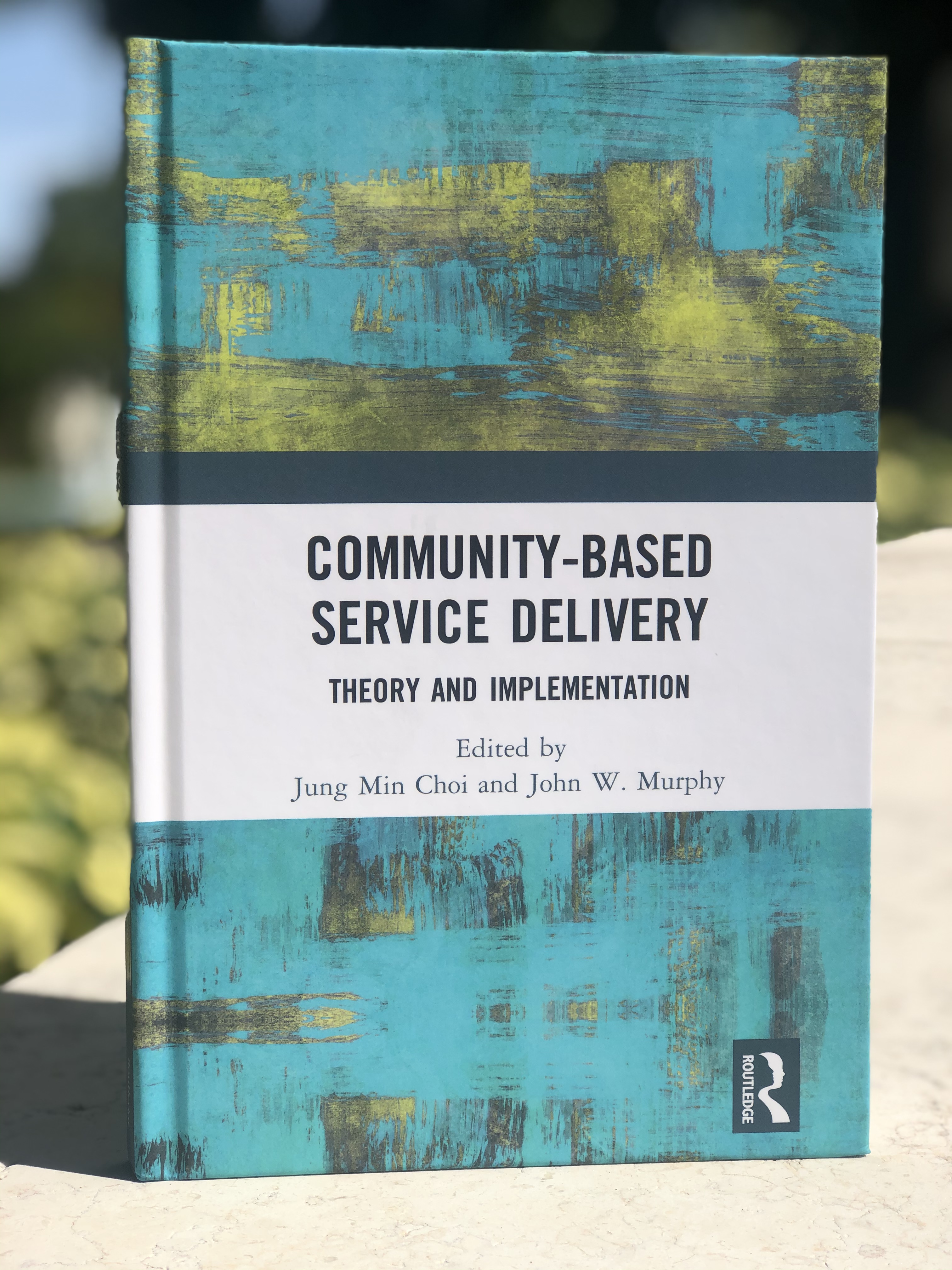
This book takes up the challenge of the failure of most initiatives in community-based service delivery to address the significant philosophical shift that is necessary to create, implement, and evaluate appropriately these sorts of projects. Challenging the tendency to focus entirely on practicalities, the authors emphasize the centrality of philosophy to any successful community-based undertaking. While fully acknowledging the importance of local knowledge and the guidance of projects by local people, this volume shows that these principles are often at odds with the 'Cartesian' mindset that underpins much project planning, with its emphasis on objectivity in science and knowledge. Since all knowledge is mediated by human activity and embedded in language and other modes of expression, this dualist approach must be reconsidered. A thorough rethinking of traditional service delivery, which takes into account issues of data, methodology, and bias together with questions of generalizability, community, power, and communication.
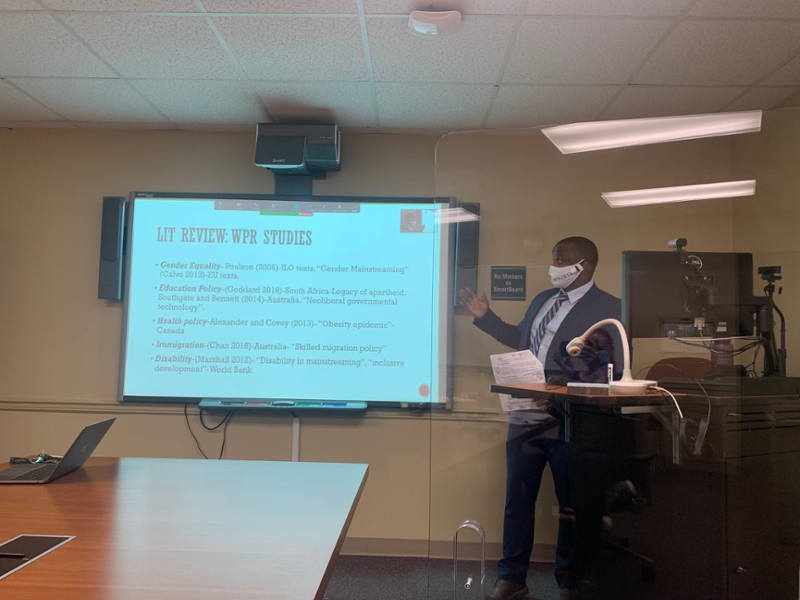 Tebogo Banthusi Sebeelo successfully defended his Ph.D. Dissertation, “Alcohol Consumption in Botswana: “What’s the Problem Represented to be” An Analysis of Policy, Governance, and the Logics of Alcohol Control Measures. 2008-2020” March 31. Congratulations, Dr. Sebeelo on a magnificent job!
Tebogo Banthusi Sebeelo successfully defended his Ph.D. Dissertation, “Alcohol Consumption in Botswana: “What’s the Problem Represented to be” An Analysis of Policy, Governance, and the Logics of Alcohol Control Measures. 2008-2020” March 31. Congratulations, Dr. Sebeelo on a magnificent job!
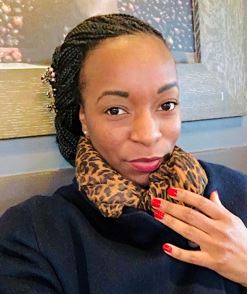 The Department of Sociology asks you to join us in congratulating our recent PhD graduate, Dr. Shameka Thomas. She has accepted a prestigious two-year Postdoctoral Fellowship at the National Institutes of Health/Genomics Research Institute. Her research focus will be health disparities and non-invasive prenatal testing among Black women with genetic conductions such as sickle cell. Dr. Thomas reports, “As a Postdoctoral Investigator, my research will focus on reproductive health disparities and non-invasive prenatal testing among Black women with genetic conditions (e.g. sickle cell). I will be relocating to the Washington DC area to work at the NIH (Bethesda campus); starting October 2020.“ Best wishes to Dr. Thomas as she pursues this new track in her early research career.
The Department of Sociology asks you to join us in congratulating our recent PhD graduate, Dr. Shameka Thomas. She has accepted a prestigious two-year Postdoctoral Fellowship at the National Institutes of Health/Genomics Research Institute. Her research focus will be health disparities and non-invasive prenatal testing among Black women with genetic conductions such as sickle cell. Dr. Thomas reports, “As a Postdoctoral Investigator, my research will focus on reproductive health disparities and non-invasive prenatal testing among Black women with genetic conditions (e.g. sickle cell). I will be relocating to the Washington DC area to work at the NIH (Bethesda campus); starting October 2020.“ Best wishes to Dr. Thomas as she pursues this new track in her early research career.
August, 2020
 The Department of Sociology is pleased to announce the appointment of a new Chair, Professor Alex Piquero, starting August 15, 2020. After arriving in Miami this summer, he was asked to express his thoughts about joining and leading the department during these times. He wrote, “It is my honor and privilege to join the Department of Sociology as its new Chair. The Department of Sociology has educated undergraduate and graduate students for well over fifty years on critical issues including, among other topics, race/ethnicity, substance abuse, criminology and criminal justice, and stratification. The faculty are a distinguished group, not only because of their research productivity but also because of their teaching excellence. As well, the faculty in the Sociology Department are involved in important service functions in the local community, throughout Florida and the rest of the United States, and internationally as well. Now more than ever, the study of sociology and criminology is needed to help understand the world’s most salient social, racial, and health inequalities and injustices and the results of this line of research will help to inform discussions and decisions that are made in public policy. As Chair of the Sociology Department, my goal is to do all I can to advance the research, teaching, and service mission of our faculty and instructors but most important to ensure the success of our undergraduate and graduate students. As a strong proponent of teacher-student collaborations, I firmly believe that faculty and students will learn from one another. In the Department of Sociology, where we conduct rigorous and objective science to help inform policy issues, we embrace the University’s motto of “We are One U”—working in a collaborative spirit to making Miami, Florida, and the rest of the world a more just and equitable place.”
The Department of Sociology is pleased to announce the appointment of a new Chair, Professor Alex Piquero, starting August 15, 2020. After arriving in Miami this summer, he was asked to express his thoughts about joining and leading the department during these times. He wrote, “It is my honor and privilege to join the Department of Sociology as its new Chair. The Department of Sociology has educated undergraduate and graduate students for well over fifty years on critical issues including, among other topics, race/ethnicity, substance abuse, criminology and criminal justice, and stratification. The faculty are a distinguished group, not only because of their research productivity but also because of their teaching excellence. As well, the faculty in the Sociology Department are involved in important service functions in the local community, throughout Florida and the rest of the United States, and internationally as well. Now more than ever, the study of sociology and criminology is needed to help understand the world’s most salient social, racial, and health inequalities and injustices and the results of this line of research will help to inform discussions and decisions that are made in public policy. As Chair of the Sociology Department, my goal is to do all I can to advance the research, teaching, and service mission of our faculty and instructors but most important to ensure the success of our undergraduate and graduate students. As a strong proponent of teacher-student collaborations, I firmly believe that faculty and students will learn from one another. In the Department of Sociology, where we conduct rigorous and objective science to help inform policy issues, we embrace the University’s motto of “We are One U”—working in a collaborative spirit to making Miami, Florida, and the rest of the world a more just and equitable place.”
We are sure many will join us in wishing him well.
July, 2020
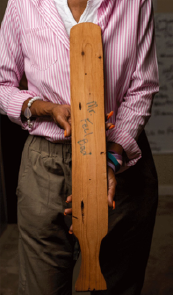 |
| photo credits: Timothy Ivy at the Huffington Post |
Prof. Nick Petersen’s co-authored Social Problems article entitled “School Discipline and the Legacy of Racialized Violence: Historic Lynching and Racially Disparate Corporal Punishment in Southern Schools” was recently featured in a full-length Huffington Post piece. The study examined whether lynchings that occurred between 1865 and 1950 were related to instances of corporal punishment in southern public K-12 schools from 2013 to 2014. After controlling for numerous school- and county-level factors (e.g., demographics, “problem” student behaviors, crime rates, etc.), the authors find an increased likelihood of corporal punishment for all students in counties where greater numbers of lynchings occurred, and that lynching is particularly predictive of corporal punishment for black students. The study’s results reveal general and race-specific legacies for violent school discipline, underscoring the enduring legacy of historical racial violence. The Huffington Post article situates these findings within larger narratives about racialized school punishment, using gripping stories and interactive maps to highlight black students’ struggles with corporal punishment and efforts to abolish the practice.
July, 2020
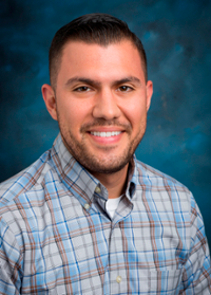 The Department of Sociology congratulates Roberto Cancio ,Ph.D., C.P.E. on the successful completion of his Post-Doctoral fellowship at Loyola Marymount University and recognize his outstanding accomplishments. He has published 9 articles and received several grants. He is currently Assistant Professor of Sociology at Loyola Marymount University Los Angeles, CA, US Recently, he provided the following summary of his career since graduating from the University of Miami.
The Department of Sociology congratulates Roberto Cancio ,Ph.D., C.P.E. on the successful completion of his Post-Doctoral fellowship at Loyola Marymount University and recognize his outstanding accomplishments. He has published 9 articles and received several grants. He is currently Assistant Professor of Sociology at Loyola Marymount University Los Angeles, CA, US Recently, he provided the following summary of his career since graduating from the University of Miami.
Since graduate school, I completed my Post Doctoral Fellowship (2017-2019) in Clinical Psychology with The Psychology Applied Research Center (PARC) at Loyola Marymount University (LMU), under the direction of Dr. Cheryl Grills. As a Postdoc, I was involved in multiple projects focused on issues surrounding public health and mental health disparities, community organizing, and civic engagement. I was the lead and project manager on a Center for Disease Control and Prevention’s Racial and Ethnic Approaches to Community Health grant that used an integrative mixed-methods multi-year approach to evaluate its program implementation processes and effectiveness. Presently, I am a Senior Research Associate at PARC.
Currently, I am an Assistant Professor of Sociology (2019-present) at LMU, and I am the Head of the Veteran and Military Family Research Laboratory (2019- present), a grant-funded lab that has secured over $15,000 in internal grants and fellowships and focuses on the intersection between the social and behavioral pathways underpinning resilience and susceptibility to adverse health conditions that disproportionately affect priority military populations and communities of color. Our work was recently highlighted in a webinar, funded by the Substance Abuse and Mental Health Services Administration, for the Mental Health Technology Transfer Center at the Universidad Central del Caribe (Follow link => https://youtu.be/rkhh1QZFfuk). In addition, I am the Principle Investigator for the Tobacco Research Team, also at LMU, that collaborates with a variety of community-based organizations to inform social change through applied community-based, geographic, and health-related research. Recently I was awarded $853,800 for three years from The University of California, Office of the President, Tobacco-Related Disease Research Program, for a project titled Youth Vaping in Los Angeles: Youth’s Perceptions, Behaviors, and Outlet Density. This mixed-methods study integrates quantitative spatial data and qualitative interviews from adolescents to create geo-narratives. Geo-narratives are an integration of geographic data and narrative materials in GIS and provide a geographic context that facilitates interpretation and understanding of the lived experiences of adolescents with the various suppliers of vaping products.
July, 2020
 The Department of Sociology congratulates Anastasiia Timmer on receiving a 2020 Outstanding Graduate Student Award. Since coming to UM in 2015, Anastasiia has distinguished herself in many ways. She has a unique interdisciplinary research agenda, which combines insights from several disciplines including criminology, criminal justice, social psychology, medical sociology, and comparative cross-national research. Anastasiia’s publishing record speaks for itself. She already has five manuscripts published in peer-reviewed journals, which include top-tier and reputable sociological, criminological, and public health outlets. Anastasiia has also been a recipient of various awards including the National Science Foundation Dissertation Improvement Grant, the University of Miami Dissertation Completion Fellowship, and the College of Arts & Sciences Dean’s Summer Research Fellowship. In addition, Anastasiia is a very talented teacher, who is able to use her pedagogical skills to stimulate students’ interest in examining social problems and doing social research. Finally, Anastasiia not only conducts social research that is extremely important but she is also able to convert her passion for this research into the projects that have a significant impact on vulnerable populations studied by her. For example, during her fieldwork in Ukraine studying the consequences of war in the East of Ukraine for vulnerable groups such as soldiers, Anastasiia organized a fundraiser, which enabled her to purchase the needed equipment to better protect people in a war-zone. Anastasiia has recently defended her dissertation focusing on a timely problem of youth violence and crime and will assume the position of Assistant Professor in the Criminology and Justice Studies Department at California State University, Northridge, in August 2020. Because of these and other achievements, we are delighted to name Anastasiia Timmer as a 2020 Outstanding Graduate Student Award co-recipient and want to wish her all the best in her future career.
The Department of Sociology congratulates Anastasiia Timmer on receiving a 2020 Outstanding Graduate Student Award. Since coming to UM in 2015, Anastasiia has distinguished herself in many ways. She has a unique interdisciplinary research agenda, which combines insights from several disciplines including criminology, criminal justice, social psychology, medical sociology, and comparative cross-national research. Anastasiia’s publishing record speaks for itself. She already has five manuscripts published in peer-reviewed journals, which include top-tier and reputable sociological, criminological, and public health outlets. Anastasiia has also been a recipient of various awards including the National Science Foundation Dissertation Improvement Grant, the University of Miami Dissertation Completion Fellowship, and the College of Arts & Sciences Dean’s Summer Research Fellowship. In addition, Anastasiia is a very talented teacher, who is able to use her pedagogical skills to stimulate students’ interest in examining social problems and doing social research. Finally, Anastasiia not only conducts social research that is extremely important but she is also able to convert her passion for this research into the projects that have a significant impact on vulnerable populations studied by her. For example, during her fieldwork in Ukraine studying the consequences of war in the East of Ukraine for vulnerable groups such as soldiers, Anastasiia organized a fundraiser, which enabled her to purchase the needed equipment to better protect people in a war-zone. Anastasiia has recently defended her dissertation focusing on a timely problem of youth violence and crime and will assume the position of Assistant Professor in the Criminology and Justice Studies Department at California State University, Northridge, in August 2020. Because of these and other achievements, we are delighted to name Anastasiia Timmer as a 2020 Outstanding Graduate Student Award co-recipient and want to wish her all the best in her future career.
May 2020
 The Department of Sociology is delighted to announce Brandon Martínez has earned a 2020 Outstanding Graduate Student Award for his success in and contribution to the graduate program. Brandon joined UM in 2016 and excelled in numerous ways. Brandon served as a research assistant on numerous projects, published three articles, published one book chapter, submitted additional article manuscripts for publication consideration, helped lead the graduate student writing group, acted as the managing editor of Social Currents, and mentored diverse undergraduate students. Given increasing levels of stratification in the post-recession era, and considering changing immigration trends, Brandon’s research on the immigration-stratification nexus significantly contributes to the field. With Brandon’s help as a managing editor, Social Currents has also thrived. Brandon’s editorial efforts have been critical to making sure that Social Currents runs smoothly, positively shaping the progress and direction of the journal. For these reasons and many more, we are thrilled to name Brandon Martínez as a 2020 Outstanding Graduate Student Award co-recipient. Every achievement indicates a bright and promising future for Brandon, so we are delighted to honor him with this award.
The Department of Sociology is delighted to announce Brandon Martínez has earned a 2020 Outstanding Graduate Student Award for his success in and contribution to the graduate program. Brandon joined UM in 2016 and excelled in numerous ways. Brandon served as a research assistant on numerous projects, published three articles, published one book chapter, submitted additional article manuscripts for publication consideration, helped lead the graduate student writing group, acted as the managing editor of Social Currents, and mentored diverse undergraduate students. Given increasing levels of stratification in the post-recession era, and considering changing immigration trends, Brandon’s research on the immigration-stratification nexus significantly contributes to the field. With Brandon’s help as a managing editor, Social Currents has also thrived. Brandon’s editorial efforts have been critical to making sure that Social Currents runs smoothly, positively shaping the progress and direction of the journal. For these reasons and many more, we are thrilled to name Brandon Martínez as a 2020 Outstanding Graduate Student Award co-recipient. Every achievement indicates a bright and promising future for Brandon, so we are delighted to honor him with this award.
May 2020
 The Board of Trustees of the University of Miami recently voted to promote Dr. Olena Antonaccio to the rank of Full Professor in the Department of Sociology. Professor Antonaccio joined the department after receiving her Ph.D. at North Carolina State University in 2008. She was tenured and promoted to the rank of Associate Professor in 2014. Dr. Antonaccio is a Director of MS & Certificate Programs in Criminology and Criminal Justice. Her areas of scholarly interest and research include crime and deviance, sociological theory, survey research, and cross-national research. Dr. Antonaccio’s work has appeared in top-tier sociological and criminological journals including Criminology, Justice Quarterly, Journal of Research in Crime and Delinquency, Journal of Quantitative Criminology, and Social Forces. The members of the department ask you to join us in congratulating Dr. Antonaccio on this career achievement.
The Board of Trustees of the University of Miami recently voted to promote Dr. Olena Antonaccio to the rank of Full Professor in the Department of Sociology. Professor Antonaccio joined the department after receiving her Ph.D. at North Carolina State University in 2008. She was tenured and promoted to the rank of Associate Professor in 2014. Dr. Antonaccio is a Director of MS & Certificate Programs in Criminology and Criminal Justice. Her areas of scholarly interest and research include crime and deviance, sociological theory, survey research, and cross-national research. Dr. Antonaccio’s work has appeared in top-tier sociological and criminological journals including Criminology, Justice Quarterly, Journal of Research in Crime and Delinquency, Journal of Quantitative Criminology, and Social Forces. The members of the department ask you to join us in congratulating Dr. Antonaccio on this career achievement.
April 2020
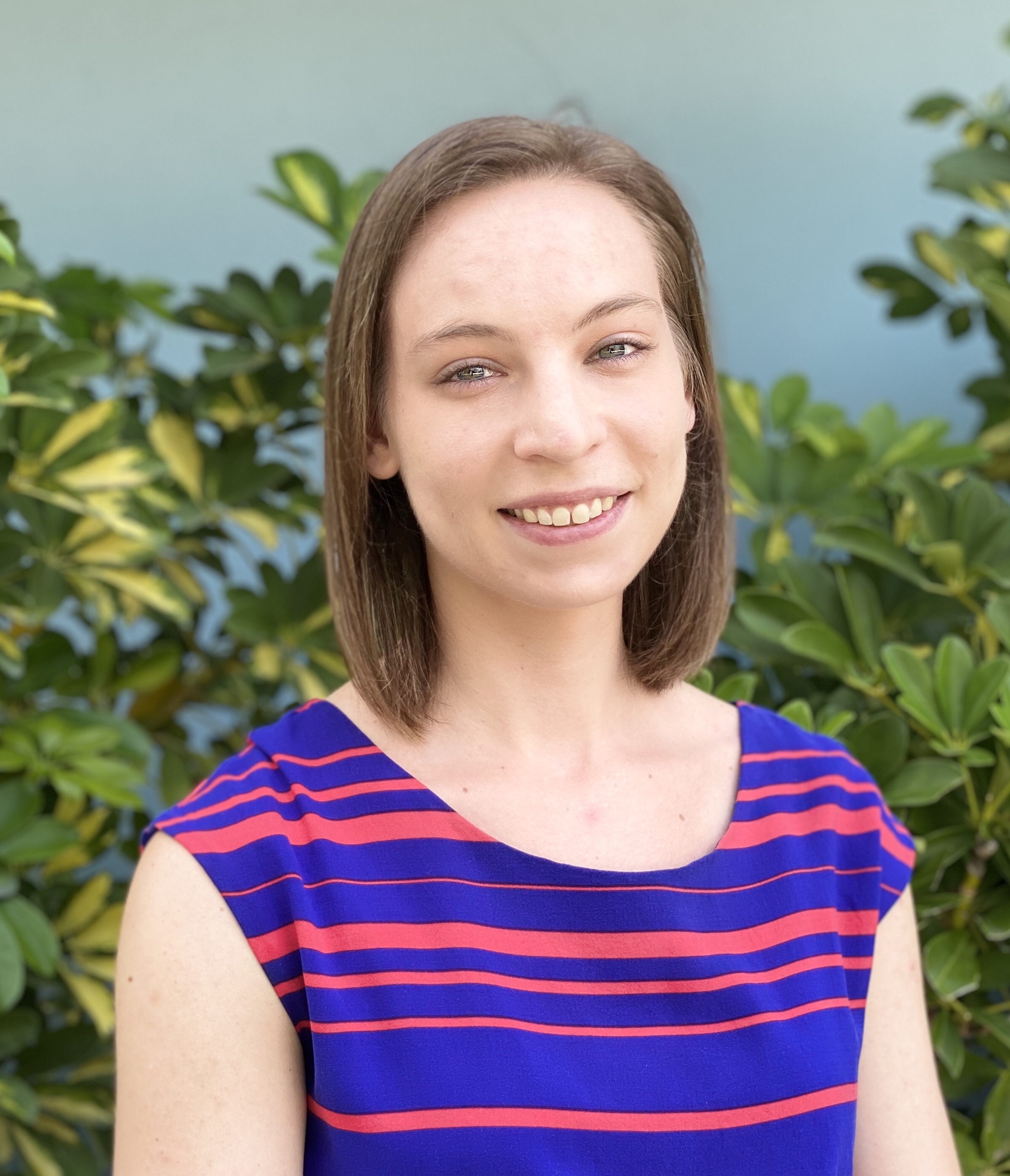 The Department of Sociology congratulates Dr. Rachel Lautenschlager for successfully defending her dissertation and completing her Ph.D. in Sociology at the University of Miami.
The Department of Sociology congratulates Dr. Rachel Lautenschlager for successfully defending her dissertation and completing her Ph.D. in Sociology at the University of Miami.
While At UM, Dr. Lautenschlager’s areas of concentration were criminology and race, ethnicity, and immigration. Her research explored how law enforcement and other components of the criminal justice system vary across neighborhoods, and the ways that this results in differential outcomes across racial and ethnic groups. Dr. Lautenschlager’s dissertation, titled “Surveillance Hot Spots: The Geography of Stop and Frisk in Nine U.S. Cities,” examines which social processes generate geographic variation in stop and frisk, identifies characteristics of “surveillance hot spots,” and investigates whether the law is implemented differently across neighborhoods. Her dissertation committee included Dr. Nick Petersen, Dr. Marisa Omori, Dr. Roger Dunham, and Dr. Osamudia James.
Congratulations Dr. Lautenschlager on this notable achievement!
Click here to read the abstract of Dr. Lautenschlager's dissertation.
April 2020
 The Department of Sociology would like to extend a since congratulations to Dr. Anastasiia Timmer for successfully defending her dissertation and completing her Ph.D. in Sociology at the University of Miami.
The Department of Sociology would like to extend a since congratulations to Dr. Anastasiia Timmer for successfully defending her dissertation and completing her Ph.D. in Sociology at the University of Miami.
While at UM, Dr. Timmer’s area of concentration was criminology, and her research met at the intersection of criminology, medical sociology, and social psychology. Dr. Timmer’s dissertation, titled “Cool or Hot Decisions? A Multi-Level Analysis of Youth Crime in the United States,” addresses the problem of adolescent crime in contemporary society on various levels. Her dissertation committee included Dr. Olena Antonaccio, Dr. Roger Dunham, Dr. Alejandro Portes, and Dr. Brian E. McCabe.
Click here to read the abstract of Dr. Timmer's dissertation.
April 2020
 Congratulations to Anastasiia Timmer for receiving the National Science Foundation Dissertation Improvement Grant!
Congratulations to Anastasiia Timmer for receiving the National Science Foundation Dissertation Improvement Grant!
Dissertation grants awarded by the NSF program in Sociology support high-quality doctoral dissertation research that is conducted in a scientifically sound manner and offers strong potential for enhancing scientific knowledge.
March 2020
 Congratulations to Shameka Poetry Thomas on her acceptance into the Yale Science Academy Fellowship Program, Cohort 2020. Shameka is among the Top 40 Ph.D. candidates accepted into the Yale's Science Puerto Rico Program--through Yale University and National Institutes of Health (NIH). As a YCA fellow, Shameka will receive advanced research training and mentorship as an early-career health scientist and research investigator. Additionally, after her dissertation defense, Shameka will be conducting fieldwork for 13 weeks in Bogota, Colombia (beginning Summer 2020), serving as the team-lead on a maternal health research project in Bogota and the Choco Pacific Region via University de Los Andes (funded through NIH-Minorities International Health Training Program grant).
Congratulations to Shameka Poetry Thomas on her acceptance into the Yale Science Academy Fellowship Program, Cohort 2020. Shameka is among the Top 40 Ph.D. candidates accepted into the Yale's Science Puerto Rico Program--through Yale University and National Institutes of Health (NIH). As a YCA fellow, Shameka will receive advanced research training and mentorship as an early-career health scientist and research investigator. Additionally, after her dissertation defense, Shameka will be conducting fieldwork for 13 weeks in Bogota, Colombia (beginning Summer 2020), serving as the team-lead on a maternal health research project in Bogota and the Choco Pacific Region via University de Los Andes (funded through NIH-Minorities International Health Training Program grant).
January 2020
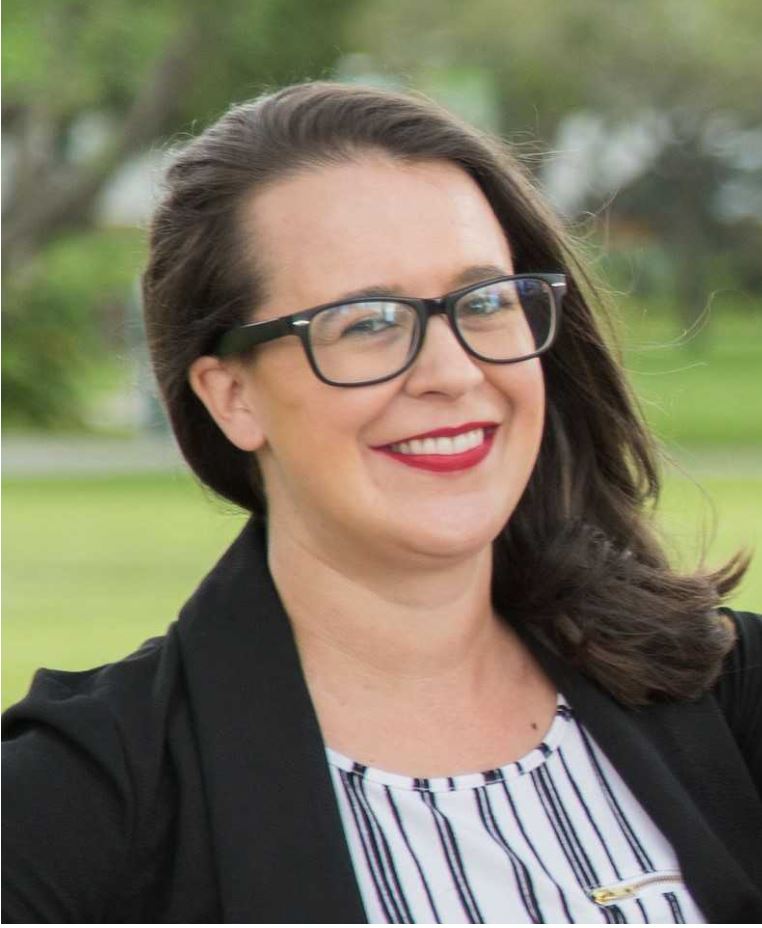 Congratulations to Laura Iesue for receiving the Division of International Crime, Global Research Fellowship at the ASC conference!
Congratulations to Laura Iesue for receiving the Division of International Crime, Global Research Fellowship at the ASC conference!
This award is being used to complete a study that focuses on extensive, in-depth discourse analyses of statements of politicians, policy papers and legal documents within Guatemala and the United States from 1996 to the present. It also pulls from journals or ‘knowledge producers’ to answer how the period since the signing of the Peace Accords in Guatemala affected government discourse, perceptions and treatment of criminals? While current research analyzes either local crime policies, or separate, political or international studies approaches to crime, Laura’s work situates within a more globalized context to shed light onto how Guatemala crime control politics is impacted by their relationship with the United States. Further, it shows how the relationships between the Global North and the Global South continue to evolve through the implementation of security programs interested in establishing Rule of Law and economic development.
December 2019
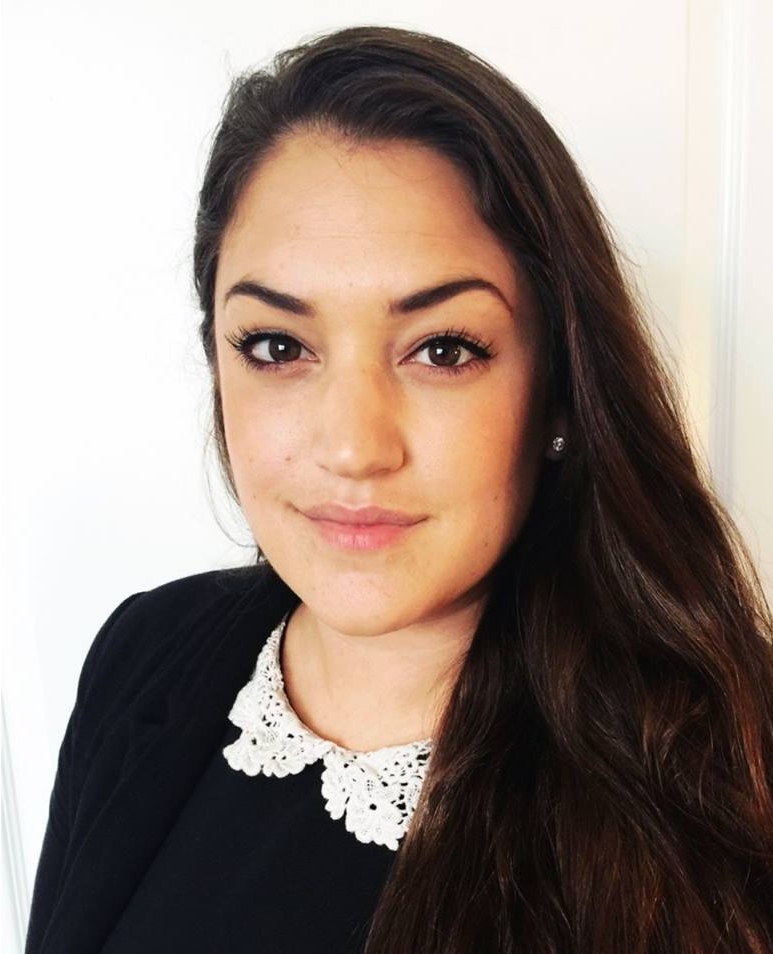 Brittany Harder, Ph.D. received the Award for Best Publication from Sociological Spectrum this year. Her article, co-authored with J.E. Sumerau, is titled “Understanding Gender as a Fundamental Cause of Health: Simultaneous Linear Relationships between Gender, Mental Health, and Physical Health Over Time.” Sociological Spectrum, 2018, 38 (6): 387-405. The award was announced at the annual banquet of the 45th Mid-South Sociological Association conference in Jackson MS.
Brittany Harder, Ph.D. received the Award for Best Publication from Sociological Spectrum this year. Her article, co-authored with J.E. Sumerau, is titled “Understanding Gender as a Fundamental Cause of Health: Simultaneous Linear Relationships between Gender, Mental Health, and Physical Health Over Time.” Sociological Spectrum, 2018, 38 (6): 387-405. The award was announced at the annual banquet of the 45th Mid-South Sociological Association conference in Jackson MS.
Brittany graduated from the University of Miami in 2017 with a Ph.D. in Sociology and specializes in the areas of medical sociology, race, ethnicity and immigration and quantitative and qualitative methods. She currently holds an appointment as Assistant Professor, Sociology at The University of Tampa. She is also the Internship/Practice Coordinator for the Program in Applied Sociology at Tampa.
October 2019
 Congratulations to Anastasiia Kuptsevych for receiving the Graduate School’s Dissertation Fellowship from the University of Miami for the 2018-2019 academic year.
Congratulations to Anastasiia Kuptsevych for receiving the Graduate School’s Dissertation Fellowship from the University of Miami for the 2018-2019 academic year.
This fellowship is awarded annually to one recipient in the final year of writing and defending the dissertation, without the obligation of a teaching, research, or graduate assignment. Nominees must be Ph.D./Ed.D./D.M.A. students who have been admitted to candidacy.
October 2019
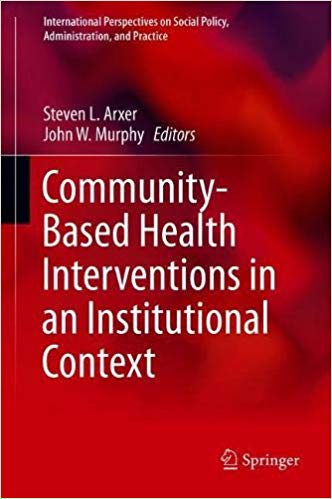 Congratulations to Dr. John Murphy on his recently published book titled “Community-Based Health Interventions in an Institutional Context.”
Congratulations to Dr. John Murphy on his recently published book titled “Community-Based Health Interventions in an Institutional Context.”
This work examines the challenges of “institutionalizing” community-based health care, raising questions about how the community-based model can be scaled up through institutions and how “institutionalization” can be rethought from a bottom-up approach. It provides not only an overview of community based organizations, but also delves into practical topics such as establishing budgets, training workers, incorporating technology, as well as more theoretical topics like goal-setting, policy effects, and relationships between patient and community.
This book will be of interest for researchers interested in exploring the community-based health care model, as well as practitioners in health care and health policy.
October 2019
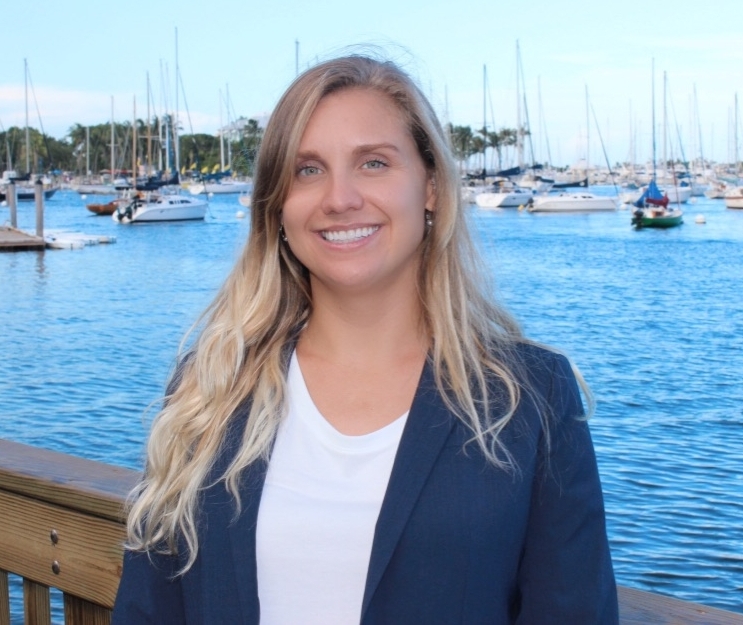
Congratulations to Kaitlin Pericak for receiving the NCAA Graduate Student Research Grant.
Over the course of the next year, Kaitlin will be creating a survey to examine the relationship between injury among Division I collegiate athletes and their socio-emotional responses (i.e., perceived stress, anxiety, and depression). Furthermore, this study will examine whether social support services in the form of athletic trainers, sport nutritionists, physical therapists, sport psychologists, team physicians, and other sports medicine staff mediate these socio-emotional responses.
Research Grants Awarded to 5 Graduate students
Abstracts of 2019 Graduate Student Research Grant Winners
September 2019

The Department of Sociology would like to extend a sincere welcome to our new graduate student!
Christopher Brown, originally from Wisconsin, holds a B.A. in Democracy and Justice Studies from the University of Wisconsin- Green Bay and an M.A. in Applied Society from Northern Arizona University. His primary concentration is on constructions of, and reactions to, deviance. In particular, he focuses on deviant speech, with an emphasis on the conflict between free speech and hate speech in liberal democracies.
Christopher, we are excited to have you join our department and look forward to witnessing your future accomplishments!
August 2019
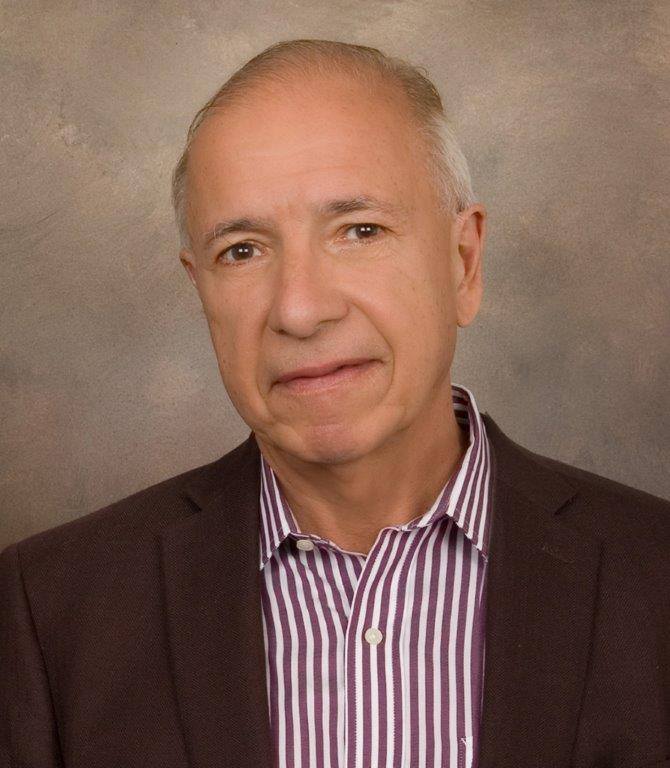 Congratulations to UM Sociology faculty member Dr. Alejandro Portes for receiving the 2019 Princess of Asturias Award in the Social Sciences for his significant contributions to the study of international migration. The Spanish Crown considers these awards, which aim to “promote scientific, cultural, and humanistic values that form part of humankind’s universal heritage,” the highest form of recognition.
Congratulations to UM Sociology faculty member Dr. Alejandro Portes for receiving the 2019 Princess of Asturias Award in the Social Sciences for his significant contributions to the study of international migration. The Spanish Crown considers these awards, which aim to “promote scientific, cultural, and humanistic values that form part of humankind’s universal heritage,” the highest form of recognition.
While a professor at the University of Texas during the 1970s, Dr. Portes began his research on the adaptation of immigrants in their destination countries. Over the course of six years, he interviewed 1,500 Cubans who immigrated to Miami. His research showed that entrepreneurial Cuban immigrants had created a successful community independent from the rest of the city, which he termed an “ethnic enclave.” In 1992 at John Hopkins University, Dr. Portes began the “Children of Immigrants Longitudinal Study,” in which his department interviewed more than 5,000 children. The study concluded that the second generation overall positively integrated into American society, but it also revealed that children of illegal immigrants with low level of schooling experienced difficulties adapting. In 2001, he published this study in Legacies: The Story of Immigrant Second Generation, which received several American Association of Sociology awards. Dr. Portes has contributed around 250 articles and authored over 30 books in the fields of international migration, economic sociology, comparative development, the urbanization of developing countries, and social marginality. “His work over the last four decades has helped divulge and understand the adaptation of immigrants in their destination countries,” said jurors for the award as they remarked on Dr. Portes’ accomplishments.
Dr. Portes stated that he feels greatly honored “to receive this award from a country where immigrants and their children have generally been able to become integrated and progress and whose policies in this regard could serve as an example to other countries that receive migrants.”
In October, King Felipe VI of Spain and Princess Leonor will present this prestigious award to Dr. Portes at the Campoamor Theatre in Oviedo, the capital of Principality of Asturias.
For more information on this award and Dr. Portes' accomplishments, click here
July 2019
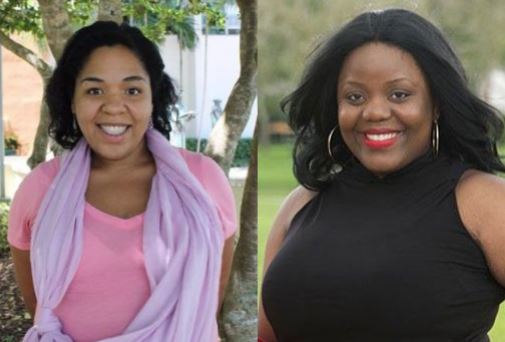 The AELS Scholarship Award was created by the UM Graduate Student Association to award monetary support to a select group of outstanding graduate students for excelling in three areas: scholarship, leadership, and service. Congratulations to Felicia Casanova and Kapriskie Seide for ranking among the top applicants this year! They are both 2019 - 2020 AELS awardees.
The AELS Scholarship Award was created by the UM Graduate Student Association to award monetary support to a select group of outstanding graduate students for excelling in three areas: scholarship, leadership, and service. Congratulations to Felicia Casanova and Kapriskie Seide for ranking among the top applicants this year! They are both 2019 - 2020 AELS awardees.
May 2019
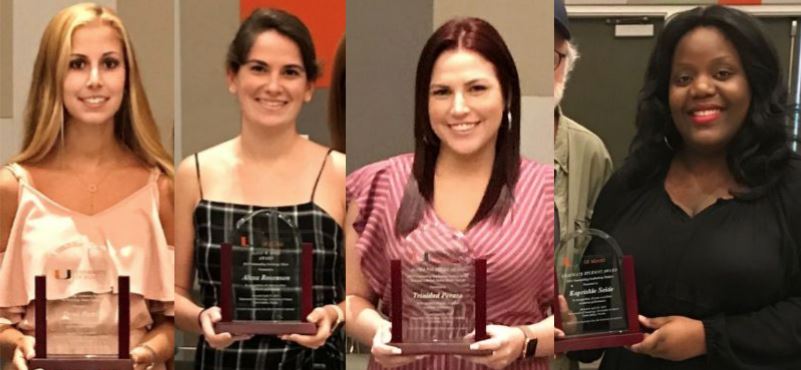
Congratulations to all the recipients of the 2019 departmental undergraduate and graduate awards!
Outstanding Graduating Member of Alpha Kappa Delta Sociology: Demi Pietri
Alvin W. Rose Award for Outstanding Sociology Major: Alexa Rosenson
Bryce Finley Ryan Award for Academic Excellence in Criminology: Connor Fleischacker
Outstanding Graduating ember of Alpha Phi Sigma Criminology: Trinidad Pereza
Outstanding Graduate Student in Sociology: Kapriskie Seide
(Photographed from left to right: Demi Pietri, Alexa Rosenson, Trinidad Pereza, Kapriskie Seide)
April 2019
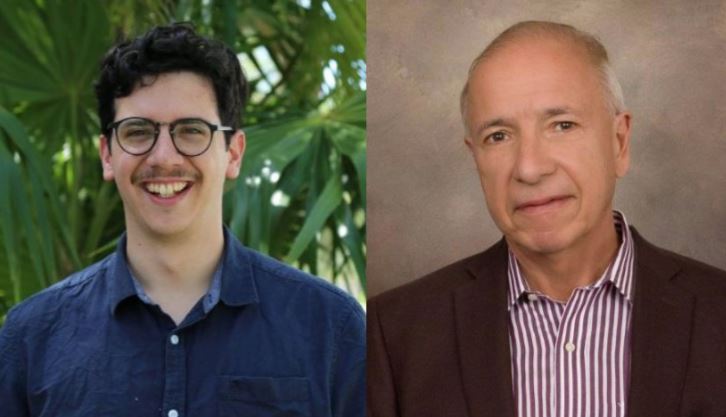
Congratulations to Dr. Alejandro Portes and Brandon P. Martinez on their publication in the Journal of Ethnic and Migration Studies, entitled “They are not all the same: immigrant enterprises, transnationalism, and development.” Below is the abstract of their publication and the link to the full article:
The literature on immigrant entrepreneurship in the advanced countries tends to paint these initiatives in homogeneous colors. A debate lingers as well on the economic returns to self-employment by immigrant and ethnic groups. We present recent data demonstrating again the significant payoff to autonomous enterprise among all ethnic groups, but also the major differences in such returns among them. This provides the basis for a typology of immigrant enterprises and an analysis of their causes and potential effects for the development of sending nations. Human capital, social capital, and modes of incorporation are the principal determinants of types of immigrant enterprises in host nations. The stance of home country states determines the development potential of high-tech immigrant enterprises. Data and examples supporting these conclusions are presented and their theoretical and practical implications discussed.
Click
here for link to full article.
April 2019

Congratulations to Laura Iesue for being awarded the 2019 Dean’s Summer Research Fellowship from the College of Arts and Sciences and a Tinker Foundation Field Research Grant from the Institute for the Advanced Study of Americas. Over the summer, Laura will be starting fieldwork in Guatemala to understand how security and development aid policies, which are involved with criminal justice and greater rule of law reforms, are impacting migration.
April 2019
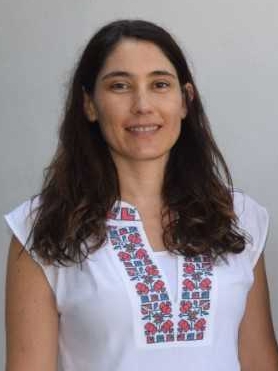 The University of Miami’s Institute for Advanced Studies of the Americas awards research grants to doctoral students developing innovative research projects on topics relating to any aspect of Latin America and the Caribbean. Congratulations to Maria del Rosario Concha Mendez for receiving a Tinker Field Research Grant from the University of Miami’s Institute for Advanced Studies of the Americas! The project awarded the grant is titled “Women in Abortion Cases in Chile (1874-1950).”
The University of Miami’s Institute for Advanced Studies of the Americas awards research grants to doctoral students developing innovative research projects on topics relating to any aspect of Latin America and the Caribbean. Congratulations to Maria del Rosario Concha Mendez for receiving a Tinker Field Research Grant from the University of Miami’s Institute for Advanced Studies of the Americas! The project awarded the grant is titled “Women in Abortion Cases in Chile (1874-1950).”
April 2019
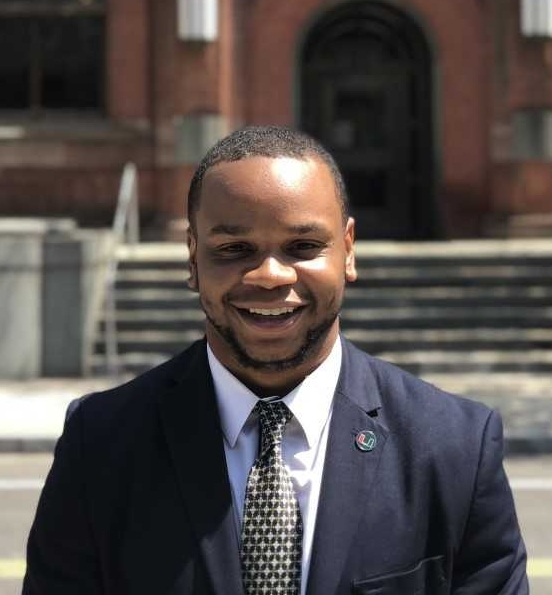 Oshea Johnson, M.A. will be interning at the Centers for Disease Control and Prevention in the Department of Violence Prevention, Surveillance Branch, due to a recently awarded James A. Ferguson Emerging Infectious Diseases RISE Fellowship.
Oshea Johnson, M.A. will be interning at the Centers for Disease Control and Prevention in the Department of Violence Prevention, Surveillance Branch, due to a recently awarded James A. Ferguson Emerging Infectious Diseases RISE Fellowship.
The overall goal of the RISE fellowship is to promote diversity among future public health research leaders. Oshea will be conducting research with scientists and epidemiologists at the CDC this upcoming summer.
April 2019
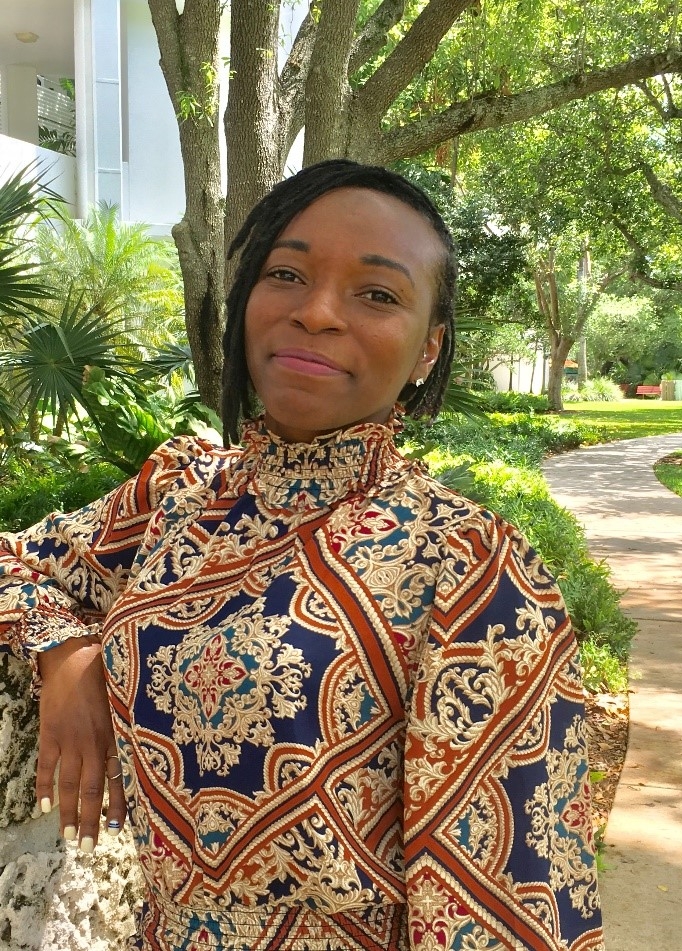
Shameka Poetry Thomas, M.A. is a Ph.D. Candidate in the Department of Sociology who recently won the Most Innovative Teaching Award for Graduate-Student Faculty from University of Miami’s College of Arts & Sciences.
Shameka is the first graduate student to receive this award in the Sociology Department, sponsored by the Teaching and Learning Innovation in STEAM competition hosted through the College of Engineering. This award is a push forward to honor and recognize the teaching skills of advanced graduate students and their excellent progress made toward becoming future faculty.
Moreover, we want to celebrate Shameka who was also recently accepted into the Bouchet Graduate Honor Society and will be officially inducted this April 2019 at Yale University.
March 2019
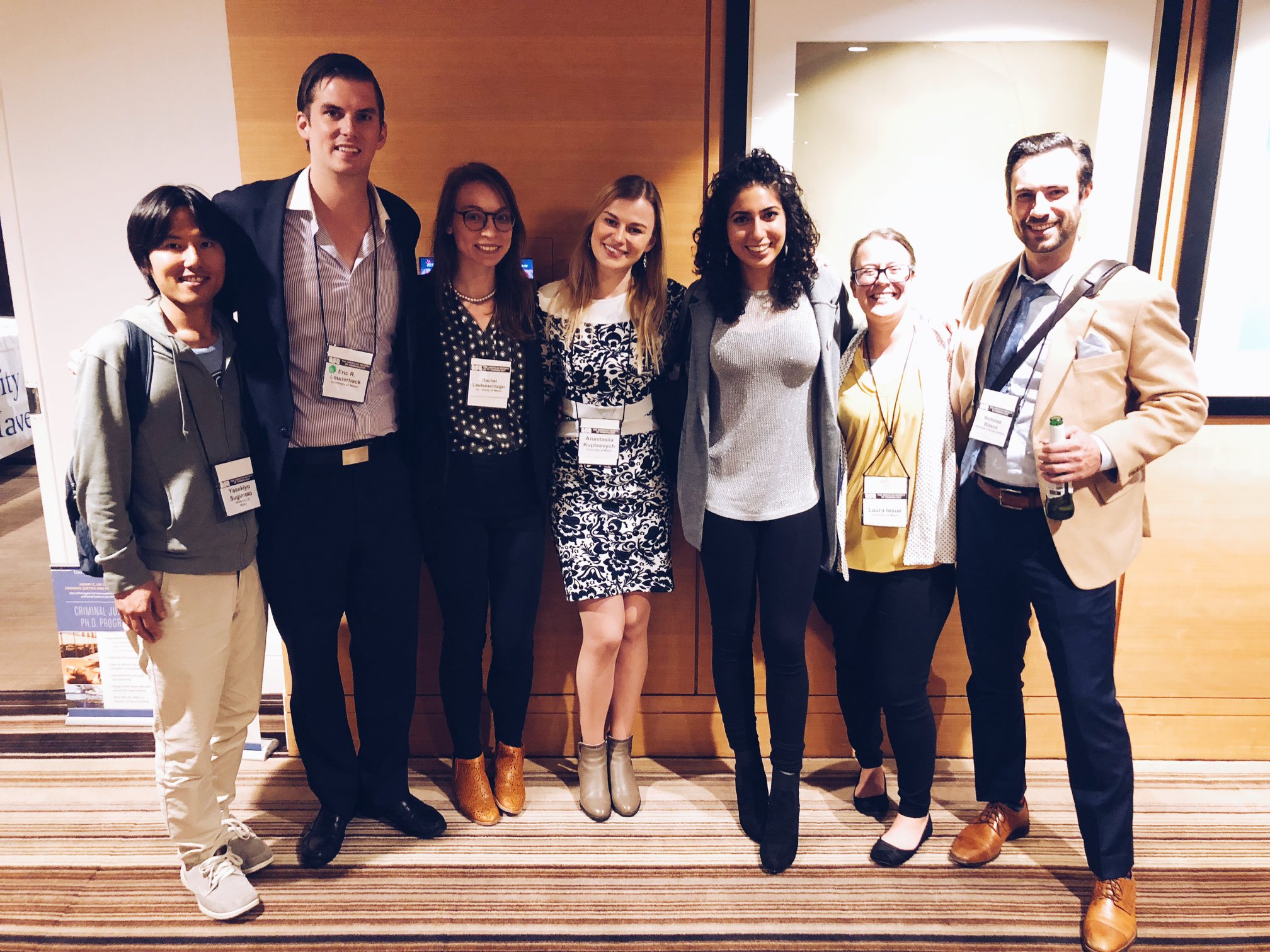 Congratulations to the following individuals for presenting at the American Society of Criminology conference, which took place in November in Atlanta, Georgia. Listed below are some of the presenters and the titles of their works:
Congratulations to the following individuals for presenting at the American Society of Criminology conference, which took place in November in Atlanta, Georgia. Listed below are some of the presenters and the titles of their works:
Dr. Amie Nielsen & Oshea Johnson- Americans’ Gun Ownership and Attitudes toward Gun Control: The Roles of Racial and Ethnic Stereotypes and Government-Related Attitudes
Dr. Olena Antonaccio & Dr. Eric Louderback- New Applications of Self-Control Theory to Computer-Focused Cyber Deviance: A Comparison of Cognitive and Behavioral Measures of Self-Control and Exploration of Contingencies
Dr. Nick Petersen & Rachel Lautenschlager- (Dis)order in the Court: Examining Neighborhood Disorder Prosecutions in Miami-Dade County
Dr. Olena Antonaccio, Dr. Michael French, & Anastasiia Kuptsevych- How Do Young People Make Their Decisions About Delinquency: Exploring the Role of Depression, Strain, and Sleep Problems
Ahzin Bahraini- Approval of Police Use Force: Examining the Importance of Race and Religion
Laura Iesue- Security Funding as Criminal Justice Policy Transfer: Decreasing Violence and Migration
December 2018
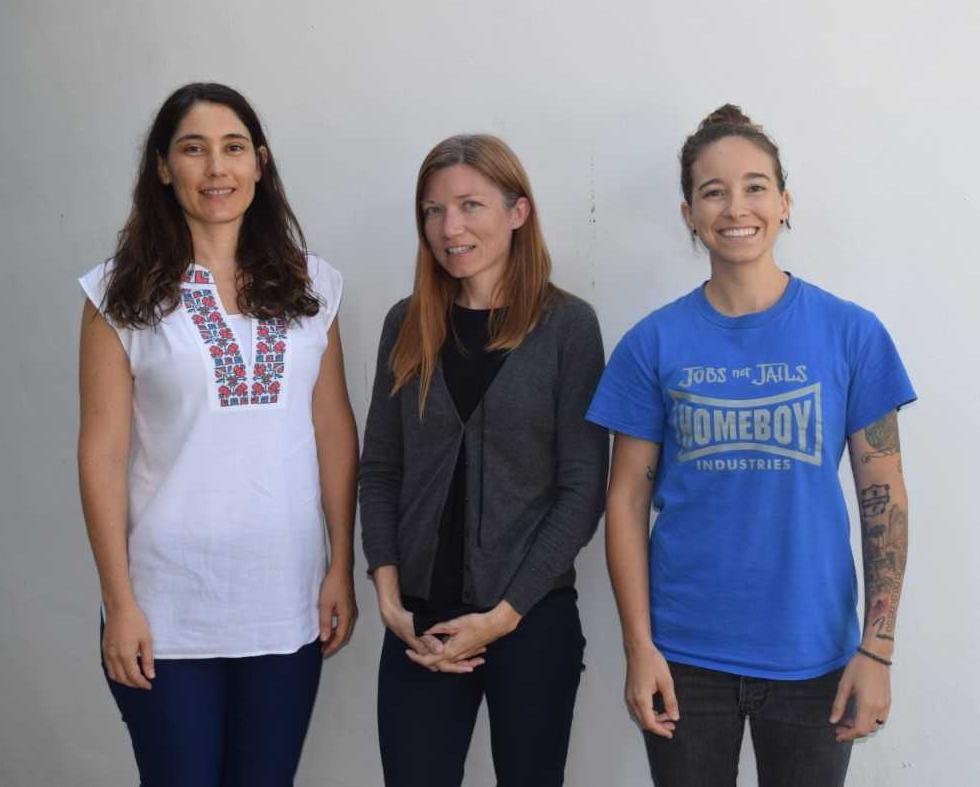
The Department of Sociology would like to extend a sincere welcome to our three new graduate students!
Maria Rosario, from Chile, holds a B.A in Psychology from Universidad Catolica de Chile, earned an M.Phil in Chilean and Latin American Literature from Universidad de Chile, and received an M.A. in Sociology at Jawaharlal Nehru University in Dehli, India. She will be concentrating in criminology. Carrie Hough is from South Florida and received her M.A. in Sociology from Florida Atlantic University. Her concentrations include medical sociology and race. Jordan Grasso, from San Diego, holds a B.A in Criminology and Justice Studies and an M.A. in Sociological Practice from California State University San Marcos. She will be concentrating in criminology and race.
We are very pleased and excited to have such talented individuals join our department!
(Individuals in photo are described from left to right)
October 2018
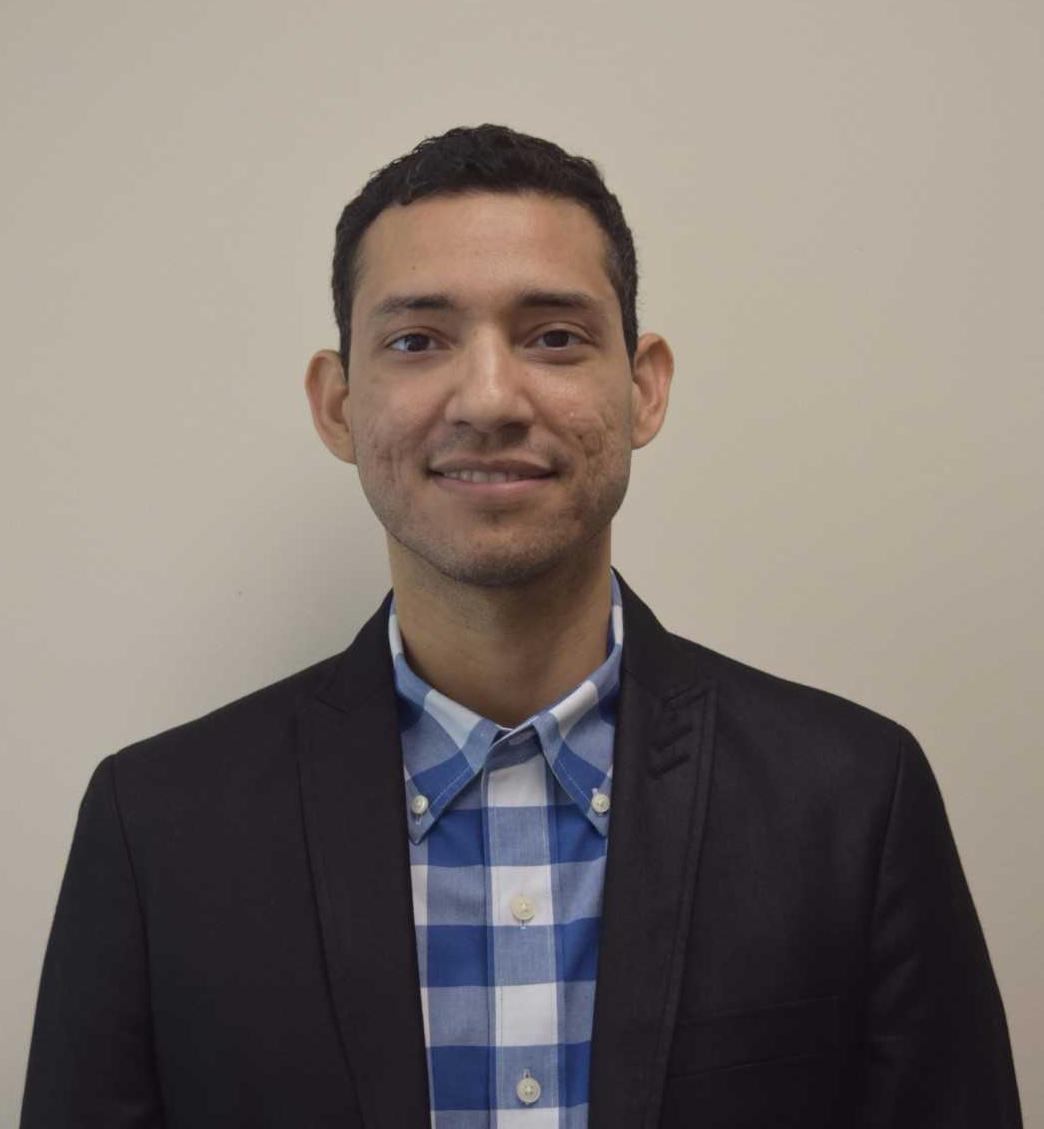 Congratulations to Dr. Yader Lanuza on his recent article with Nina Bandelj titled “Economic Expectations of Young Adults,” which was featured in the “Journal Highlights” section of the American Sociological Association newsletter.
Congratulations to Dr. Yader Lanuza on his recent article with Nina Bandelj titled “Economic Expectations of Young Adults,” which was featured in the “Journal Highlights” section of the American Sociological Association newsletter.
Abstract of article: In uncertain economic times, who are those young adults that show positive expectations about their economic future? And who are those who worry? Based on previous stratification research and extending economic sociology insights into the realm of young people’s economic expectations, we focus on the impact of family class background and a sense of current meaningful community relations on young adults’ general and job-specific economic expectations. Analysis of Panel Study of Income Dynamics (PSID) data reveals that a sense of community belonging has a robust and positive impact on economic optimism of young adults, but the role of family socioeconomic background is weaker. We conclude that imagining one’s economic future is less about realistic calculation determined by early structural conditions but more about identity work of young people who assert their moral worth in how they imagine their econ
omic lives and manage uncertainty and well-being in ongoing social relations.
Click here for link to full article.
September 2018
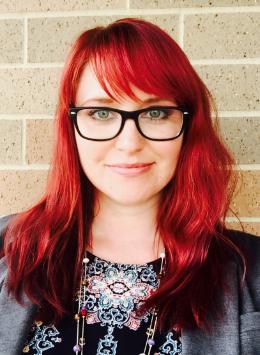 Congratulations to Dr. Kathryn Nowotny for being awarded the 2018 Junior Scholar Award from the American Sociological Association Alcohol, Drugs, & Tobacco Section for recognition of her research contributions within the scientific discipline.
Congratulations to Dr. Kathryn Nowotny for being awarded the 2018 Junior Scholar Award from the American Sociological Association Alcohol, Drugs, & Tobacco Section for recognition of her research contributions within the scientific discipline.
September 2018
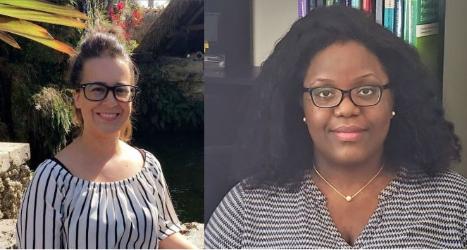 Congratulations to Kapriskie Seide and Laura Iesue for being awarded fellowships at UM’s Institute for the Advanced Study of the Americas, which awards three distinguished fellowships every year to fund doctoral students in areas of Latin American, Caribbean, Latino and Diasporic studies.
Congratulations to Kapriskie Seide and Laura Iesue for being awarded fellowships at UM’s Institute for the Advanced Study of the Americas, which awards three distinguished fellowships every year to fund doctoral students in areas of Latin American, Caribbean, Latino and Diasporic studies.
Kapriskie Seide is a third year doctoral student in UM’s sociology department. Her research focuses on how factors at micro and macro levels affect health outcomes, particularly for racial/ethnic minorities and people with disabilities in the Caribbean, Latin America and their diasporic communities. For her dissertation, she will conduct a study on the experience of living with an acquired physical disability in Haiti, focusing on survivors of the 2010 earthquake.
Laura Iesue is a second year doctoral student in UM’s sociology department. Her research focuses on immigration and crime with an emphasis on law, society, and punishment. This year, she will work on her project titled Insecurity and Migration Under the Implementation of Criminal Justice and Security Policies in the Northern Triangle, which she will present at the Latin American Studies Association in May 2019.
Photographed from left to right: Laura Iesue and Kapriskie Seide
September 2018
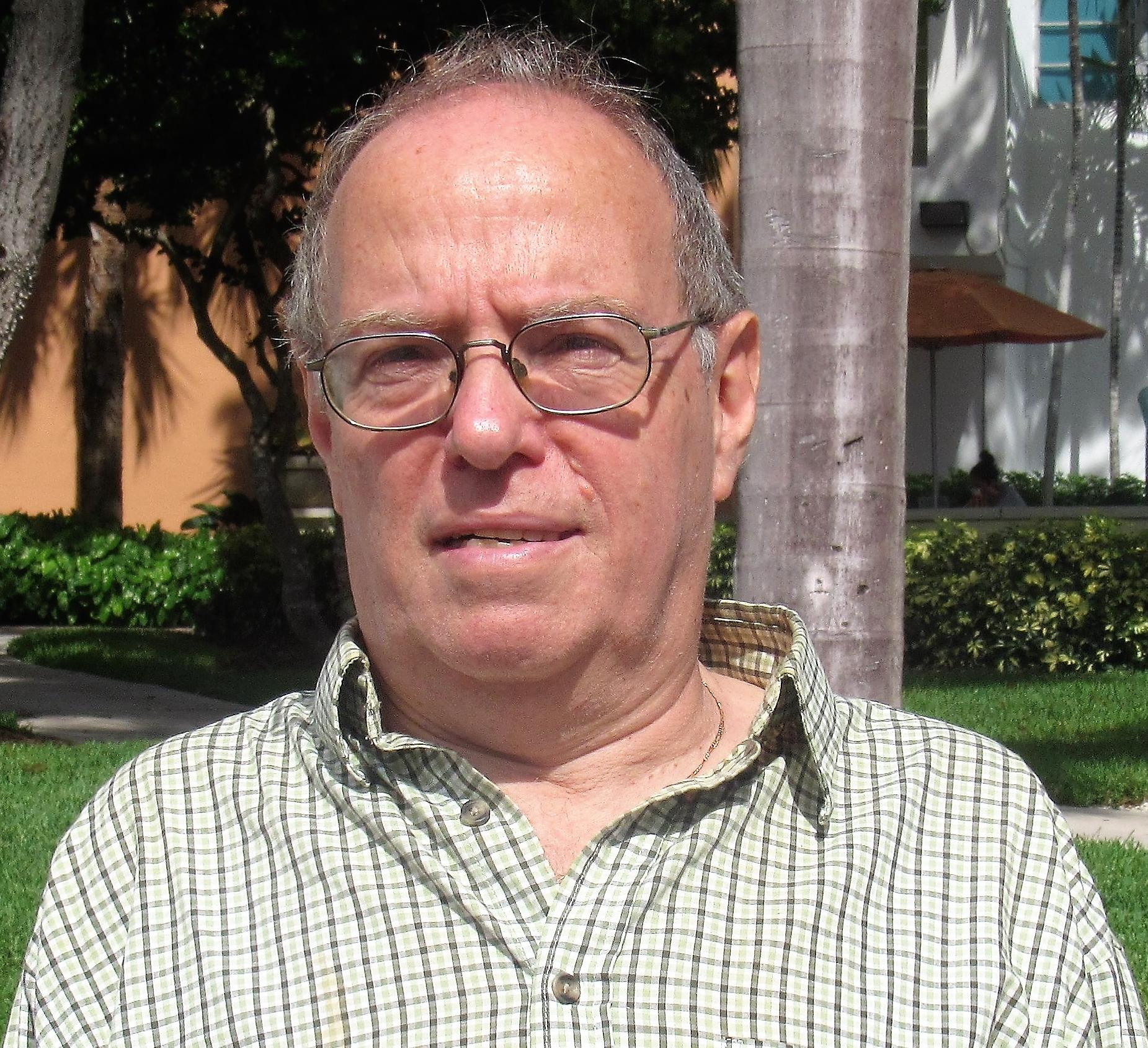 The Department of Sociology is pleased to announce that Dr. Wilson, who has been a faculty member at UM for 24 years, is the new Chair of the department! Below is a statement from Dr. Wilson on what he hopes to offer the department as Chair.
The Department of Sociology is pleased to announce that Dr. Wilson, who has been a faculty member at UM for 24 years, is the new Chair of the department! Below is a statement from Dr. Wilson on what he hopes to offer the department as Chair.
“I am pleased to be Chair and work with our terrific faculty and staff in helping to move the department forward. We have a productive and engaging faculty who do cutting-edge research, wonderful teaching and important service. I look forward to assisting in any way I can to help us to continue to "hit on all cylinders". Our graduate students are actively engaged in intellectual exploration and are remarkably productive in terms of publishing in important outlets before they have left "the U" behind. They too, are an important part of our department, which continues to receive significant national visibility in our discipline. I have no doubt this will continue in the next few years."
September 2018
 Congratulations to Dr. Yader Lanuza for receiving two honorable mentions at the American Sociological Association meeting in Philadelphia for his co-authored article, titled “An Immigrant Paradox? Contextual Attainment and Intergenerational Educational Mobility,” in the American Sociological Review. He received an honorable mention for the 2018 Distinguished Contribution to Scholarship Article Award in the ASA’s Population Section and another honorable mention for the 2018 Louis Wirth Best Article Award in the ASA’s International Migration Section.
Congratulations to Dr. Yader Lanuza for receiving two honorable mentions at the American Sociological Association meeting in Philadelphia for his co-authored article, titled “An Immigrant Paradox? Contextual Attainment and Intergenerational Educational Mobility,” in the American Sociological Review. He received an honorable mention for the 2018 Distinguished Contribution to Scholarship Article Award in the ASA’s Population Section and another honorable mention for the 2018 Louis Wirth Best Article Award in the ASA’s International Migration Section.
Feliciano, Cynthia and Yader R. Lanuza. “An Immigrant Paradox? Contextual Attainment and Intergenerational Educational Mobility.” American Sociological Review, 82(1):211-241.
August 2018
 Congratulations to UM faculty member, Dr. Michael French, on his recent publication in Human relations, one of the top business journals. The study examined the effects of tattoos on potential employees. Contrary to popular belief, the research showed that having a tattoo does not associate with discrimination in the hiring market. Tattoos have become more prevalent in society as a form of self-expression, with almost 40% of young adults having at least one tattoo. "Tattoos are so common that if you disqualify candidates because of them, you're going to be in a worse position because you're missing out on talent," said Dr. French. The study has been featured in several published stories by various media outlets, including Miami Herald, Chicago Tribune, Harvard Business Review, and Newsweek.
Congratulations to UM faculty member, Dr. Michael French, on his recent publication in Human relations, one of the top business journals. The study examined the effects of tattoos on potential employees. Contrary to popular belief, the research showed that having a tattoo does not associate with discrimination in the hiring market. Tattoos have become more prevalent in society as a form of self-expression, with almost 40% of young adults having at least one tattoo. "Tattoos are so common that if you disqualify candidates because of them, you're going to be in a worse position because you're missing out on talent," said Dr. French. The study has been featured in several published stories by various media outlets, including Miami Herald, Chicago Tribune, Harvard Business Review, and Newsweek.
Click here for link to story in Miami Herald.
August 2018
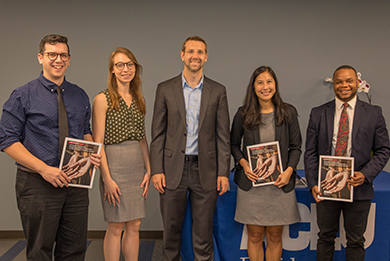 A team of University of Miami faculty and students released an unprecedented report that examined the role of race and ethnicity across multiple stages of the criminal justice system: arrest, bond and pretrial detention, charging and disposition, and sentencing. The two Assistant Professors of Sociology that led the study, Dr. Nick Petersen and Dr. Marisa Omori, and several graduate and undergraduate students traced the outcomes of about 200,000 adult arrests in Miami-Dade over a six-year period. Their findings revealed that Blacks are overrepresented in Miami-Dade’s criminal justice system relative to their share of the population, but it is especially Black Hispanics that are the most overrepresented at almost every stage of the system. The ACLU of Florida plans to use this report to promote policies aimed at reducing the racial and ethnic disparities of Miami-Dade County’s criminal justice system.
A team of University of Miami faculty and students released an unprecedented report that examined the role of race and ethnicity across multiple stages of the criminal justice system: arrest, bond and pretrial detention, charging and disposition, and sentencing. The two Assistant Professors of Sociology that led the study, Dr. Nick Petersen and Dr. Marisa Omori, and several graduate and undergraduate students traced the outcomes of about 200,000 adult arrests in Miami-Dade over a six-year period. Their findings revealed that Blacks are overrepresented in Miami-Dade’s criminal justice system relative to their share of the population, but it is especially Black Hispanics that are the most overrepresented at almost every stage of the system. The ACLU of Florida plans to use this report to promote policies aimed at reducing the racial and ethnic disparities of Miami-Dade County’s criminal justice system.
Photographed from left to right are graduate students Brandon Martinez and Rachel Lautenschlager, Assistant Professors Dr. Nick Petersen and Dr. Marisa Omori, and graduate student Oshea Johnson.
Click here for link to the report on ACLU’s website.
July 2018
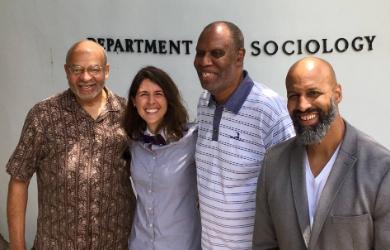 Congratulations to Mallory Morken for successfully defending her thesis, titled "America’s Pastime: Racist Nativism among non-Hispanic White Major League Baseball Fans."
Congratulations to Mallory Morken for successfully defending her thesis, titled "America’s Pastime: Racist Nativism among non-Hispanic White Major League Baseball Fans."
The thesis qualitatively explores the immigration and racial discourses employed by Major League Baseball fans through a purposive sample of twenty-four non-Hispanic whites in Miami, FL and Minneapolis, MN. Major League Baseball, popularly regarded as “America’s national pastime,” provides a strategic site of inquiry as rosters have grown more international in the previous decades, mirroring demographic shifts in the United States. Results demonstrate that while white fans support migrant players on their team, their support often rests on the players’ ability to produce wins, approximating the principle of interest convergence within critical race theory. Despite their professed tolerance for international players, supportive fans simultaneously uttered various discriminatory stereotypes of immigrants, at times holding contradictory expectations between the immigrants and migrant players. These findings complicate the notion of tolerance towards immigrants or other marginalized racial groups and underscore the potential for sport to uncover and challenge colorblind racism, as well as more overtly racist ideologies held by whites.
June 2018
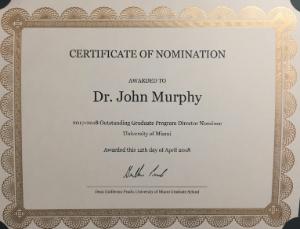 Congratulations to Dr. John Murphy for receiving a nomination for Outstanding Graduate Program Director at the University of Miami’s Graduate School Annual Awards Ceremony!
Congratulations to Dr. John Murphy for receiving a nomination for Outstanding Graduate Program Director at the University of Miami’s Graduate School Annual Awards Ceremony!
This award recognizes one Graduate Program Director that has made a significant impact on graduate education, and in support of graduate students in his/her program during the 2017-2018 academic year.
April 2018
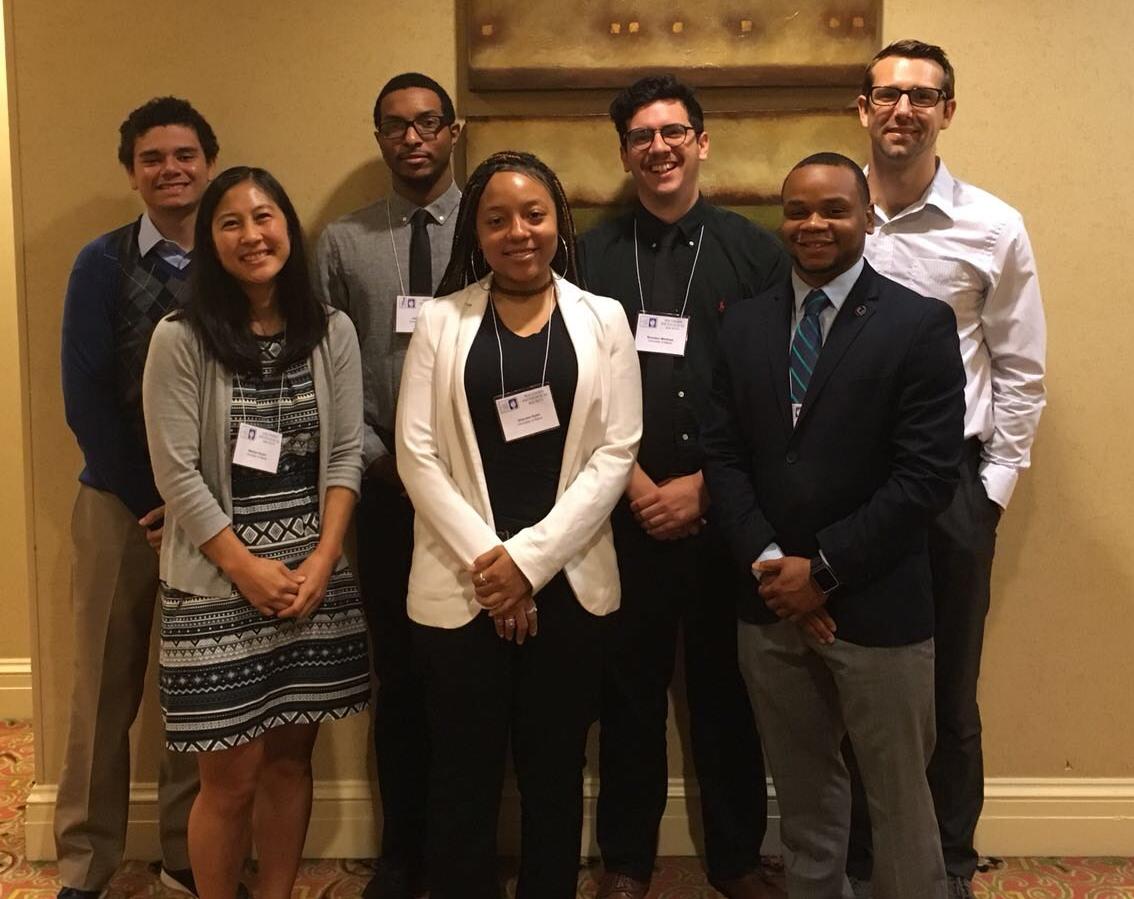 Congratulations to the following individuals for presenting at the annual meetings at the Southern Sociological Society, which took place this April in New Orleans, LA. Listed below are the presenters and the titles of their works:
Congratulations to the following individuals for presenting at the annual meetings at the Southern Sociological Society, which took place this April in New Orleans, LA. Listed below are the presenters and the titles of their works:
Dr. Marisa Omori and Dr. Nick Petersen: Institutionalizing Racism in Miami-Dade County: Criminal justice and structural mechanisms of racial inequality
Oshea Johnson: Racial and Ethnic Inequality in Charging Decisions from Arrest Rate to Disposition in Miami-Dade County’s Criminal Justice System
Brandon Martinez: Racial and Ethnic Inequality in Pretrial Detention
Julian Carter and Shanice Hyler: Give me your tired, your poor, your deplorable: An analysis on the impact of immigration on racial disparities in Florida’s sentencing rates
Michael Leyva: Examining Racial and Ethnic Disparities of Traffic Stop Rates in Miami-Dade Communities
Shameka Thomas: Low-Birth Weight and High-Risk: Is There an association between Birth Weight, Birth Sites, and Race in the United States Context?
Roberto Cancio and Ramsey Dahab: Trump's American Dream: Boundaries, Bans, and Breaking Bodies
Felicia Casanova: Accounting for Death on Routes to the U.S from Latin America and the Caribbean
Laura Iesue: Transnational Networks and Perceptions of U.S Global Militarization Across Generations: An Empricial Analysis of the Arab Assimilation Process
Akinshimaya Rashida Nnamdi: Examining the Use of Micro-Aggressions in the Media: An Application of Critical Race Theory on Trump-Era Support
Mallory Morken: America's Pastime: Racist Nativism among non-Hispanic White Major League Baseball Fans
April 2018
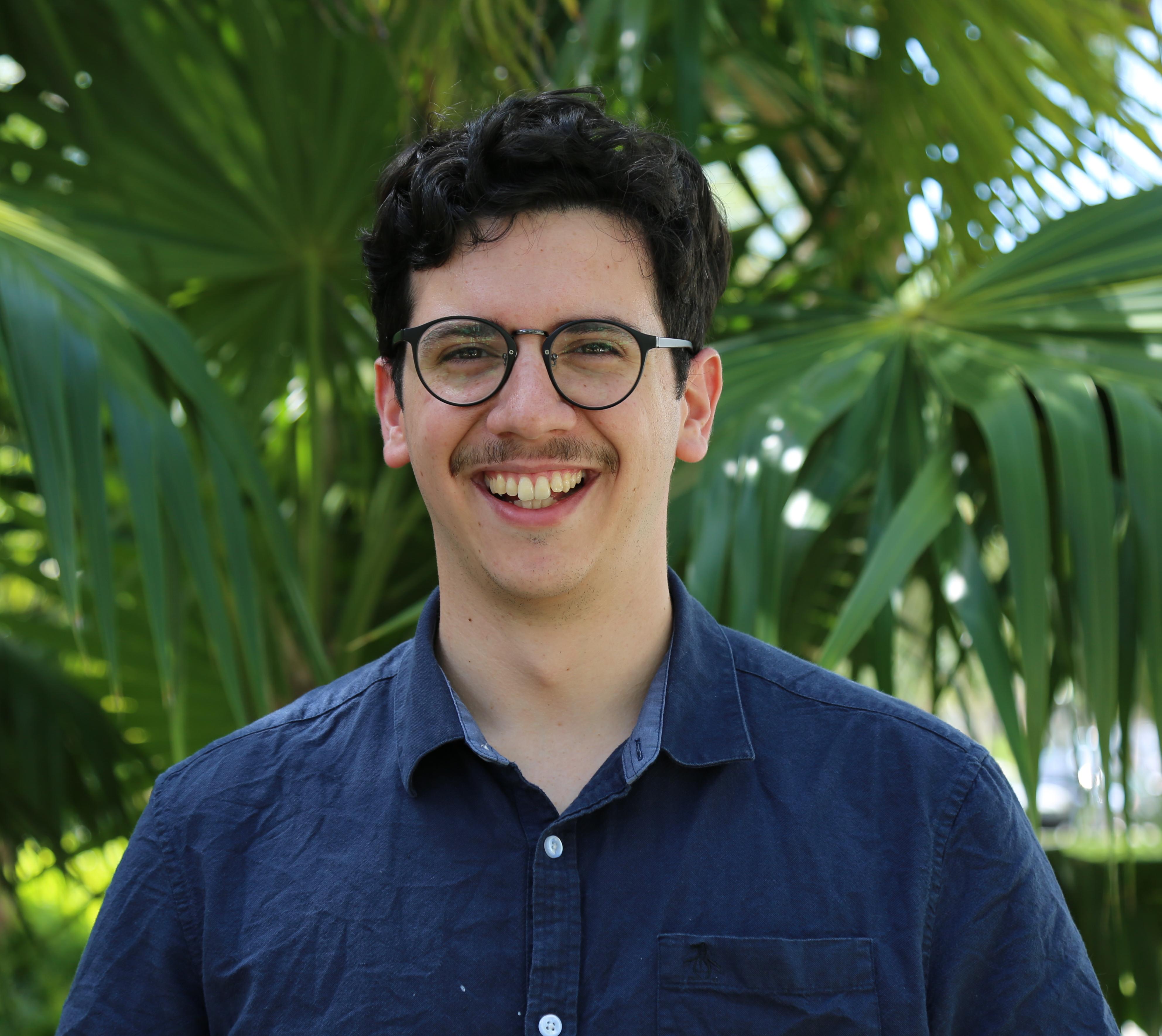 The Department of Sociology congratulates Brandon Martinez for successfully defending his thesis, titled "Housing Inequality: Racial Disparities among Patterns of Homeownership and Home Equity."
The Department of Sociology congratulates Brandon Martinez for successfully defending his thesis, titled "Housing Inequality: Racial Disparities among Patterns of Homeownership and Home Equity."
The thesis presents a critical exploration of Eduardo-Bonilla Silva’s Latin Americanization Thesis using the 2015 American Community Survey to explore the predictors of homeownership and home values among Cubans in the United States. Homeownership is an important wealth-generating mechanism and access to it can relate to the future socio-economic standing of subsequent generations. Results reveal racial inequalities in both homeownership and house values. White Cubans are more likely to own homes and have higher home values compared to other race and black Cubans. These results highlight the importance of considering racial inequality within select immigrant groups. Similar to previous research, demographic, economic, and housing characteristics have varying effects on housing tenure within the regression models. The concluding remarks address the theoretical implications of the findings using the Latin Americanization Thesis as well as the historical context in which these inequalities were created and persist. As the legal status of Cuban migration drastically changes, this project provides an important understanding of how one Latinx group encounters the United States racial system.
April 2018
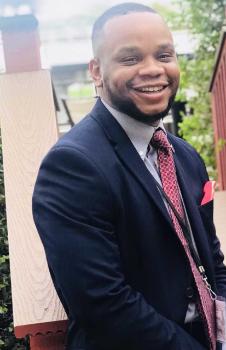 The Department of Sociology congratulates Oshea Johnson for successfully defending his thesis, titled "Assessment of Racial/Ethnic Differences in 'Patient Satisfaction that Impact Perceived Quality Health Care Treatment."
The Department of Sociology congratulates Oshea Johnson for successfully defending his thesis, titled "Assessment of Racial/Ethnic Differences in 'Patient Satisfaction that Impact Perceived Quality Health Care Treatment."
Many minorities have lower levels of trust in physicians and the larger healthcare system, lower satisfaction with the care that they receive, and overall lower access to and utilization of health care services. The purpose of this study is to examine racial and ethnic disparities and the moderating effects of patient satisfaction on perceived quality of health care treatment among adults who recently utilized health care services. Guided by the critical race theoretical framework and cultural health capital, this study extends the literature by documenting the interrelationship between race/ethnic identity, socioeconomic status, patient satisfaction, and perceived quality of health care. Data are from a subsample (n=13,112) of adults who reported going to the doctor in the past year (2014) in the nationally representative 2015 Medical Expenditure Panel Survey (MEPS). The study combines four self administered questionnaire response measures of patient satisfaction on a scale and dichotomize and reverse-code perceived quality health care. Multivariate analyses indicate that minorities, specifically non-Hispanic blacks and non-Hispanic others are significantly more likely to perceive poor quality health care, controlling for all socio-demographic factors, health insurance and patient satisfaction. Moreover, poor patient satisfaction attenuates the relationship among non-Hispanic blacks, people with a high school diploma or less and unemployed people and their perceived poor health care quality. Policy implications should provide incentives for physicians to ensure they are meeting patient requirements of satisfying patients’ needs while still making sure they are able to do their jobs effectively. Also, providing patients with the proper tools (pamphlets, health literacy, monitors in waiting rooms with advising cues before they see a physician) to ensure all patients, regardless of race, ethnicity or socioeconomic status receive quality health care and are prepared to ask questions and understand information more effectively.
April 2018
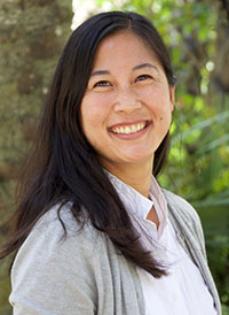 Congratulations to Dr. Marisa Omori for being awarded a Provost Research Award, which is designed to foster excellence in research and creative activity at the University of Miami. The title of her research project is “Racial Segregation, Immigration, and Life Course of Crime in Neighborhoods.”
Congratulations to Dr. Marisa Omori for being awarded a Provost Research Award, which is designed to foster excellence in research and creative activity at the University of Miami. The title of her research project is “Racial Segregation, Immigration, and Life Course of Crime in Neighborhoods.”
Copy of the project’s abstract:
My project asks the research question: Is racial and ethnic inequality, immigration, and other neighborhood characteristics historically contingent in their impact on neighborhood crime? We will focus on the role of racial/ethnic segregation and immigration patterns on crime over time and place. When examining neighborhood crime patterns in cities, the majority of research focuses on short-term and static explanations. Similarly, traditional theoretical explanations for crime are often assumed to be universal, which may not be appropriate because of the changing nature of neighborhoods and cities. Two major changes over time have been shifting residential racial segregation due to “White flight” historically and more recently, gentrification, as well as increasing immigration. I will use crime and Census data from St. Louis, Missouri from 1970 to 2010 (N=113 x 5 time points = 565 total observations). Specifically, I examine how neighborhood characteristics, including racial heterogeneity and immigration, differ across time within neighborhoods for violent crime. This current project will build on my research examining neighborhood racial inequality in the criminal justice system by considering how legacies of segregation and demographic changes matter for crime.
April 2018
 Congratulations to Anastasiia Kuptsevych for receiving the Dean’s Summer Research Fellowship, which is designed to offer additional support to doctoral students in their research and dissertation work. The title of her project is “What is actually happening in Miami schools? A comprehensive analysis of student violence and delinquency in Miami-Dade County.”
Congratulations to Anastasiia Kuptsevych for receiving the Dean’s Summer Research Fellowship, which is designed to offer additional support to doctoral students in their research and dissertation work. The title of her project is “What is actually happening in Miami schools? A comprehensive analysis of student violence and delinquency in Miami-Dade County.”
Copy of the project’s abstract:
Using unique survey data recently collected from middle and high school students from public and private schools in Miami-Dade County, I will examine links between adolescent involvement in violence and various delinquent behaviors and a wide range of factors from different domains in their lives (i.e., school, family, peers, and neighborhood). Furthermore, I will analyze how effects of those factors depend on race, ethnicity, and immigration origin of students. Because the unique dataset I utilize contains school-level data, I will also be able to investigate how various characteristics of school environments impact such behaviors of adolescents. This will be the first time such multi-level examination of violence and delinquent behaviors among Miami adolescents will take place. Finally, given the lack of comparative studies, I will compare the patterns of violence and delinquency among students in Miami-Dade County schools to students in several other cities in the US and few other countries.
April 2018
 Congratulations to Dr. Yader Lanuza for being awarded a Provost Research Award, which is designed to foster excellence in research and creative activity at the University of Miami. The title of his research project is “The Role of Social Class-specific Parenting Strategies in Immigrant-native Differences in School Readiness.”
Congratulations to Dr. Yader Lanuza for being awarded a Provost Research Award, which is designed to foster excellence in research and creative activity at the University of Miami. The title of his research project is “The Role of Social Class-specific Parenting Strategies in Immigrant-native Differences in School Readiness.”
Copy of the project's abstract:
Since the 1970s, the presence of immigrants as a share of the U.S. population has steadily increased, from a low 5% to just below 15% today. This influx has increased the number of immigrant families across the country and the presence of children of immigrants in American schools. Concurrently, the United States has experienced unrelenting growth in educational inequality (Duncan and Murmane 2011), with low-income children falling further and further behind. There is, however, one exception: income-based gaps in academic achievement at kindergarten entry (e.g., school readiness) have diminished recently (Reardon, Waldfogel, Bassok 2016). In this project, I examine whether increasing immigrant presence explains decreasing school readiness income-based inequality.
April 2018
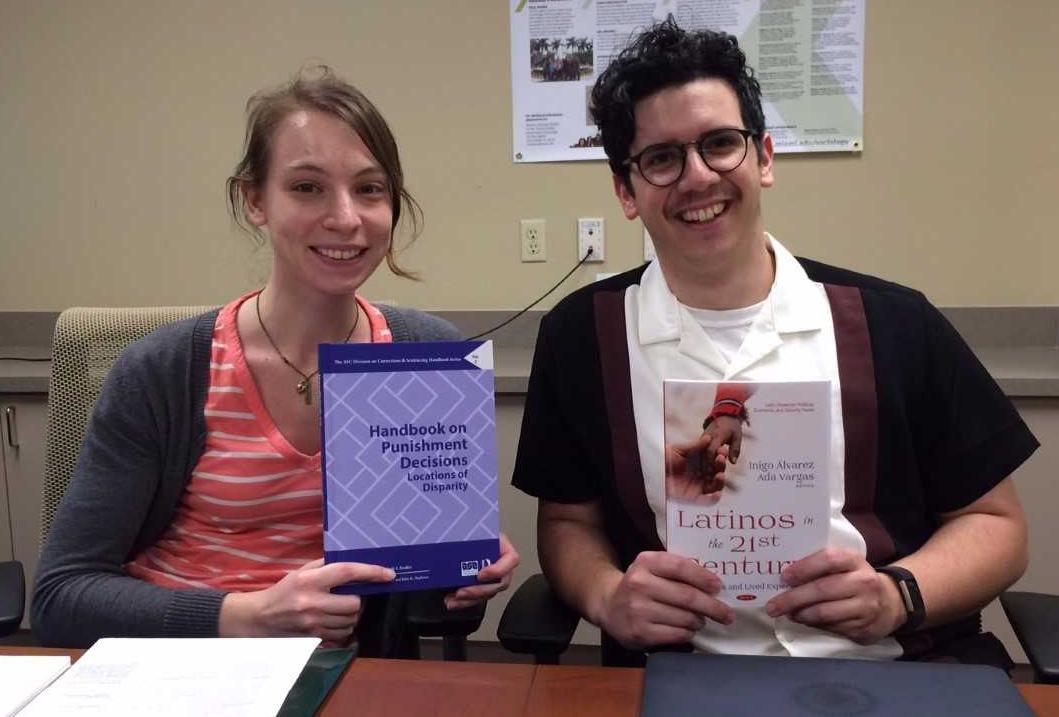 Congratulations to Rachel Lautenschlager, Dr. Marisa Omori, Brandon Martinez, Dr. Nick Peterson, and Dr. Wilson on their recently published book chapters!
Congratulations to Rachel Lautenschlager, Dr. Marisa Omori, Brandon Martinez, Dr. Nick Peterson, and Dr. Wilson on their recently published book chapters!
In “Handbook on Pubishment Decisions: Location of Disparity,” Omori and Lautenschlager expand the literature on racial disparities in court sentencing by offering theoretically and empirically guided suggestions for researchers to broaden conceptualizations of inequality in the criminal justice system. Specifically, they propose that researchers explore cumulative effects of inequality across stages of the criminal justice system, and move beyond studies of the individual defendant in order to explore inequality in sentencing at the neighborhood level. The chapter concludes with concrete ideas as to how these suggestions can be implemented in quantitative research.
In “Latinos in the 21st Century: Their Voices and Lived Experiences,” Martinez, Petersen, and Wilson used 2015 American Community Survey data to explore the determinants of homeownership among Cuban-Americans. Drawing insights from the literatures on systemic racism and assimilation, they tested two competing theories of homeownership stratification among Cuban-Americans. While results indicate that race and measures of assimilation predict homeownership, they found greater support for assimilation theory. Consistent with previous research, sociocultural assimilation measures such as English language and nativity positively predict the odds of homeownership. The chapter concludes with concrete ideas as to how these suggestions can be implemented in quantitative research.
Pictured: Rachel Lautenschlager and Brandon Martinez
January 2018
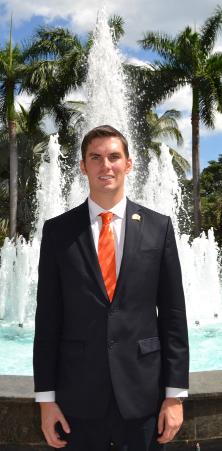 The Department of Sociology would like to congratulate Doctoral Candidate Eric R. Louderback for his recent peer-reviewed publication in The British Journal of Criminology entitled: “Integrating Social Disorganization and Routine Activity Theories and Testing the Effectiveness of Neighbourhood Crime Watch Programs: Case Study of Miami-Dade County, 2007–15.” The study investigates the effectiveness of citizens’ community crime watch programs in reducing crime. It is part of an interdisciplinary collaboration with Dr. Shouraseni Sen Roy from the Department of Geography and Regional Studies at University of Miami.
The Department of Sociology would like to congratulate Doctoral Candidate Eric R. Louderback for his recent peer-reviewed publication in The British Journal of Criminology entitled: “Integrating Social Disorganization and Routine Activity Theories and Testing the Effectiveness of Neighbourhood Crime Watch Programs: Case Study of Miami-Dade County, 2007–15.” The study investigates the effectiveness of citizens’ community crime watch programs in reducing crime. It is part of an interdisciplinary collaboration with Dr. Shouraseni Sen Roy from the Department of Geography and Regional Studies at University of Miami.
Using unique longitudinal data from 290 Census tracts in Miami-Dade County, Florida, the authors utilized advanced statistical and geospatial analysis methods to test for the effects of crime watch programs, and measures from social disorganization and routine activity theories, on the overall rate and change in burglary, robbery and aggravated assault between the years 2007 and 2015. The findings show that crime declined between 2007 and 2015 the most in neighborhoods with crime watch programs, while Local Moran’s I analyses revealed that crime watches and all three crime types were significantly clustered across neighborhoods. The results from negative binomial and geographically weighted regression analyses also provide partial support for social disorganization and routine activity theories for each crime type. Overall, the findings suggest that neighborhood watch programs have moderate support for reducing community crime and that geospatial methods are important to use when investigating crime patterning in cities.
Please see the link to the published article in The British Journal of Criminology here: https://doi.org/10.1093/bjc/azx062
November 2017
 Congratulations to Dr. Yader Lanuza on his recent publication in the Journal of Marriage and Family.
Congratulations to Dr. Yader Lanuza on his recent publication in the Journal of Marriage and Family.
Dr. Lanuza and Kristin Turney used data from the National Longitudinal Study of Adolescent to Adult Health to investigate the relationship between parental incarceration and the transition to adulthood. This research helps to focus on entrenched social processes of inequality that mass incarceration yields. Their study was also included in an article in The Society Pages.
Link to publication in Journal of Marriage and Family: http://onlinelibrary.wiley.com/doi/10.1111/jomf.12429/full
Link to The Society Pages article: https://thesocietypages.org/ccf/2017/10/17/parental-incarceration-and-the-transition-to-adulthood/
November 2017
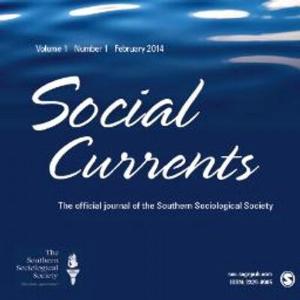 The Department of Sociology is pleased to announce that Dr. George Wilson has been appointed the next editor of Social Currents, the official journal of the Southern Sociological Society.
The Department of Sociology is pleased to announce that Dr. George Wilson has been appointed the next editor of Social Currents, the official journal of the Southern Sociological Society.
Social Currents is a highly rated and broad-ranging social science journal that focuses on research from all methodological and theoretical areas for national and international sociological communities. This journal receives about 275 manuscripts a year and has an acceptance rate of approximately 10-15 percent.
Congratulations to Dr. Wilson on this great accomplishment!
November 2017
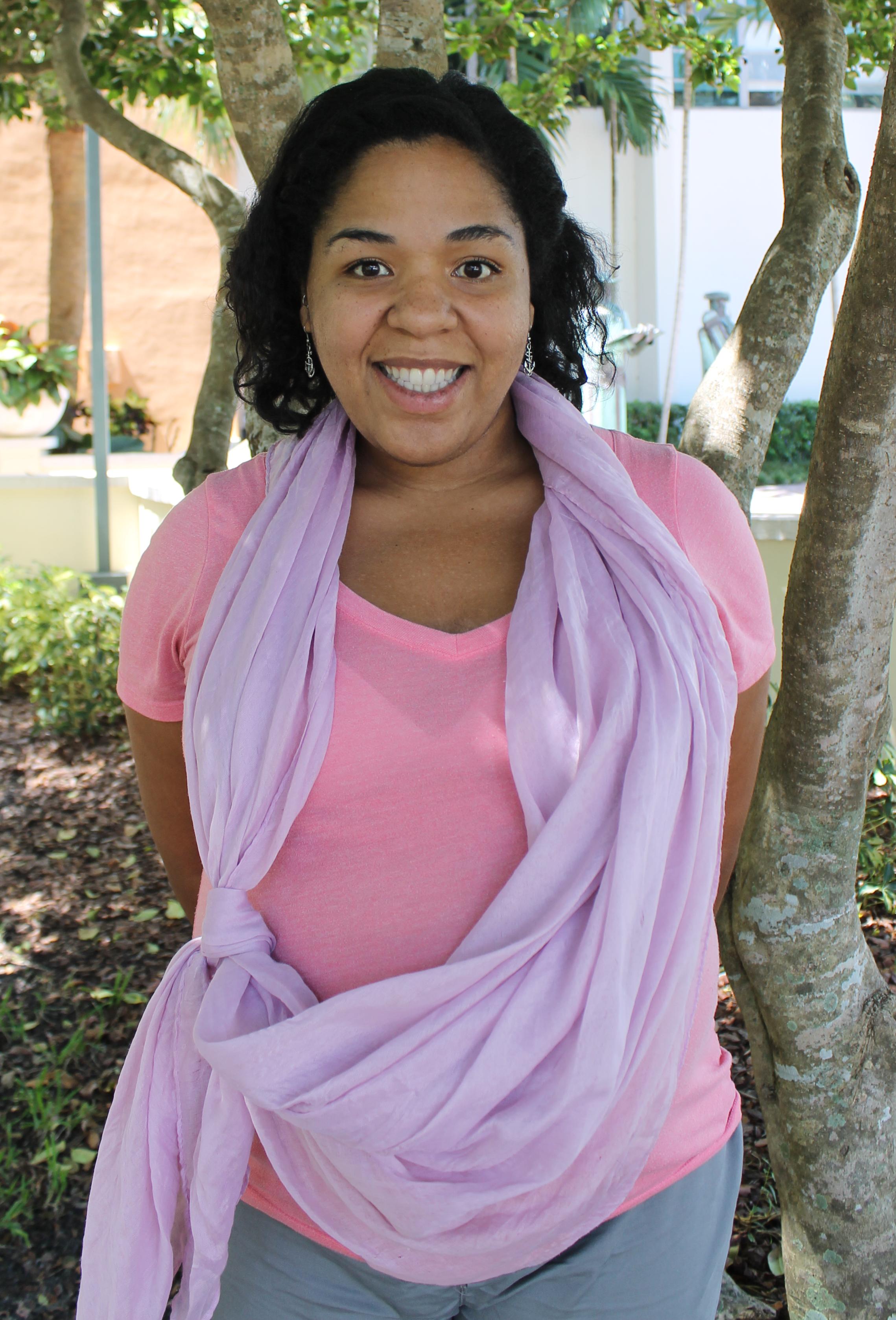 Congratulations to Felicia Casanova for receiving a fellowship awarded by the Institute for Advanced Study of the Americas! Every year since 2012, the College of Arts & Sciences and the University of Miami Institute for Advanced Study of the Americas awards three distinguished fellowships to fund doctoral students in areas of Latin American, Caribbean, Latino and Diasporic studies. Felicia completed her M.A. at UM in International Administration where she focused on evaluating the role, impact, and sustainability of medical missions in Latin America. After completing her M.A., she served the U.S. Peace Corps from 2009 to 2011 in Guatemala as a Municipal Development Volunteer. Felicia also worked with UM’s Department of Public Health Sciences managing and arranging public health capstones locally and globally.
Congratulations to Felicia Casanova for receiving a fellowship awarded by the Institute for Advanced Study of the Americas! Every year since 2012, the College of Arts & Sciences and the University of Miami Institute for Advanced Study of the Americas awards three distinguished fellowships to fund doctoral students in areas of Latin American, Caribbean, Latino and Diasporic studies. Felicia completed her M.A. at UM in International Administration where she focused on evaluating the role, impact, and sustainability of medical missions in Latin America. After completing her M.A., she served the U.S. Peace Corps from 2009 to 2011 in Guatemala as a Municipal Development Volunteer. Felicia also worked with UM’s Department of Public Health Sciences managing and arranging public health capstones locally and globally.
October 2017
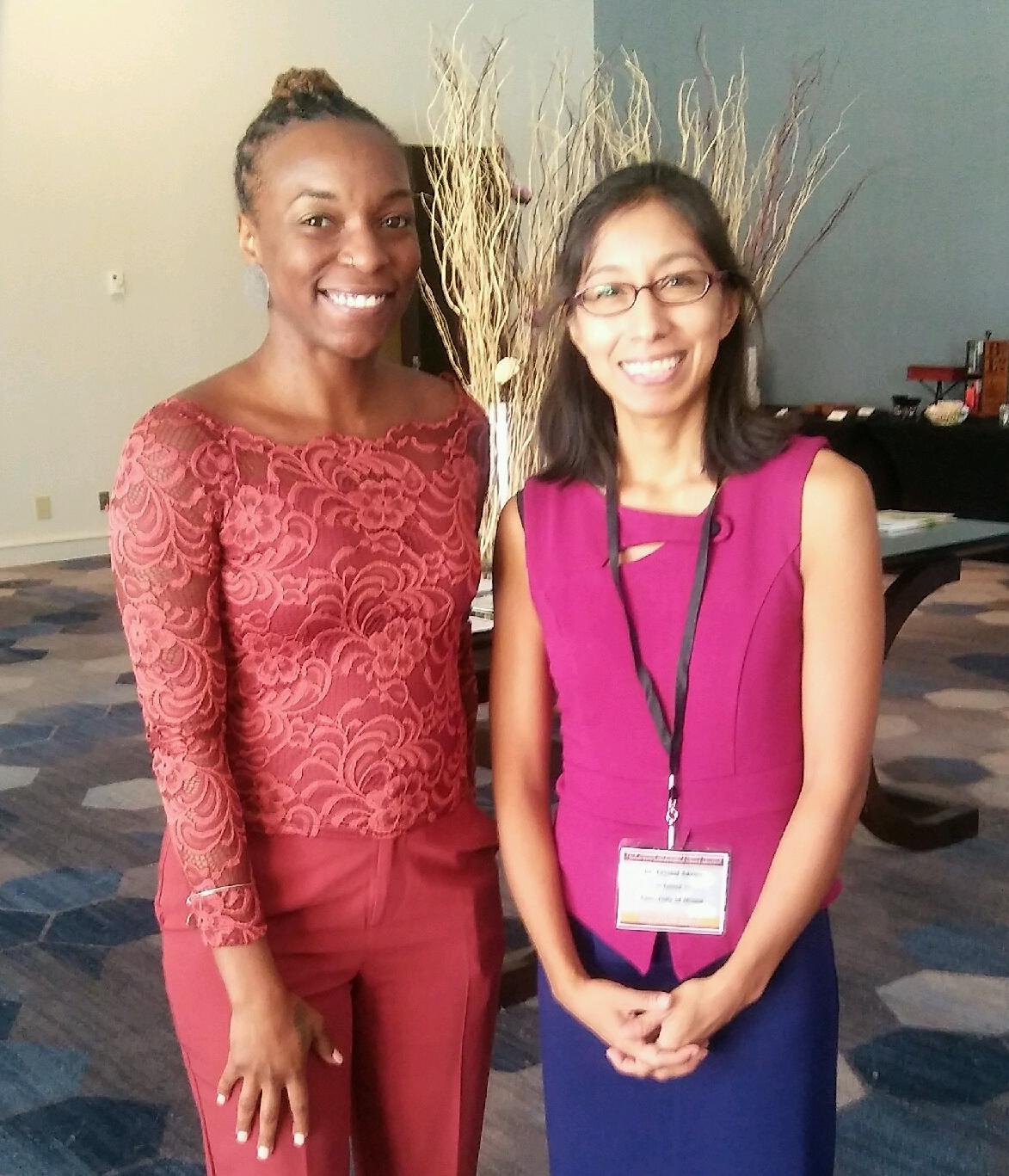 Congratulations to Dr. Crystal Adams for receiving the William R. Jones Outstanding Mentor Award at the Annual McKnight Doctoral Fellows Meeting, which took place in Tampa, FL on October 13-15. Shameka Thomas, a present graduate student of the Department of Sociology, nominated Dr. Adams for the award. The McKnight Doctoral Fellowship program provides support to African Americans and Hispanics pursuing Ph.D.'s, and more than 500 fellows have graduated with Ph.D.'s with support from the program.
Congratulations to Dr. Crystal Adams for receiving the William R. Jones Outstanding Mentor Award at the Annual McKnight Doctoral Fellows Meeting, which took place in Tampa, FL on October 13-15. Shameka Thomas, a present graduate student of the Department of Sociology, nominated Dr. Adams for the award. The McKnight Doctoral Fellowship program provides support to African Americans and Hispanics pursuing Ph.D.'s, and more than 500 fellows have graduated with Ph.D.'s with support from the program.
Pictured: Shameka Thomas & Dr. Crystal Adams
October 2017
 The Department of Sociology would like to extend an enthusiastic welcome to Dr. Yader Lanuza, who has joined our department as an assistant professor. Prior to coming to UM, he obtained his Ph.D. in sociology from the University of California, Irvine. His research and teaching interests include migration, immigrant incorporation, race & ethnicity, sociology of the family, sociology of education, the transition to adulthood, and economic sociology. We are excited to have him as the newest member of our Cane family!
The Department of Sociology would like to extend an enthusiastic welcome to Dr. Yader Lanuza, who has joined our department as an assistant professor. Prior to coming to UM, he obtained his Ph.D. in sociology from the University of California, Irvine. His research and teaching interests include migration, immigrant incorporation, race & ethnicity, sociology of the family, sociology of education, the transition to adulthood, and economic sociology. We are excited to have him as the newest member of our Cane family!
October 2017
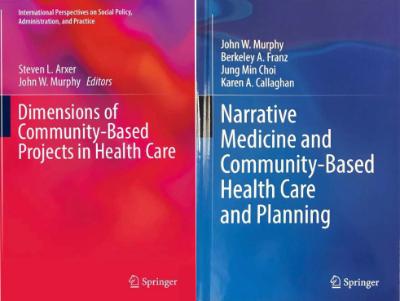 The Department of Sociology would like to congratulate Dr. John Murphy on his two recenly published books titled “Narrative Medicine and Community-Based Health Care and Planning” and "Dimensions of Community-Based Projects in Health Care."
The Department of Sociology would like to congratulate Dr. John Murphy on his two recenly published books titled “Narrative Medicine and Community-Based Health Care and Planning” and "Dimensions of Community-Based Projects in Health Care."
"Narrative Medicine and Community-Based Health Care and Planning" brings the innovative power of narrative medicine to the forefront of community public health care. It gives health psychologists, sociologists, social workers, and public health administrators realistic and practical insights for tapping into unique resources communities and clients have to offer.
"Dimensions of Community-Based Projects in Health Care" details the roles of physicians, research, and residents in the transition to self-directed initiatives and greater community control. This book challenges sociologists, social workers, and public health administrators to look toward more democratic programs, planning, and policy.
October 2017
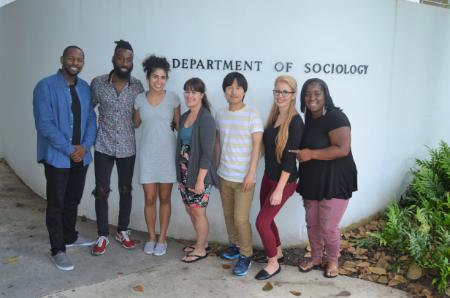 The Department of Sociology would like to extend a sincere welcome to our seven new graduate students!
The Department of Sociology would like to extend a sincere welcome to our seven new graduate students!
Randon Taylor attended the University of Houston-Clear Lake, where he received his M.A in sociology. His concentrations are immigration and race/ethnic relations. Willie Joseph is from Miami and attended the University of Miami’s School of Business Administration, where he received a dually accredited Executive M.B.A. in health policy and management, and a concentration in public health from the University of Miami’s Miller School of Medicine and School of Nursing and Health Studies. His concentrations are race/class and medical sociology. Azhin Bahraini is from Georgia and earned her B.S. in psychology from the University of Georgia. Her concentrations are criminology and race/ethnic relations. Laura Iesue is from Ohio and received her M.A. in sociology from New Mexico State University. Her concentrations include immigration and race/ethnic relations. Yasukio Sugimoto is from Tokyo and attended Osaka University. He has a concentration in criminology. Christina Bellasalma attended the University of California, Irvine, where she received a B.S. in political science with a specialization in public law. She is studying criminology with a concentration in law. Akinshimaya Nnamdi is a Miami native and attended Florida International University, where she received her M.S. in criminal justice. Her concentrations are criminology and race/ethnic relations. (Students are described in the photo from left to right)
We are excited to have such talented individuals join our department and look forward to witnessing their future accomplishments!
October 2017
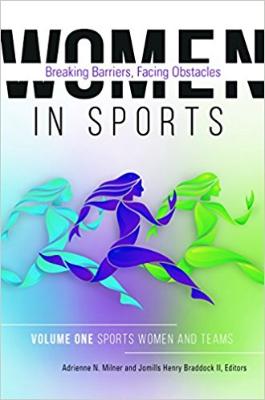 The Department of Sociology would like to congratulate Dr. Jomills Braddock II on his recently published two-volume anthology on women in sports titled "Women in Sports: Breaking Barriers, Facing Obstacles." The collection was edited by Dr. Braddock and his former student, Dr. Adrienne Milner. It also includes chapters authored by several recent graduates of the Department of Sociology’s doctoral program.
The Department of Sociology would like to congratulate Dr. Jomills Braddock II on his recently published two-volume anthology on women in sports titled "Women in Sports: Breaking Barriers, Facing Obstacles." The collection was edited by Dr. Braddock and his former student, Dr. Adrienne Milner. It also includes chapters authored by several recent graduates of the Department of Sociology’s doctoral program.
Covering a breadth of topics surrounding the current state of women in sports, this two-volume collection taps current events, sociological and feminist theory, and recent research to contextualize women’s experiences in sports within a patriarchal society and highlight areas for improvement. It challenges conventional wisdom surrounding women’s place and treatment in sports as female athletes continue to break sex barriers and shatter previous expectations regarding their ability against men. The collection includes contributions from a wide variety of athletes and scholars from around the world and comprises content edited by two editors of different sexes and races.
Dr. Braddock is a professor in the Department of Sociology. Dr. Milner earned her doctorate in the department and is currently serving as a lecturer of global health at Barts and the London School of Medicine and Dentistry, Queen Mary University of London.
The book also includes contributions by recent graduates of the department: Ashley Mikulyuk, Brittany Harder, Christina Sanchez-Volatier, and Felicia Theune.
October 2017
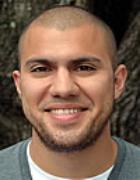 The Department of Sociology would like to congratulate graduate student Roberto Cancio on his upcoming publication in The Journal of Interpersonal Violence titled “Structural Pathways Between Race/Ethnicity, Substance Use, Military Service, and Male-Perpetrated Intimate Partner Violence (IPV) in Pre-9/11 Military Families.” This study contributes to the existing literature on IPV by employing structural equation modeling (SEM) to explore how perpetrator characteristics, including military experience, are related to IPV committed under the influence of various substances. The results of the study suggest that pre-9/11 veteran perpetrators commit verbal and mental abuse more often than other types of IPV, although there are differences in IPV perpetration trends and substance use across racial and ethnic groups. Additionally, veteran and non-veteran perpetrators demonstrate different IPV trends, regardless of race or ethnicity.
The Department of Sociology would like to congratulate graduate student Roberto Cancio on his upcoming publication in The Journal of Interpersonal Violence titled “Structural Pathways Between Race/Ethnicity, Substance Use, Military Service, and Male-Perpetrated Intimate Partner Violence (IPV) in Pre-9/11 Military Families.” This study contributes to the existing literature on IPV by employing structural equation modeling (SEM) to explore how perpetrator characteristics, including military experience, are related to IPV committed under the influence of various substances. The results of the study suggest that pre-9/11 veteran perpetrators commit verbal and mental abuse more often than other types of IPV, although there are differences in IPV perpetration trends and substance use across racial and ethnic groups. Additionally, veteran and non-veteran perpetrators demonstrate different IPV trends, regardless of race or ethnicity.
Roberto is a doctoral candidate in the Department of Sociology, specializing in the areas of medical sociology and race, ethnicity and immigration.
July 2017
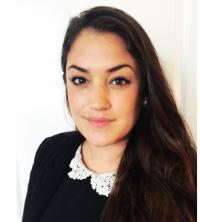 The Department of Sociology would like to congratulate Assistant Professor Crystal Adams, Ph.D., and recent graduate Brittany Harder, Ph.D. on their publication in Critical Public Health titled “Diet, exercise…and drugs: social constructions of healthy lifestyles in weight-related prescription drug advertisements.”
The Department of Sociology would like to congratulate Assistant Professor Crystal Adams, Ph.D., and recent graduate Brittany Harder, Ph.D. on their publication in Critical Public Health titled “Diet, exercise…and drugs: social constructions of healthy lifestyles in weight-related prescription drug advertisements.”
The article contributes to the literature on the social constructions of overweightness by examining popular presentations of lifestyle behavior in direct-to-consumer advertising (DTCA) geared toward overweight and obese individuals. Using ethnographic content analysis, the authors find that DTCA regards prescription drug adoption as a type of behavior change that, along with diet and exercise, is necessary to minimize health risks. In finding that pharmaceutical companies frame drug use as a necessary component for overweight and obese individuals’ health management, this research contributes to the vast literature that problematizes normative views of the nature, causes, and treatment of obesity and weight-related conditions.
To learn more, you can view the article here: http://www.tandfonline.com/doi/abs/10.1080/09581596.2017.1318204.
Pictured: Brittany Harder, Ph.D.
July 2017
 The Department of Sociology would like to congratulate the recipients of the following awards given out at the Departmental Awards Ceremony for the 2016-2017 academic year! The awardees are:
The Department of Sociology would like to congratulate the recipients of the following awards given out at the Departmental Awards Ceremony for the 2016-2017 academic year! The awardees are:
Undergraduate Awardees:
Alvin W. Rose Award for Outstanding Sociology Major: Emily Jeanne Handy
Bryce Finley Ryan Award for Academic Excellence in Criminology: Kyra Wenthen
Alpha Kappa Delta Sociology, International Honor Society in Sociology Award: Justin Goldberg
Alpha Phi Sigma Criminology, National Criminal Justice Honor Society Award: Devin Rivero
Graduate Awardee:
Outstanding Graduate Student: Eric Louderback
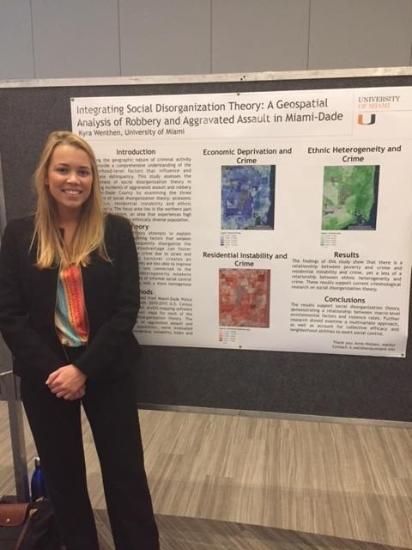 Kyra Wenthen, Bachelor of Arts in Criminology with Departmental Honors. Minors in Finance and Anthropology.
Kyra Wenthen, Bachelor of Arts in Criminology with Departmental Honors. Minors in Finance and Anthropology.
Title: Integrating Social Disorganization Theory: A Geospatial Analysis of Robbery and Aggravated Assault in Miami-Dade
Abstract: My research assesses the effectiveness of social disorganization theory in explaining incidents of aggravated assault and robbery in Miami-Dade County by examining economic deprivation, residential instability, and ethnic heterogeneity. The focus area lies in the northern part of the city of Miami, an area that experiences high levels of poverty and an ethnically diverse population. I used ArcGIS mapping software to create maps for each of the dimensions of social disorganization theory by joining crime data and U.S. Census data at the census-tract level. The findings show that there is a relationship between poverty and crime and residential instability and crime, yet less of a relationship between ethnic heterogeneity and crime. My results support current criminological research on social disorganization theory.
Bio: I have always had an interest in studying people and society, yet I was drawn to criminology after taking an introductory sociology course my freshmen year. My courses opened my eyes to various issues taking place in our society, and I became passionate about wanting to make a difference and help others. After graduation, I will be moving back home and seeking employment in the Greater New York City area. I am interested in working as a crime or intelligence analyst for a criminal justice agency. I believe my strong foundation in criminological theory and research has prepared me for a career as well as the possibility of furthering my education in graduate school.
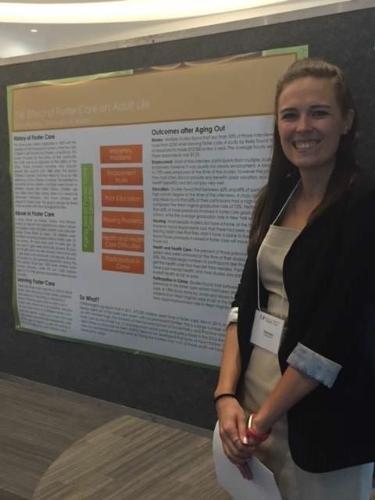 Emily Handy, Bachelor of Arts in Sociology with Departmental Honors. Minors in Criminology and Psychology.
Emily Handy, Bachelor of Arts in Sociology with Departmental Honors. Minors in Criminology and Psychology.
Title: The Effect of Foster Care on Adult Life
Abstract: My project is a literature review focusing on the outcomes of children who age out of the foster care system. I looked at how certain key points (financial well-being, education, employment, health and healthcare, and criminal involvement) of these children's lives differ from others who were not involved in the foster care system. I found that in most cases, children who age out of foster care are worse off than children not in the system, and that hardly any attention is given to these children to offer them help with their transition to living independently.
Bio: I decided to major in sociology because after taking a couple of classes in the department I realized how interested I was in the topic. I came into college undecided, but quickly realized that I wanted to work with less fortunate people and discovered that sociology would help me to accomplish that. After graduation, I will be attending the University of Michigan to earn my Master of Social Work. Sociology will influence my future work because I will be working with people who are often in poor situations and who need help because everything else has failed them. I will be able to take many of the lessons I have learned here during the last four years and apply them to my work.
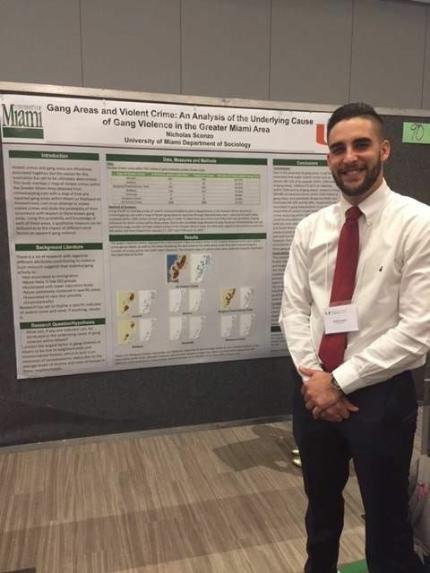 Nicholas Sconzo, Bachelor of Arts in Criminology, Psychology, and Spanish. Honors Program and Dual Degree Honors Program in Law.
Nicholas Sconzo, Bachelor of Arts in Criminology, Psychology, and Spanish. Honors Program and Dual Degree Honors Program in Law.
Title: “Gang Areas and Violent Crime: An Analysis of the Underlying Cause of Gang Violence in the Greater Miami Area”
Abstract: My thesis project studied violent crimes within the Greater-Miami Area and their locations relative to known gang areas within Miami in the hopes to use the information known about each of these gang areas in order to help to better determine the underlying cause of gang violence. I used arcGIS, a geographic imaging service that allowed me to overlay a map of all of the violent crimes in Miami as reported by police departments with a map of the known gang areas. At the end of my study, after determining the percentages of violent crimes within 1500 meters of each gang area, I was able to conclude only that violent crimes were most focused on the gang areas associated with a black race and a low socioeconomic status. Prior research had linked socioeconomic status and violent crime as mutually existing, but I still believe that there exists a mentality in these violent areas due to the neighborhood one lives in rather than the socioeconomic status of each person. Future research on this matter needs to focus on longitudinal, qualitative research such as a case study in order to determine the thoughts and mentalities of the people living in these areas.
Bio: I decided to major in Criminology due to an overwhelming interest in the causes of crime and in legal studies. After graduation, I will be attending the University of Miami School of Law, which clearly is an extension of criminology and will allow me to apply my past studies into my future studies.
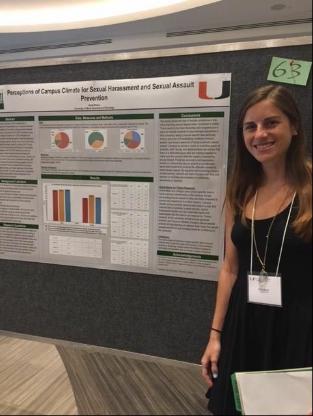 Devin Rivero, Bachelor of Arts in Criminology with Departmental Honors. Minors in Political Science and English. Outstanding Member of the Alpha Phi Sigma, National Criminal Justice Honor Society.
Devin Rivero, Bachelor of Arts in Criminology with Departmental Honors. Minors in Political Science and English. Outstanding Member of the Alpha Phi Sigma, National Criminal Justice Honor Society.
Title: “Perceptions of Campus Climate for Sexual Harassment and Sexual Assault Prevention”
Abstract: My thesis project uses data to quantitatively assess the relationship on a campus between gender and perceptions of schools’ campus sexual assault policy and resources. During the 2016-2017 academic year, undergraduate college students (N= 274) completed an electronic survey that included questions regarding general perceptions of campus police, faculty and school leadership. The survey utilized has been used in a Spring 2015 study commissioned by the Association of American Universities involving 27 colleges and 150,000 students across the nation to measure sexual assault campus climate and allows results to be compared between schools. Overall, the students at this school have more confidence dealing with sexual assault cases compared to the averages of the 27 universities in the AAU study. However, there are larger margins between female and male optimism at the urban South Florida university. Female respondents consistently demonstrated that they believe less confidently in the university handling sexual assault. Fostering campaigns and awareness events on campus that sexual assault is not tolerated would lead students to embody the attitudes needed to inhibit sexual assault. By regularly administrating campus climate surveys, schools can track changes over time and whether or not there are increases in confidence, awareness or reporting.
Bio: I decided to major in criminology because studying crime has always fascinated me. My father is a police officer so growing up I took an interest in talking to him about criminology theories and the social impact of crime. I am moving to Charlottesville, VA in August to attend the University of Virginia School of Law. My work in criminology will provide me insight and background for my future criminal law classes. I have learned a lot about sexual assault through my thesis and am more interested in learning about the laws affecting it.
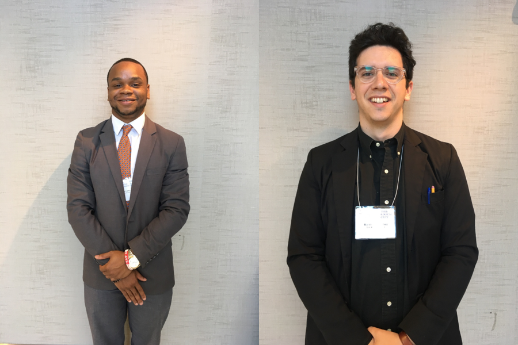 Earlier this month, two graduate students in the department presented their papers at the Southern Sociological Society Annual Meeting in Greenville, South Carolina!
Earlier this month, two graduate students in the department presented their papers at the Southern Sociological Society Annual Meeting in Greenville, South Carolina!
Congratulations to Oshea Donnell Johnson and Brandon Martinez! Below is the abstract to their papers:
Title: YOLO: A Critical Exploration of 'Delayed Gratification' and the Impact it has on Health Outcomes and Rationalization of Health Behaviors by Socioeconomic Status
Author: Oshea Donnell Johnson
This paper aims to critically explore the concept of delayed gratification through a sociological lens as it relates to health behaviors and health outcomes among persons belonging to various socioeconomic statuses. Socioeconomic status will be segregated into its separate components of income, occupation, and education attainment. Delay of gratification was first studied by psychologist Walter Mischel in a longitudinal study in which 4-year-old children attempt this type of self-control, reveal that in some situations, individual differences in delay behavior significantly predict patterns of competence and coping assessed more than a decade later. Through literature review and analysis of literature on health behaviors and health outcomes by various socioeconomic groups, I hypothesize there are cultural and structural constraints that vary based on an individual or group of individuals socioeconomic status, and that structural and cultural constraints will look much different among members of a lower SES and those who belong to the culture of poverty when compared to higher SES groups. Through a rational decision-making process, those belonging to various SES backgrounds will “delay gratification” in different ways that ultimately have an impact on their health behaviors and outcomes.
Title: Cycles of Development: Historical Structures of Power and Opportunity in Miami's Gentrifying Neighborhoods
Author: Brandon P. Martinez
The project explores the socio-historic context of gentrification in three Miami neighborhoods: Wynwood, Midtown, and the Design District. Using a critical-historical framework, archival material such as newspapers, community meeting transcripts, and business journals have been collected and evaluated to assess the factors that allowed gentrification to occur. Census data from 1980 to 2010 illustrate changing demographics that parallel the sociopolitical patterns of community leadership, real estate investment, and educational transmission of pro-gentrification ideologies. Since the 1980s, there has been an effort by the city of Miami to reinvest in its decaying urban core. This prioritized the private development of public space but failed to account for the particular ethnic makeup of the metropolis. Left out of the city plan were Latino minorities, small businesses, and divested but vibrant neighborhoods. The results suggest that gentrification has taken hold of these three Miami neighborhoods as a result of coordinated but unanticipated social and political factors. As patterns of ideological transmission, private investment, and networks of power indicate, gentrification in Miami is rooted in the city's socio-historic context and seems to be a burgeoning force for the urban development of the acclaimed "Gateway to the Americas."
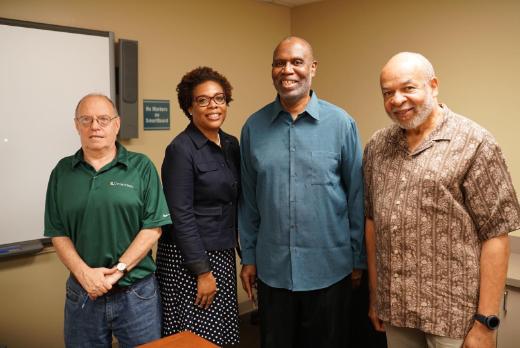 Felecia Theune successfully defended her dissertation entitled “The Effect of Intercollegiate Athletic Participation on Graduation from College and Preparation for Life After Sports at Selective Colleges and Universities,” which quantitatively and longitudinally examined the cumulative effects of individual student characteristics, pre-college backgrounds and college environmental factors on feeling prepared for the future at different stages of development for the same students, both athletes and non-athletes, before, during and at the end of college. This study found that athletes at academically selective colleges and universities differ from their non-athlete peers but not in the manner and not to the degree often portrayed by the media. Most importantly, the study found that while graduation from college was positively associated with feeling prepared for the future for non-athletes, there was no significant relationship between graduation from college and feeling prepared for life after college for athletes. These results highlight the importance of extending the measure of academic success beyond earning a college degree. Felecia’s dissertation committee consisted of Dr. Marvin P. Dawkins (chair), Dr. Jomills Braddock and Dr. George Wilson from the University of Miami, and Dr. Eddie Comeaux from University of California, Riverside.
Felecia Theune successfully defended her dissertation entitled “The Effect of Intercollegiate Athletic Participation on Graduation from College and Preparation for Life After Sports at Selective Colleges and Universities,” which quantitatively and longitudinally examined the cumulative effects of individual student characteristics, pre-college backgrounds and college environmental factors on feeling prepared for the future at different stages of development for the same students, both athletes and non-athletes, before, during and at the end of college. This study found that athletes at academically selective colleges and universities differ from their non-athlete peers but not in the manner and not to the degree often portrayed by the media. Most importantly, the study found that while graduation from college was positively associated with feeling prepared for the future for non-athletes, there was no significant relationship between graduation from college and feeling prepared for life after college for athletes. These results highlight the importance of extending the measure of academic success beyond earning a college degree. Felecia’s dissertation committee consisted of Dr. Marvin P. Dawkins (chair), Dr. Jomills Braddock and Dr. George Wilson from the University of Miami, and Dr. Eddie Comeaux from University of California, Riverside.
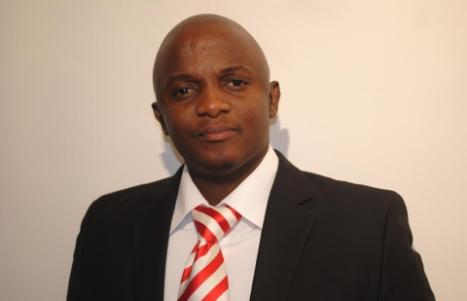 The Department of Sociology would like to congratulate Tebogo Sebeelo for successfully defending his master thesis, titled “Structure of Agency: Gaining meanings and Insights into alcohol consumption in Botswana.” Using constructivist grounded theory and symbolic interactionism, the study explored the everyday experience of drinkers in Botswana, the meanings they attach to drinking and how alcohol control policies impacted their drinking. Data collection was done via twenty alcohol drinkers in Gaborone, Botswana. Findings of the study indicate that drinkers constantly negotiate their drinking selves and adjust them throughout the life-course. At each stage, drinking becomes unique, contextual, and situated. The theory developed from the study indicate that beer drinkers in Botswana resisted alcohol control policies through drinking networks and seeking alternative drinking spots. The findings of the study advance the literature on alcohol policy in Sub-Saharan Africa by showing that individual acts of resistance work as effectively as organized resistance usually associated with social movements in sociological literature. Committee Chair: Dr. Linda Belgrave, Dr. John Murphy and Dr. Karen Callaghan (Barry University).
The Department of Sociology would like to congratulate Tebogo Sebeelo for successfully defending his master thesis, titled “Structure of Agency: Gaining meanings and Insights into alcohol consumption in Botswana.” Using constructivist grounded theory and symbolic interactionism, the study explored the everyday experience of drinkers in Botswana, the meanings they attach to drinking and how alcohol control policies impacted their drinking. Data collection was done via twenty alcohol drinkers in Gaborone, Botswana. Findings of the study indicate that drinkers constantly negotiate their drinking selves and adjust them throughout the life-course. At each stage, drinking becomes unique, contextual, and situated. The theory developed from the study indicate that beer drinkers in Botswana resisted alcohol control policies through drinking networks and seeking alternative drinking spots. The findings of the study advance the literature on alcohol policy in Sub-Saharan Africa by showing that individual acts of resistance work as effectively as organized resistance usually associated with social movements in sociological literature. Committee Chair: Dr. Linda Belgrave, Dr. John Murphy and Dr. Karen Callaghan (Barry University).
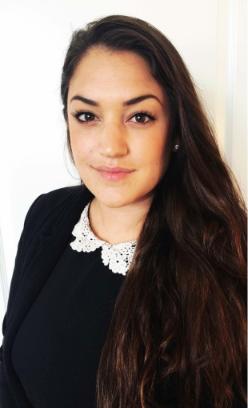 The Department of Sociology is pleased to congratulate Brittany M. Harder for successfully defending her dissertation entitled, “The American Medical Association’s Designation of Obesity as a Disease and its Influences on Experiences of Body Weight.” Brittany traces the socio-historical efforts to medicalize body weight in the United States overtime and focuses on the latest and most extreme of these efforts which was the American Medical Association’s (AMA) designation of obesity as a “disease” in June 2013. This controversial movement has been named the “most profound act of medicalization in American medicine” and the effects of this movement up until now have been unknown.
The Department of Sociology is pleased to congratulate Brittany M. Harder for successfully defending her dissertation entitled, “The American Medical Association’s Designation of Obesity as a Disease and its Influences on Experiences of Body Weight.” Brittany traces the socio-historical efforts to medicalize body weight in the United States overtime and focuses on the latest and most extreme of these efforts which was the American Medical Association’s (AMA) designation of obesity as a “disease” in June 2013. This controversial movement has been named the “most profound act of medicalization in American medicine” and the effects of this movement up until now have been unknown.
Although quite exploratory, the project was shaped and informed by integrating several bodies of literature including clinical, public, and critical perspectives of obesity, sociology of scientific knowledge, sociology of language, illness experience, social constructionism, and medicalization. Brittany conducted 31 in-depth interviews with 29 women considered “obese” by medical standards (BMI > 30 kg/m2) who had spoken to a health professional about their body weight since June 2013 to understand the potential implications of obesity’s new disease classification. Through constructivist grounded theory methodology, Brittany developed a theory that explains experiences of body weight in light of the AMA’s policy. Findings suggest that experiences are based within a series of competing realities as well as lifelong ongoing ties between body weight and self.
Many participants diagnosed with obesity the disease rejected a diagnosis of obesity given by a health professional since 2013. Through participants’ descriptions of their experiences, some health professionals seem to have adopted the AMA’s disease model of obesity while others have not, thereby influencing their overall approaches towards their “obese” patients. This includes the choice of language used in discussions of body weight with their patients, the degree to which body weight is seen as an urgent health issue, and the choice of diagnosis and treatment plan, if any. Despite major efforts to standardize obesity treatment, participants’ experiences are more influenced by the individual health professional’s approach towards obesity and by participants’ past experiences with body weight, than by the policy change itself.
Participants’ interpretations of obesity as a “disease” also varied; while some were understanding of the AMA’s decision, others were highly critical of a disease model of obesity. Participants provided feedback as to how health professionals can improve their conversations with their patients about body weight. Overall, findings suggest that the AMA’s policy has had immediate and meaningful influences on many participants through their experiences with others and by facing popular societal and medical depictions of obesity the disease. Therefore, while the current research approach does not aim to represent a pre-post policy model, findings do suggest that extreme acts of medicalizing obesity, like the AMA’s 2013 policy, influence participants’ lives and experiences with body weight in overwhelming and sometimes detrimental ways.
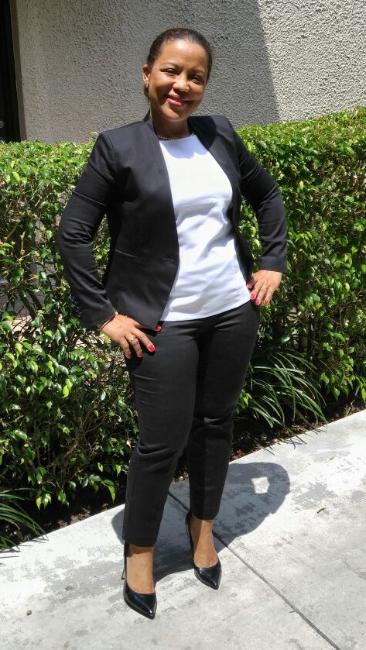 The Department of Sociology would like to congratulate Liza Hayes Mathias for successfully defending her doctoral dissertation, The Embodied Experience of Pain: A Phenomenological Study of Pain in Adults Diagnosed With and Treated for Cancer.” The purpose of this dissertation was to understand and explain the meaning of pain among 15 adults who are diagnosed with and treated for cancer. Based on this study, the meaning of pain is related to the process of making meaning. In the first stage, pain disrupts the spacio-temporality and everyday lives of adults.
The Department of Sociology would like to congratulate Liza Hayes Mathias for successfully defending her doctoral dissertation, The Embodied Experience of Pain: A Phenomenological Study of Pain in Adults Diagnosed With and Treated for Cancer.” The purpose of this dissertation was to understand and explain the meaning of pain among 15 adults who are diagnosed with and treated for cancer. Based on this study, the meaning of pain is related to the process of making meaning. In the first stage, pain disrupts the spacio-temporality and everyday lives of adults.
This stage is quickly followed by the dawning awareness of multiple losses: the loss of function, of daily roles, and of taken-for-granted physical safety; these losses push individuals to retreat from the life they once lived. As the body is transformed due to the medical treatment, participants’ lifeworlds are disrupted. This sudden disruption curtails the involvement in the lifeworld, resulting in a shrinking life. The normal flow of the self is interrupted as participants lose familiarity with the basic process of their identities, their bodies. In the third, making sense of pain, participants seek to reconcile themselves with their new reality. Communication becomes the main source of meaning; by sharing and communicating pain, participants acknowledge the significance of those experiences, and by listening to the communicated painful experiences of others, participants validate their own experiences.
This stage extends epistemology into a context of pain awakening, where genuine knowledge of pain is experienced and explained within the boundaries of science, spirituality, and the self. It is through the self that the person in pain becomes both subject and object of his or her experience and meaning, acquiring knowledge about his or her particular experience of pain. In some sense, by experiencing pain, participants are experiencing the essence of pain and of themselves.
Liza’s committee consisted of Dr. Linda L. Belgrave (Chair), Dr. Marvin P. Dawkins, Dr. John W. Murphy, and Dr. Joseph A. Kotarba. Congratulations, Liza!
 The department would like to congratulate Dr. Bisma Sayed, Ph.D. graduate of the Department of Sociology (2014) and Dr. Michael T. French, Professor of Sociology and Health Policy Administration, on their recent publication in the top-tier, peer-reviewed journal Social Science & Medicine entitled: " To Your Health!: Re-examining the Health Benefits of Moderate Alcohol Use."
The department would like to congratulate Dr. Bisma Sayed, Ph.D. graduate of the Department of Sociology (2014) and Dr. Michael T. French, Professor of Sociology and Health Policy Administration, on their recent publication in the top-tier, peer-reviewed journal Social Science & Medicine entitled: " To Your Health!: Re-examining the Health Benefits of Moderate Alcohol Use."
The study builds on previous research to investigate the associations between alcohol use and self-rated health status among young adults. Using data collected in 2008 from the National Longitudinal Survey of Adolescent to Adult Health (Add Health), we use ordered probit models to determine whether the protective effects of moderate alcohol use are present after controlling for demographic, lifestyle, family background, and health-related characteristics. Our findings generally support earlier research with older samples, but some key gender differences are present. Please see a link to the article here.
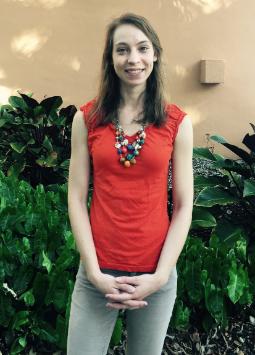 Our department is pleased to announce that Ph.D. student, Rachel Lautenschlager, has been awarded the Dean’s Summer Research Fellowship from the University of Miami College of Arts and Sciences! This prestigious fellowship provides funding for doctoral students to pursue independent research projects.
Our department is pleased to announce that Ph.D. student, Rachel Lautenschlager, has been awarded the Dean’s Summer Research Fellowship from the University of Miami College of Arts and Sciences! This prestigious fellowship provides funding for doctoral students to pursue independent research projects.
Rachel intends to use the award to support her research exploring patterns in officer-involved shootings in Miami-Dade County, FL., and the role that the media plays in reporting on them. Congratulations to Rachel for her outstanding accomplishment!
 The Department of Sociology is proud to announce that Eric R. Louderback, a Doctoral Candidate in the Department of Sociology, and Olena Antonaccio, an Associate Professor in the Department of Sociology, have published their study entitled “Exploring Cognitive Decision-making Processes, Computer-focused Cyber Deviance Involvement and Victimization: The Role of Thoughtfully Reflective Decision-making” in the Journal of Research in Crime and Delinquency, a top-tier journal in the area of Criminology (click here for article). Over the past three years, both scholars have been working on collecting and analyzing survey data on cognitive decision-making, social factors, and cybercrime. This research is funded by a National Science Foundation grant led by PIs Drs. Olena Antonaccio (Department of Sociology, University of Miami) and Saman Zonouz (Department of Electrical and Computer Engineering, Rutgers University) in collaboration with co-PIs Drs. Kamal Premaratne and Manohar N. Murthi (Department of Electrical and Computer Engineering, University of Miami).
The Department of Sociology is proud to announce that Eric R. Louderback, a Doctoral Candidate in the Department of Sociology, and Olena Antonaccio, an Associate Professor in the Department of Sociology, have published their study entitled “Exploring Cognitive Decision-making Processes, Computer-focused Cyber Deviance Involvement and Victimization: The Role of Thoughtfully Reflective Decision-making” in the Journal of Research in Crime and Delinquency, a top-tier journal in the area of Criminology (click here for article). Over the past three years, both scholars have been working on collecting and analyzing survey data on cognitive decision-making, social factors, and cybercrime. This research is funded by a National Science Foundation grant led by PIs Drs. Olena Antonaccio (Department of Sociology, University of Miami) and Saman Zonouz (Department of Electrical and Computer Engineering, Rutgers University) in collaboration with co-PIs Drs. Kamal Premaratne and Manohar N. Murthi (Department of Electrical and Computer Engineering, University of Miami).
This NSF-funded interdisciplinary research project entitled “Cybercrime Susceptibility in the Sociotechnical System: Exploration of Integrated Micro- and Macro-Level Sociotechnical Models of Cybersecurity” investigates social-psychological and technical elements of cybercrime and the cybersecurity infrastructure, and it is a large-scale and innovative effort to apply sociological and criminological theories to the domain of cybercrime. Its results will inform institutional cybersecurity policies and will ultimately be utilized to develop an integrated socio-technical approach to understanding cybercrime involvement and victimization.
Dr. Antonaccio and Mr. Louderback have presented their findings from this project at international and national conferences including the Stockholm Criminology Symposium and the American Society of Criminology and Academy of Criminal Justice Sciences Annual Meetings. They, with collaborators from the University of Maryland and the Hebrew University of Jerusalem, will also present additional cross-national applications of their research in May 2017 in Jerusalem, Israel. The department would like to congratulate Dr. Antonaccio and Mr. Louderback on this innovative and interdisciplinary publication sponsored by this NSF grant and wish them the best in their ongoing research!
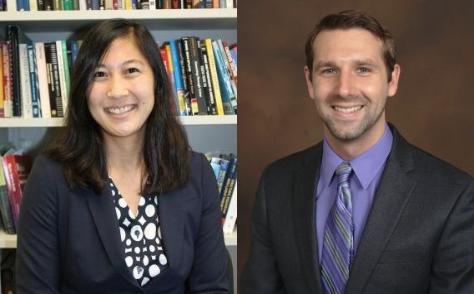 Congratulations to Dr. Omori and Dr. Petersen for being awarded a Provost Research Award, which is designed to foster excellence in research and creative activity and increase the overall research portfolio at the University of Miami. The title of their project is “The Geography of Criminal (In)justice in Miami-Dade County: Neighborhood context and racial inequality across the life-course of criminal cases.”
Congratulations to Dr. Omori and Dr. Petersen for being awarded a Provost Research Award, which is designed to foster excellence in research and creative activity and increase the overall research portfolio at the University of Miami. The title of their project is “The Geography of Criminal (In)justice in Miami-Dade County: Neighborhood context and racial inequality across the life-course of criminal cases.”
Below is a copy of their project’s abstract:
Prior research on racial inequality in the criminal justice system suggests that defendants of color receive more severe sanctions. The majority of this research focuses on individual defendants, however, rather than considering the broader neighborhood context of these cases. Moreover, most research focuses solely on a particular criminal justice institution such as policing or sentencing, but fails to examine the processes in between, or how these institutions interact to produce cumulative racial inequalities. Our project focuses on how these large-scale racial disparities occur by examining neighborhood context and criminal justice process of inequality.
This project uses six years (2010-2015) of data from Miami-Dade County. By matching arrest location to U.S. Census data, we can better understand how neighborhoods matter for racial inequality in criminal case processing. Combining multiple data sources, we will track all cases in the county from police stop or arrest to final case disposition, examining multiple criminal justice outcomes: 1) arrests, 2) bail decisions, 3) charging practices, and 4) disposition and sentencing outcomes. These findings will shed light on the geography of criminal justice in one of the nation’s largest and most diverse counties.
 Congratulations to Dr. Nowotny, who was selected as one of sixty-two recipients of the 217 Provost Research Awards, which provide salary support and direct research costs to help faculty pursue a variety of research topics and projects. Her project is titled “Use of Health Services Following Release from Prison: A Longitudinal Examination of African American Women.”
Congratulations to Dr. Nowotny, who was selected as one of sixty-two recipients of the 217 Provost Research Awards, which provide salary support and direct research costs to help faculty pursue a variety of research topics and projects. Her project is titled “Use of Health Services Following Release from Prison: A Longitudinal Examination of African American Women.”
Below is a copy of her project’s abstract:
Formerly incarcerated African American women bear the quadruple health burden of their race/ethnicity, class, gender, and status as a criminal offender. Incarcerated women, in general, have significantly poorer health than incarcerated men and the general population across multiple domains (mental, behavioral, chronic, and infectious disease). Yet, the health and healthcare of these “invisible” women has been largely ignored in research and policy. If left untreated, these health conditions can result in repeated cycling through the correctional system, exacerbation of disease, and avoidable and expensive hospitalizations and emergency room (ER) visits. Using Andersen’s Behavioral Model of Health Services Use for vulnerable populations, the proposed study analyzes data from a recently completed longitudinal prospective cohort study funded by the National Institutes of Health (NIH): Black Women in the Study of Epidemics (B-WISE; PI: Oser, R01-DA022967). The objective of this proposed study is to expand the research aims of the parent study to examine the use of health services for African American women following release from prison and the health enabling factors, including social networks, that hinder or facilitate use of these services. The rationale for the proposed research is that understanding the mechanisms associated with use (or nonuse) of health services for this vulnerable population is necessary for two reasons: for the design and implementation of successful intervention strategies for prelease planning for African American women in prison; and for reducing health disparities and societal costs associated with expensive ER visits over general medical care more broadly.
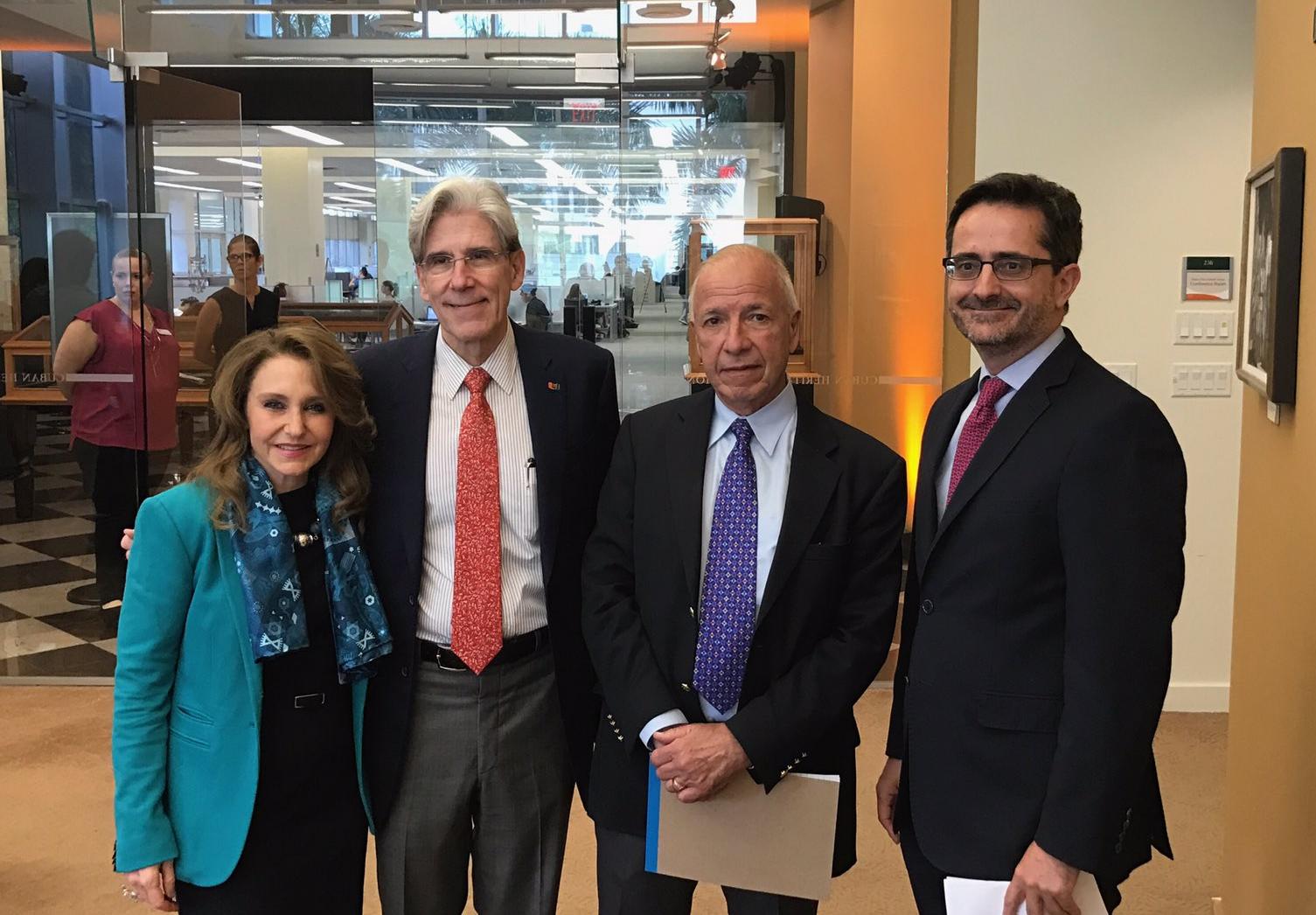 The Department of Sociology, in conjunction with the University of Miami Institute for Advanced Study of the Americas and The UM Cuban Heritage Collection, hosted a Colloquium centered around the work “Spanish Legacies: The Coming of Age of the Second Generation,” written by Dr. Alejandro Portes and two co-authors.
The Department of Sociology, in conjunction with the University of Miami Institute for Advanced Study of the Americas and The UM Cuban Heritage Collection, hosted a Colloquium centered around the work “Spanish Legacies: The Coming of Age of the Second Generation,” written by Dr. Alejandro Portes and two co-authors.
The book explores how the children of immigrants—the second generation—are coping with the challenges of adapting to Spanish society, comparing their experiences with those of their peers in the United States. The event was attended by prestigious University of Miami members, namely President Julio Frenk and Dr. Felicia Knaul, who served as the moderator for the Colloquium. To read more about the event and learn more about the book “Spanish Legacies” click here.
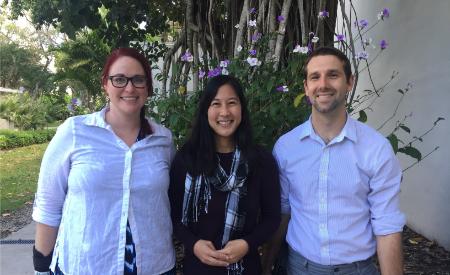 The Department of Sociology would like to congratulate three of our esteemed professors, Dr. Nowotny, Dr. Omori, and Dr. Petersen, for being granted a Faculty Learning Community Fellowship! The Faculty Learning Community is a group of faculty members engaged in regular meetings to increase their knowledge about teaching, to increase their motivation to pursue innovation, and to become more scholarly in their approach to teaching.
The Department of Sociology would like to congratulate three of our esteemed professors, Dr. Nowotny, Dr. Omori, and Dr. Petersen, for being granted a Faculty Learning Community Fellowship! The Faculty Learning Community is a group of faculty members engaged in regular meetings to increase their knowledge about teaching, to increase their motivation to pursue innovation, and to become more scholarly in their approach to teaching.
Within the Faculty Learning Community context, faculty concentrate on one of three areas: 3-D Scanning/Printing and Visualization, Flipped and Active Learning, and Student Generated Media. Congratulations once again to these three for receiving such a distinct and competitive honor!
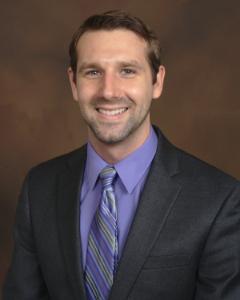 Justin Stoler (Geography), Jessica Williams (Nursing), Donna Coker (Law), and Nick Petersen (Sociology - pictured left) recently received a U-MIA Interdisciplinary Working Group grant to study intimate partner violence in Miami-Dade County. The project will create an IPV knowledge base that will serve as an important public resource for linking IPV, health care, and legal service providers, and act as a reference guide for local residents in need of assistance. The clearinghouse will also provide a platform for future research exploring disparities in community-level IPV indicators and resources. The project will fund several student research opportunities this summer (TBA).
Justin Stoler (Geography), Jessica Williams (Nursing), Donna Coker (Law), and Nick Petersen (Sociology - pictured left) recently received a U-MIA Interdisciplinary Working Group grant to study intimate partner violence in Miami-Dade County. The project will create an IPV knowledge base that will serve as an important public resource for linking IPV, health care, and legal service providers, and act as a reference guide for local residents in need of assistance. The clearinghouse will also provide a platform for future research exploring disparities in community-level IPV indicators and resources. The project will fund several student research opportunities this summer (TBA).
 The Department of Sociology would like to congratulate Dr. Portes on being appointed Chair of the Post-Doctoral Selection Committee of the Joint National Academy of Education- Spencer Foundation Program! This is a nation-wide program to which recent doctoral graduates in the field of education apply to support their research projects. It is a highly competitive program.
The Department of Sociology would like to congratulate Dr. Portes on being appointed Chair of the Post-Doctoral Selection Committee of the Joint National Academy of Education- Spencer Foundation Program! This is a nation-wide program to which recent doctoral graduates in the field of education apply to support their research projects. It is a highly competitive program.
The panel is in charge of making the final decisions on these awards and is composed of seven members of the National Academy of Education. Dr. Portes is currently chair-elect and will take over as chair at next year’s competition and serve in this position for three years.
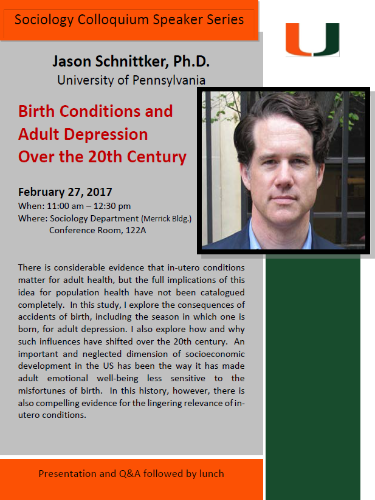 The Department of Sociology invites you to join us in our first Colloquium Speaker Series of the semester! Jason Schnittker, Ph.D., will be presenting on "Birth Conditions and Adult Depression Over the 20th Century" on Monday, February 27th!
The Department of Sociology invites you to join us in our first Colloquium Speaker Series of the semester! Jason Schnittker, Ph.D., will be presenting on "Birth Conditions and Adult Depression Over the 20th Century" on Monday, February 27th!
Come to the Sociology Department Conference Room (Merrick 122A) at 11 AM to learn about the relationship between in-utero conditions and adult health.
Download a copy of the event's flyer click here!
Alejandro Portes, reference author in the area of migration and economic sociology, has been awarded the degree of Doctor Honoris Causa by the proposal of the Department of Sociology of FCSH / NOVA. Dr. Portes attended the Universidade Nova de Lisboa last month to give a lecture on “Institutions and Development: Results of a comparative research,” promoted by the PhD Studies on Globalization.
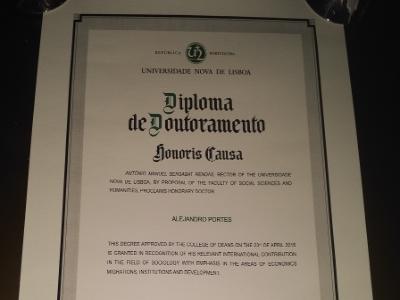 Alejandro Portes is Professor Emeritus of Sociology (Howard Harrison and Gabrielle Snyder Beck Chair) at Princeton University and Professor-Researcher at the University of Miami, United States of America. He is now one of the most prominent North American sociologists, with outstanding work in the fields of sociology of migration, urban, economic, institutions and development, as well as important contributions to sociological theory.
Alejandro Portes is Professor Emeritus of Sociology (Howard Harrison and Gabrielle Snyder Beck Chair) at Princeton University and Professor-Researcher at the University of Miami, United States of America. He is now one of the most prominent North American sociologists, with outstanding work in the fields of sociology of migration, urban, economic, institutions and development, as well as important contributions to sociological theory.
Alejandro Portes has been collaborating regularly with NOVA since 1997 through the Department of Sociology. Dr. Portes also received honorary doctorates from New School University (USA), University of Wisconsin (USA), University of Genoa (Italy) and Roskilde University (Denmark).
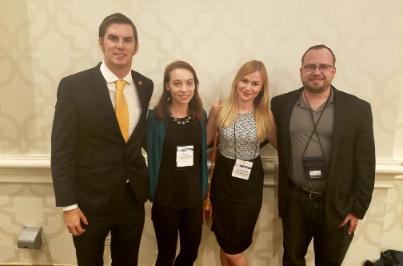 The Department would like to congratulate the multiple graduate students and faculty members who attended the American Society of Criminology conference earlier this month! Below is a list of all those who presented:
The Department would like to congratulate the multiple graduate students and faculty members who attended the American Society of Criminology conference earlier this month! Below is a list of all those who presented:
Cognitive Factors, Contingencies, and Cybercrime in a Cross-National Context from Israel and the United States; Authors: Olena Antonaccio, University of Miami; Eric Louderback, University of Miami; Tamar Berenblum, Hebrew University; David Maimon, University of Maryland
Neutralizations, Their Sources, and Crime; Authors: Charles R. Tittle, North Carolina State University; Olena Antonaccio, University of Miami; Ekaterina Botchkovar, Northeastern University
The Crime-Preventive Effects of Religiosity in Males and Females: A Study in Russia and Ukraine; Authors: Ekaterina Botchkovar, Northeastern University; Olena Antonaccio, University of Miami; Lorine Hughes, University of Colorado Denver
Do School Conditions Affect Delinquency? Testing of Agnew’s Strain Theory; Authors: Anastasiia Kuptsevych, University of Miami; Olena Antonaccio, University of Miami; William R. Smith, North Carolina State University
Developing an Integrated Theory of Macro-Level Crime: A Multilevel Analysis of Anomic Disorganization Theory; Author: Eric Louderback, University of Miami
Crack as Proxy: Aggressive Federal Prosecutions as Institutional Racism?; Authors: Marisa Omori, University of Miami; Mona Lynch, University of California, Irvine
The Geography of Death: A Socio-Spatial Analysis of Homicide Court Cases; Author: Nick Petersen, University of Miami
Proactive or Predetermined?: An Ecological Examination of Stop and Frisk in New York City; Author: Rachel Lautenschlager, University of Miami
Race/Ethnicity, Weapon Use, and Lethality; Amie L. Nielsen, University of Miami;Feodor Gostjev, Bridgewater State University; Eric Louderback, University of Miami
Inequalities in Health Service Use among Former Inmates: A Propensity Score Approach; Author: Kathryn Nowotny, University of Miami
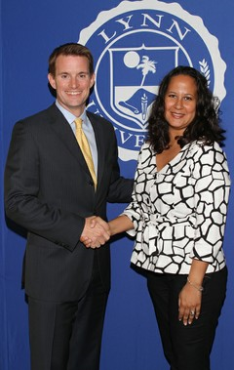 Katrina Carter-Tellison was recently named dean of Lynn’s College of Liberal Education, after serving as the chair of the university’s nationally-recognized, innovative core curriculum, The Dialogues of Learning, and as associate professor of sociology.
Katrina Carter-Tellison was recently named dean of Lynn’s College of Liberal Education, after serving as the chair of the university’s nationally-recognized, innovative core curriculum, The Dialogues of Learning, and as associate professor of sociology.
Carter-Tellison’s intellectual interests and research pursuits have mainly focused on three areas: curriculum, immigration and inequality, and social stratification. She joined Lynn’s College of Arts and Sciences as an assistant professor of sociology in the fall of 2004. She began her career at Lynn by teaching sociology courses, including Contemporary Social Problems, Race and Ethnic Relations, and Current Perspectives in Substance Abuse.
In 2006, she was promoted to chair of the Department of Criminal Justice. In addition to participating in the development and implementation of the new core, she developed and taught a course in the Dialogues of Learning titled, America’s Journey towards Equality in the US: From King to Obama.
Prior to coming to Lynn, Carter-Tellison earned her Ph.D. in sociology at the University of Miami. Her major area of concentration was race and ethnic relations with a minor concentration in cultural studies and criminology. The topic of her dissertation was “Skin Tone and Perceptions of Discrimination among African Americans: Evidence from the Multi-City Study of Urban Inequality.”
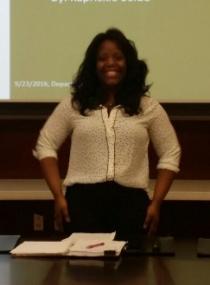 The Department of Sociology congratulates Kikie Seide for successfully defending her thesis, titled “In The Midst of It All: A Grounded Theory Study of the Everyday Life of Haitians During a Cholera Epidemic,” which explores the social dimension of the cholera epidemic in Haiti. It examines the extent to which the epidemic changed the everyday life of Haitians since its onset in 2010 with a focus on the processes by which people are adapting to cholera related disruptions. Kikie's thesis committee consisted of Dr. Linda Belgrave (chair), Dr. Marvin Dawkins, and Dr. Kate Ramsey.
The Department of Sociology congratulates Kikie Seide for successfully defending her thesis, titled “In The Midst of It All: A Grounded Theory Study of the Everyday Life of Haitians During a Cholera Epidemic,” which explores the social dimension of the cholera epidemic in Haiti. It examines the extent to which the epidemic changed the everyday life of Haitians since its onset in 2010 with a focus on the processes by which people are adapting to cholera related disruptions. Kikie's thesis committee consisted of Dr. Linda Belgrave (chair), Dr. Marvin Dawkins, and Dr. Kate Ramsey.
The data were collected through interviewing thirty Haitians living in Port-au-Prince, Haiti and analyzed using a constructivist grounded theory methodology. The theory developed explains the ways in which individuals navigate changing social and epidemiological contexts amidst the ongoing cholera epidemic. Results indicate that changes in people’s behaviors and practices are linked to their understanding of the epidemic’s life cycle, structural factors (i.e. provision of public services), their perception of the disease, and their concern with societal blame. Lastly, individual characteristics mitigated risks of cholera exposure. Having a reliable source of income and being integrated in cohesive social networks were key characteristics Haitians relied on to follow cholera prevention guidelines and rid their living conditions of cholera risk factors.
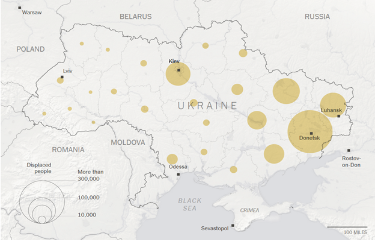 Last year, the Institute for Economics & Peace placed Ukraine in the top-ten list of nations that have suffered most from terrorism. The trauma from terrorism is compounded by the ongoing ethnic conflict (known as the Donbass War) in the eastern Donbass region of the country.
Last year, the Institute for Economics & Peace placed Ukraine in the top-ten list of nations that have suffered most from terrorism. The trauma from terrorism is compounded by the ongoing ethnic conflict (known as the Donbass War) in the eastern Donbass region of the country.
The fighting between pro-Russian separatist and Ukrainian forces has been deadly for both combatants and civilian residents, with more than 10,000 people killed, and even more have been injured or driven from their homes. At the beginning of last year, over one million people from Ukraine were refugees, asylum seekers or internally displaced persons.
Two faculty members in Sociology, Professors Olena Antonaccio and Robert Johnson, are preparing to begin a longitudinal study of the impact of the exposure to this trauma among the civilian residents. They will be collaborating with researchers at Northeastern University and the University of Colorado. This study will be one of a few that focuses on the mental health and public safety of civilian residents of lower or middle income countries embroiled in ethnic conflict.
Professor Antonaccio is a criminologist who will look at the criminal consequences of ethnic conflict and Professor Johnson is a medical sociologist who will look at the impact on symptoms of PTSD and depression. The study is being funded by a Provost Research Award and a seed grant from the Dean of Arts & Sciences at the University of Miami.
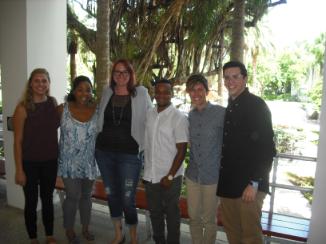 On behalf of the Department of Sociology, we would like to extend a sincere welcome to our new faculty member, Dr. Nowotny, as well as to the five new Graduate students.
On behalf of the Department of Sociology, we would like to extend a sincere welcome to our new faculty member, Dr. Nowotny, as well as to the five new Graduate students.
Oshea D. Johnson is from Washington DC and attended Morehouse College where he received his bachelor of arts in sociology with a concentration in public health. His concentrations are race/ ethnic relations and criminology. Brandon P. Martinez is from Miami, Florida and attended Miami Dade College where he received an A.A. degree in architecture and Brooklyn College where he got his bachelors in sociology. His concentrations are race/ethnic relations and criminology. Mallory Morken is from Winona, Minnesota and attended University of Minnesota where she got her bachelors in individualized studies with a concentration in social justice, Chicano studies and Spanish studies. Her areas of concentration are race/ethnic relations and immigration.
Felicia Casanova is from Miami, Florida and has graduated with her masters in international administration from the University of Miami. Her concentrations are medical sociology and race/ethnic relations and immigration. Kaitlin Pericak is from Albany, New York and has graduated with masters in sociology from American University in Washington, D.C. Her areas of concentration are medical sociology and race/ethnic relations through the lens of sport. Dr. Kathryn Nowotny joins our department after completing her Ph.D. in Sociology from the University of Colorado Boulder. Her research interests include health disparities, correctional health & health care, drug use & abuse, and mental health.
We are humbled to have such distinguished and talented individuals join the Department of Sociology, and we look forward to their future successes!
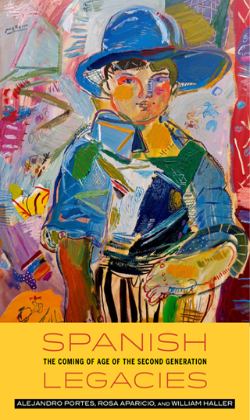 Alejandro Portesis a best-selling UC Press author, Howard Harrison and Gabrielle S. Beck professor of sociology (emeritus) at Princeton University, and Research Professor at the University of Miami. Using an extensive data set based on both survey and ethnographic material, Spanish Legacies describes the experiences of growing up by the large population of second generation youths in Spain and the principal outcomes of the process – from national self-identification and experiences of discrimination to educational attainment and labor market entry.
Alejandro Portesis a best-selling UC Press author, Howard Harrison and Gabrielle S. Beck professor of sociology (emeritus) at Princeton University, and Research Professor at the University of Miami. Using an extensive data set based on both survey and ethnographic material, Spanish Legacies describes the experiences of growing up by the large population of second generation youths in Spain and the principal outcomes of the process – from national self-identification and experiences of discrimination to educational attainment and labor market entry.
The study is based on a sample of almost 7,000 second generation students interviewed in Madrid and Barcelona in 2008 and followed and re-interviewed four years later. Outcomes of the adaptation process in Spain are systematically presented in five chapters, introduced by real life histories of selected respondents drawn by the study’s ethnographic module. Systematic comparisons with results from the United States show a number of surprising similarities in the adaptation of children of immigrants in both countries, as well as differences marked by contrasting experiences of discrimination, self-identities, and ambition.
 The Department of Sociology would like to congratulate the recipients of the following awards given out at the Departmental Awards Ceremony for the 2015 – 2016 academic year! The awardees are:
The Department of Sociology would like to congratulate the recipients of the following awards given out at the Departmental Awards Ceremony for the 2015 – 2016 academic year! The awardees are:
Felicia Theune, Outstanding Graduate Student in Sociology Award
Luis Real, Alvin W. Rose Award for Outstanding Sociology Major
Sarah Aschbrock, Bryce Finley Ryan Award for Academic Excellence in Criminology
Rebecca Hunter, Outstanding Graduating Member of Alpha Kappa Delta Sociology
Kelly Guinn, Outstanding Graduating Member of Alpha Phi Sigma Criminology
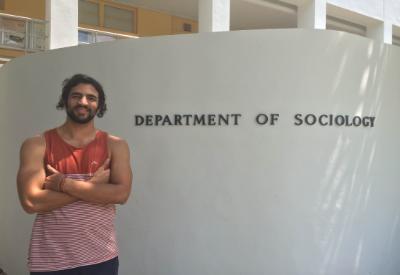 The Department of Sociology would like to congratulate Armando Torres on successfully defending his M.A. thesis, “A Developmental Theory Analysis of the Puerto Rican Popular Democratic Party’s (PPD) Economic Policy.” For this project he evaluated the PPD’s governmental platform and interviews with party officials through the lens of developmental theory, specifically Amartya Sen’s Capabilities Approach, Neoliberalism, and Developmentalism. The results of his analysis suggest that by promoting both Developmentalist and Neoliberal policies, the PPD fails to abide by a particular developmental theory. He also argues that this theoretical ambivalence may help explain developmental inefficiency or failure. Armando’s thesis committee consisted of Dr. John Murphy (chair), Dr. Linda Belgrave, and Dr. Bruce M. Bagley. Congratulations, Armando!
The Department of Sociology would like to congratulate Armando Torres on successfully defending his M.A. thesis, “A Developmental Theory Analysis of the Puerto Rican Popular Democratic Party’s (PPD) Economic Policy.” For this project he evaluated the PPD’s governmental platform and interviews with party officials through the lens of developmental theory, specifically Amartya Sen’s Capabilities Approach, Neoliberalism, and Developmentalism. The results of his analysis suggest that by promoting both Developmentalist and Neoliberal policies, the PPD fails to abide by a particular developmental theory. He also argues that this theoretical ambivalence may help explain developmental inefficiency or failure. Armando’s thesis committee consisted of Dr. John Murphy (chair), Dr. Linda Belgrave, and Dr. Bruce M. Bagley. Congratulations, Armando!
Southern Sociological Society - Student Presentations
April, 2016
Atlanta, GA
Graduate Student Presentations
Liza Hayes Mathias: Phenomenological Study of Pain: The Experiences of Cancer-Related Pain; Non-Armed Conflict for Territorial Rights and for The Preservation of the Culture (co-authored with Liza Gomez)
Rachel Lautenschlager: Proactive or Predetermiend? Contextualizing Color-Blind Policing Practices in New York City; Does High School Really Matter? The Longitudinal Effects of Adolescent Risky Behaviors on Adult mental and Physical Health Outcomes (co-authored with Eric Louderback, Brittany Harder, and Anastasiia Kuptsevych)
Kapriskie Seide: Making Sense of Ebola & Other Infectious Illnesses (co-authored with Linda Belgrave and LaToya Lewis-Pierre); Foreign Born and Obesity Rates: What Story Could Their Spatial Distribution Tell Us?
Shameka Thomas: Contractions or Constructions: A Content Analysis of Birthing Facilities in Miami, Florida
Brittany Harder: Obesity a Disease? Lived Experiences of Body Weight and How This Changes What We Know About the Obesity Epidemic (co-authored with Linda Belgrave); Racial Differences in Patients' Perceptions of Direct-to-Consumer Advertising (co-authored with Crystal Adams, Liza M. Hayes, and Rob Cancio); Does High School Really Matter? The Longitudinal Effects of Adolescent Risky Behaviors on Adult mental and Physical Health Outcomes (co-authored with Eric Louderback, Rachel Lautenschlager, and Anastasiia Kuptsevych)
Anastasiia Kuptsevych: The Influence of Religiosity on the Attitudes towards Homosexuality among College Students; The Longitudinal Effects of Adolescent Risky Behaviors on Adult mental and Physical Health Outcomes (co-authored with Eric Louderback, Rachel Lautenschlager, and Brittany Harder)
Undergraduate Student Presentations
Rachel Ruben: What makes Effective Counsel? A Case Study of Miami-Dade Capital and First-degree Felony Cases.
Kelly Guinn: The Influence of Education, Employment, and SES on Substance Use Desistance.
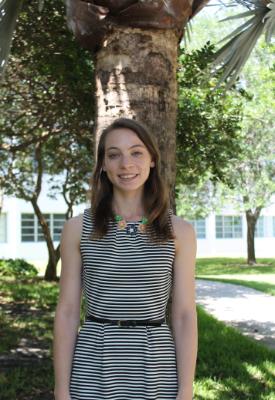 The Department of Sociology would like to congratulate Rachel Lautenschlager for successfully defending her Masters thesis! Rachel’s thesis, “Proactive or Predetermined?: Contextualizing color-blind policing practices in New York City,” examines the mechanisms driving racial disparities in police decision-making processes and outcomes. She addresses this issue by conducting a neighborhood-level analysis of the reasons that police officers provided for making 4.5 million stops over a period of twelve years as a part of the New York City Police Department’s stop and frisk policy.
The Department of Sociology would like to congratulate Rachel Lautenschlager for successfully defending her Masters thesis! Rachel’s thesis, “Proactive or Predetermined?: Contextualizing color-blind policing practices in New York City,” examines the mechanisms driving racial disparities in police decision-making processes and outcomes. She addresses this issue by conducting a neighborhood-level analysis of the reasons that police officers provided for making 4.5 million stops over a period of twelve years as a part of the New York City Police Department’s stop and frisk policy.
Specifically, her analysis examines how the proportions of stops that are made based on appearance vary depending on neighborhood racial composition and perceived crime rates. The results indicate that nonbehavioral stop rates are significantly higher in Black and Latino neighborhoods, and that perceived crime is one of the strongest predictors of the proportion of stops in a neighborhood that are made for nonbehavioral reasons. The findings of this study advance the literature on policing by providing evidence that neighborhood characteristics are salient factors in determining policing practices. Rachel’s committee consisted of Dr. Marisa Omori (Chair), Dr. Amie Nielsen, and Dr. Stoler. Congratulations, Rachel!
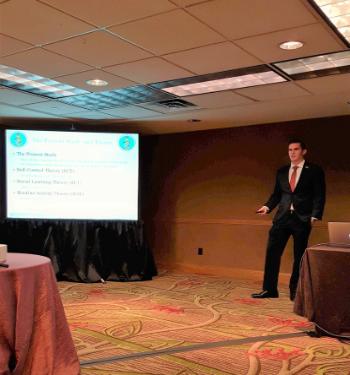 The Department of Sociology would like to acknowledge fourth year Ph.D. student Eric Louderback for his presentation entitled “Toward an Integrated Account of Cybercrime Victimization: Self-Control, Social Learning and Routine Activities” at the Academy of Criminal Justice Sciences 2016 Annual Meeting last week in Denver, Colorado with Associate Professor Dr. Olena Antonaccio. His presentation integrated three major individual-level social psychological criminological theories to explain computer-focused cybercrime victimization with primary survey data and found that each of the three perspectives were empirically supported, with the strongest results for self-control theory.
The Department of Sociology would like to acknowledge fourth year Ph.D. student Eric Louderback for his presentation entitled “Toward an Integrated Account of Cybercrime Victimization: Self-Control, Social Learning and Routine Activities” at the Academy of Criminal Justice Sciences 2016 Annual Meeting last week in Denver, Colorado with Associate Professor Dr. Olena Antonaccio. His presentation integrated three major individual-level social psychological criminological theories to explain computer-focused cybercrime victimization with primary survey data and found that each of the three perspectives were empirically supported, with the strongest results for self-control theory.
The Academy of Criminal Justice Sciences is an international association established in 1963 to foster professional and scholarly activities in the field of criminal justice and to develop and share knowledge about critical issues regarding crime and criminal and social justice. The Department is proud to highlight the professional involvement and scholarly activities of its graduate students!
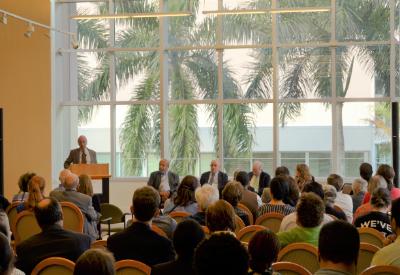 Last week, Department of Sociology Professor Dr. Alejandro Portes took part in a discussion with a distinguished panel of scholars about his new book entitled The State and the Grassroots: Immigrant Transnational Organizations in Four Continents, co-authored by Dr. Patricia Fernández-Kelly. Drawing from the main concepts in the book, the discussion focused on how immigrants collectively mobilize to create transnational organizations, acquire resources and learn new skills in countries they migrate to, and how doing so provides important benefits upon returning to their home country in a process of “circular” migration.
Last week, Department of Sociology Professor Dr. Alejandro Portes took part in a discussion with a distinguished panel of scholars about his new book entitled The State and the Grassroots: Immigrant Transnational Organizations in Four Continents, co-authored by Dr. Patricia Fernández-Kelly. Drawing from the main concepts in the book, the discussion focused on how immigrants collectively mobilize to create transnational organizations, acquire resources and learn new skills in countries they migrate to, and how doing so provides important benefits upon returning to their home country in a process of “circular” migration.
Closing remarks were made by UM President Dr. Julio Frenk, and the panel of scholars included moderator Dr. Jomills H. Braddock II, of the Department of Sociology, School of Law Professor Dr. David Abraham, Harvard Professor Dr. Jorge I. Domínguez, and Dr. Felicia Knaul, director of the Miami Institute for the Americas. Be sure to check out the new book here and keep up to date by “Liking” our Facebook page and browsing our website for more exciting upcoming events!
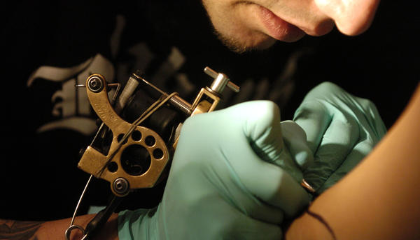 Congratulations to Dr. Michael T. French and Dr. Philip K. Robins for their recent publication on tattoos and earnings that was picked up by local news outlets, including the Sun Sentinel. French and Robins (2016) conclude based on their most recent study that tattoos have no effect on an individual's employment or earnings.
Congratulations to Dr. Michael T. French and Dr. Philip K. Robins for their recent publication on tattoos and earnings that was picked up by local news outlets, including the Sun Sentinel. French and Robins (2016) conclude based on their most recent study that tattoos have no effect on an individual's employment or earnings.
The study discusses that tattoos are becoming less and less taboo and there is a higher acceptance rate in traditional workplaces, mainly amongst younger employees. Taking into consideration factors such as education, behavioral choices, and lifestyle factors, there was no significant difference in the manner in which individuals with tattoos are treated than those without tattoos. Check out the link from the Sun Sentinel here.
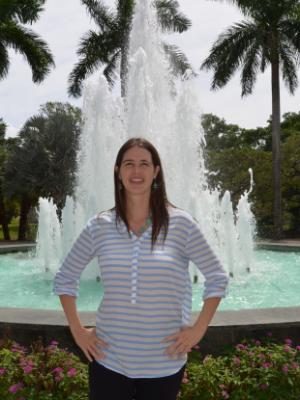 The Department of Sociology would like to extend sincere congratulations to Dr. Christina Sanchez Volatier, who successfully defended her dissertation last Tuesday, March 22nd, and earned her Ph.D.
The Department of Sociology would like to extend sincere congratulations to Dr. Christina Sanchez Volatier, who successfully defended her dissertation last Tuesday, March 22nd, and earned her Ph.D.
Dr. Sanchez Volatier’s dissertation, "South Florida Visual Artists: Meaning and Practices When Making Artwork,” explores the context of artists art-making process by applying a sociological perspective. The aim of this dissertation was to ground artists’ processes in their experiences and practices. This study uses a qualitative method to explore artists’ work in order to understand the ways these artists engage in and construct socially shared meaning when making original artwork. Twenty in-depth interviews and three follow-up interviews were conducted with professional visual artists in the South Florida area as the main source of data for this project. The findings were a result of initial coding, focused coding, memo writing, forming categories, developing theoretical themes, and visual mapping from the data. Five major themes were analyzed and make-up a conceptual framework: Shaping Practices, Development and Mastery, Doing Art, Immersion, and Fulfillments.
Dr. Sanchez Volatier is extremely appreciative of the support and aid she received from her dissertation committee, which consisted of: Dr. Linda Liska Belgrave (Committee Chair), Dept. of Sociology; Dr. Jomills H. Braddock II, Dept. of Sociology; Dr. John W. Murphy, Dept. of Sociology; and Dr. Nathan J. Timano, Dept. of Art and Art History.
 The Department of Sociology is pleased to announce that fourth year Ph.D. student Eric R. Louderback has been selected for the College of Arts & Sciences Graduate Summer Research Fellowship for his Dissertation entitled: "The Development and Empirical Testing of An Integrated Theory of Macro-level Crime: A Multilevel and Geospatial Analysis of Anomic Disorganization Theory."
The Department of Sociology is pleased to announce that fourth year Ph.D. student Eric R. Louderback has been selected for the College of Arts & Sciences Graduate Summer Research Fellowship for his Dissertation entitled: "The Development and Empirical Testing of An Integrated Theory of Macro-level Crime: A Multilevel and Geospatial Analysis of Anomic Disorganization Theory."
The Summer Research Fellowship is a competitive fellowship awarded to advanced Doctoral students by the Dean of the College of Arts & Sciences at the University of Miami to support innovative research with the potential for substantial contributions to the scientific literature and society more broadly.
The Department would like to congratulate Mr. Louderback on this significant achievement and wish him the best in his Dissertation research!
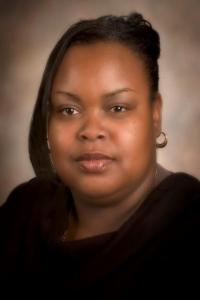 The Department of Sociology is pleased to announce that Dr. La Fleur F. Small will become the director of the Applied Behavioral Sciences M.A. program at Wright State University. She earned a Ph.D. from the University of Miami in Medical Sociology and Epidemiology and holds a joint appointment in the Department of Sociology and Anthropology and the Department of Geriatrics in the Boonshoft School of Medicine.
The Department of Sociology is pleased to announce that Dr. La Fleur F. Small will become the director of the Applied Behavioral Sciences M.A. program at Wright State University. She earned a Ph.D. from the University of Miami in Medical Sociology and Epidemiology and holds a joint appointment in the Department of Sociology and Anthropology and the Department of Geriatrics in the Boonshoft School of Medicine.
Dr. Small teaches undergraduate and graduate courses that focus on medical sociology, special topics in health, demography, sociology of the family, and applied methodology, and her research areas focus on health care utilization and vulnerable health populations. Dr. Small holds several appointments on editorial boards of social science and health journals including the Journal of HIV for Clinical and Scientific Research and Health Care.
Congratulations once again to Dr. La Fleur on this achievement and for her excellent service!
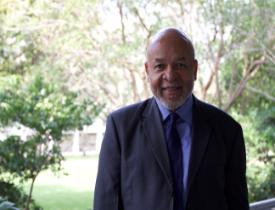 The Department of Sociology congratulates Dr. Braddock on being selected as a Fellow for the 2016 American Educational Research Association (AERA)! The American Educational Research Association (AERA) is the largest national interdisciplinary research association devoted to the scientific study of education and learning. Founded in 1916, AERA advances knowledge about education, encourages scholarly inquiry related to education, and promotes the use of research to improve education and serve the public good.
The Department of Sociology congratulates Dr. Braddock on being selected as a Fellow for the 2016 American Educational Research Association (AERA)! The American Educational Research Association (AERA) is the largest national interdisciplinary research association devoted to the scientific study of education and learning. Founded in 1916, AERA advances knowledge about education, encourages scholarly inquiry related to education, and promotes the use of research to improve education and serve the public good.
AERA Fellows exemplify the highest standards of excellence through accomplishment, profressionalism, and commitment. This honor was awarded to 22 individuals this year on the basis of their notable and sustained research achievements. Dr. Braddock was nominated for this award by his fellow peers, which was chosen by the AERA Fellow Committee and approved by the AERA Council. Congratulations, Dr. Braddock on receiving such an honorable distinction for your commitment to the study of education and learning!
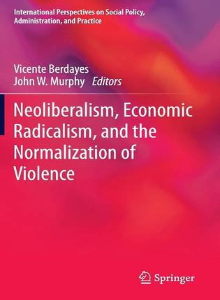 Congratulations to Dr. John W. Murphy (University of Miami) and co-editor Dr. Vicenete Berdayes (Barry University) on their recent publication, Neoliberalism, Economic Radicalism, and the Normalization of Violence. The book analyzes the wide-scale societal impact of neoliberal economic policy on contemporary life and behavior. Synthesizing multiple perspectives, they argue that market-driven public institutions promote antisocial thinking, discourage critical reflection, and inure individuals to inequity and cruelty. Chapters cite the ubiquity of violence in modern society, from the marketing of the military to impersonal mass upheavals in the job market, as devauling human worth and thus self-worth. The editors also assert that these currents are not terminal, and the book concludes by identifying conditions potentially leading to a more civil and egalitarian future.
Congratulations to Dr. John W. Murphy (University of Miami) and co-editor Dr. Vicenete Berdayes (Barry University) on their recent publication, Neoliberalism, Economic Radicalism, and the Normalization of Violence. The book analyzes the wide-scale societal impact of neoliberal economic policy on contemporary life and behavior. Synthesizing multiple perspectives, they argue that market-driven public institutions promote antisocial thinking, discourage critical reflection, and inure individuals to inequity and cruelty. Chapters cite the ubiquity of violence in modern society, from the marketing of the military to impersonal mass upheavals in the job market, as devauling human worth and thus self-worth. The editors also assert that these currents are not terminal, and the book concludes by identifying conditions potentially leading to a more civil and egalitarian future.
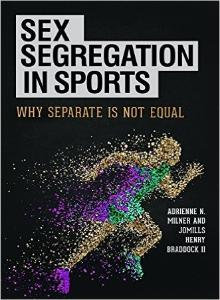 Congratulations to Adrienne N. Milner, Ph.D., and Jomills Henry Braddock, Ph.D., on their recent publication titled, “Sex Segregation in Sports: Why Separate Is Not Equal.” Dr. Braddock is currently a Sociology professor at the University of Miami and Dr. Milner is an assistant professor of Sociology at the University of Alabama and received her Ph.D. from UM! This book examines the controversial issue of sex segregation in sports, arguing that "separate but equal" is neither achievable nor constitutional.
Congratulations to Adrienne N. Milner, Ph.D., and Jomills Henry Braddock, Ph.D., on their recent publication titled, “Sex Segregation in Sports: Why Separate Is Not Equal.” Dr. Braddock is currently a Sociology professor at the University of Miami and Dr. Milner is an assistant professor of Sociology at the University of Alabama and received her Ph.D. from UM! This book examines the controversial issue of sex segregation in sports, arguing that "separate but equal" is neither achievable nor constitutional.
It makes use of both current and historical information to support the argument for sex integration in sports, and examines the interconnection between sex and race as social constructions and considers their impact on inequities in sports. Both legal and social arguments, as well as empirical evidence, are presented in calling for gender integration in sports. In debunking conventional legal, biological, and social justifications of sex segregation, this book truly sheds light on the many potential benefits of equal opportunities which would result from eliminating both gender and racial segregation.
 Professor Alejandro Portes will be inducted into the National Academy of Education in Washington D.C. on October 30-31st. He is one of sixteen elected to membership into this highly prestigious organization.
Professor Alejandro Portes will be inducted into the National Academy of Education in Washington D.C. on October 30-31st. He is one of sixteen elected to membership into this highly prestigious organization.
Professor Portes was elected on the basis of outstanding scholarship. He is Professor of Sociology and Law at the University of Miami and Professor Emeritus at Princeton University. He is the author of 250 articles and chapters on national development, international migration, Latin American and Caribbean urbanization, and economic sociology. He has published nearly 40 books and special issues. His books include City on the Edge – the Transformation of Miami (California 1993), co-authored with Alex Stepick and winner of the Robert Park Award for best book in urban sociology and the Anthony Leeds Award for best book in urban anthropology in 1995; and Immigrant America: A Portrait, 3rd edition, (California 2006), designated as a Centennial Publication by the University of California Press in 1996.
His current research is on the adaptation process of the immigrant second generation in comparative perspective, the role of institutions on national development, and immigration and the American health system.
Original posting from Miami Law
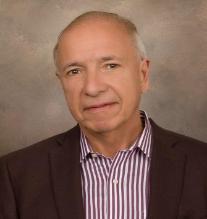 We are pleased to announce the publication of a new book by Dr. Alejandro Portes, who holds joint faculty appointments at the University of Miami and Princeton University. Whereas most of the literature on migration focuses on individuals and their families, "The State and Grassroots: Immigrat Transnational Organizations on Four Continents," studies the organizations created by immigrants to protect themselves in their receiving states.
We are pleased to announce the publication of a new book by Dr. Alejandro Portes, who holds joint faculty appointments at the University of Miami and Princeton University. Whereas most of the literature on migration focuses on individuals and their families, "The State and Grassroots: Immigrat Transnational Organizations on Four Continents," studies the organizations created by immigrants to protect themselves in their receiving states.
Comparing eighteen of these grassroots organizations formed across the world, from India to Colombia to Vietnam to the Congo, researchers from the United States, Belgium, France, the Netherlands, and Spain focus their studies on the internal structure and activities of these organizations as they relate to developmental initiatives.
The book outlines the principal positions in the migration and development debate and discusses the concept of transnationalism as a means of resolving these controversies. To learn more about the book, click here.
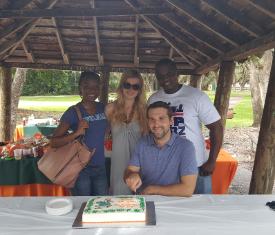 The Department of Sociology would like to extend a warm welcome to Dr. Nick Petersen and our three new graduate students! We are delighted to be welcoming such talented individuals to our department. We are thrilled to commence a new year with such distinguished and diverse additions to the department and cannot wait to see what lies ahead this upcoming year at the U!
The Department of Sociology would like to extend a warm welcome to Dr. Nick Petersen and our three new graduate students! We are delighted to be welcoming such talented individuals to our department. We are thrilled to commence a new year with such distinguished and diverse additions to the department and cannot wait to see what lies ahead this upcoming year at the U!
Dr. Petersen hold a Ph.D. from the University of California, Irvine and his research primarily focuses on issues related to criminology, law & society, and racial stratification.
Shameka Thomas graduated from Spelman College with a Masters and has declared Medical Sociology and Race & Ethnic Relations as her areas of concentration. She is interested in exploring maternal-infant health and her hobbies include ballet and poetry.
Tebogo Sebeelo comes from Botswana, Africa and will be concentrating in Medical Sociology. He is attracted to the multiple facets of health programs and loves all types of sports.
Anastasiia (Stacy) Kuptsevych joins the department all the way from Ukraine, after completing her Masters in Minnesota. She plans to focus her studies in the areas of Criminology and Race & Ethnic Relations. She is intrigues by causes of crime and is fond of playing the piano and acting in her free time.
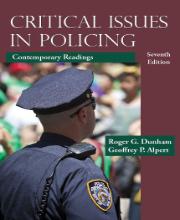 "Critical Issues in Policing" offers fresh perspective and research on the most current trends in policing. Its comprehensive and balanced coverage provides access to the brightest and best minds in the field of policing, and encourages readers to hold the police accountable for specific goals, tasks, and objectives. Also it encourages the police to work in concert with citizens to promote secure communities and protect the legal rights of citizens.
"Critical Issues in Policing" offers fresh perspective and research on the most current trends in policing. Its comprehensive and balanced coverage provides access to the brightest and best minds in the field of policing, and encourages readers to hold the police accountable for specific goals, tasks, and objectives. Also it encourages the police to work in concert with citizens to promote secure communities and protect the legal rights of citizens.
 The department would like to congratulate Dr. Anwesa Chatterjee for successfully defending her dissertation and earning her Ph.D. Dr. Chatterjee's dissertation, "Gaining Insight Into the Meaning of Complementary/Alternative Healing Among Chronically Ill Individuals" attempts to understand the meaning and experience of using complementary/alternative healing among chronically ill individuals. She approached this project from a symbolic interactionist standpoint and used grounded theory methodology to collect and analyze data. This project was based in Miami where she conducted interviews with 16 women and 5 men with varied chronic illnesses/conditions and using other healing options outside of regular allopathic medicine. She would like to thank her Dissertation Committee, Chair Dr. Linda L. Belgrave, and Committee Members - Dr. Marvin P. Dawkins, Dr. Crystal Adams, and Dr. Doris N. Ugarriza. Congratulations, Dr. Chatterjee!
The department would like to congratulate Dr. Anwesa Chatterjee for successfully defending her dissertation and earning her Ph.D. Dr. Chatterjee's dissertation, "Gaining Insight Into the Meaning of Complementary/Alternative Healing Among Chronically Ill Individuals" attempts to understand the meaning and experience of using complementary/alternative healing among chronically ill individuals. She approached this project from a symbolic interactionist standpoint and used grounded theory methodology to collect and analyze data. This project was based in Miami where she conducted interviews with 16 women and 5 men with varied chronic illnesses/conditions and using other healing options outside of regular allopathic medicine. She would like to thank her Dissertation Committee, Chair Dr. Linda L. Belgrave, and Committee Members - Dr. Marvin P. Dawkins, Dr. Crystal Adams, and Dr. Doris N. Ugarriza. Congratulations, Dr. Chatterjee!
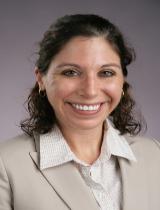 The Department of Sociology would like to extend a warm congratulations to Dr. Karie Peralta. Dr. Peralta earned her Ph.D. from our department in May 2015 and recently accepted a tenure-track, Assistant Professor in the Department of Sociology and Anthropology at the University of Toledo beginning this Fall. Her research will focus on community-based approaches to addressing local urban issues in Toledo and the Dominican Republic. She will be teaching courses that are part of the Sociology and Urban Studies programs such as, "Sociology of Organizations" and "Communities." Karie is originally from Indiana and is happy to be returning to the Mid-west. She is thankful for her graduate training in the Department of Sociology at the University of Miami and especially appreciative of the support she received from her fellow graduate students, Teresa Amador, Dr. John Murphy, Dr. George Wilson, Dr. Marvin Dawkins, and Dr. Crystal Adams. Congratulations, Dr. Peralta!
The Department of Sociology would like to extend a warm congratulations to Dr. Karie Peralta. Dr. Peralta earned her Ph.D. from our department in May 2015 and recently accepted a tenure-track, Assistant Professor in the Department of Sociology and Anthropology at the University of Toledo beginning this Fall. Her research will focus on community-based approaches to addressing local urban issues in Toledo and the Dominican Republic. She will be teaching courses that are part of the Sociology and Urban Studies programs such as, "Sociology of Organizations" and "Communities." Karie is originally from Indiana and is happy to be returning to the Mid-west. She is thankful for her graduate training in the Department of Sociology at the University of Miami and especially appreciative of the support she received from her fellow graduate students, Teresa Amador, Dr. John Murphy, Dr. George Wilson, Dr. Marvin Dawkins, and Dr. Crystal Adams. Congratulations, Dr. Peralta!
 The department would like to recognize Dr. Isabelle Beulaygue for successfully defending her dissertation and earning her Ph.D. Dr. Beulaygue's dissertation offers a novel bio-psycho-social perspective to the study of adolescent stress and adolescent self-perceived development. Grounded in several theoretical paradigms - the stress process, the life-course, and objectification theory - Dr. Beulaygue hypothesized that the way adolescents perceive their changing bodies is experienced as a powerful stressor, giving rise to harmful health consequences during emerging adulthood. Utilizing data from Waves I, III, and IV of Add Health, Dr. Beulaygue constructed a composite index of self-perceived body development during adolesence and examined its impact on four health outcomes during emerging adulthood: 1) self-rated health, 2) depression, 3) the likelihood of seeking psychological counseling, and 4) Body Mass Index (BMI). After performing numerous regression models and testing for robustness, results from this study indicated that there was a statistically significant relationship between self-perceived body development and adult health among women, but not among men. Specifically, girls with greater scores on the self-perceived body development index were less likely to report excellent self-rated health, were more likely to have been diagnosed with depression in their lifetime, had higher scores on the CES-D depression scale, a greater probability of seeking psychological counseling, and reported higher BMIs during emerging adulthood. These results are an important contribution to the literature and carry numerous health policy implication, as they demonstrate that perceived bodily changes during adolescence represent tangible social stressors and important risk factors for women's adult health. Her dissertation committee was chaired by Michael T. French, Ph.D., with members Robert J. Johnson, Ph.D., Olena P. Antonaccio, Ph.D., Philip K. Robins, Ph.D., and Theodore Ganiants, M.D. Congratulations, Dr. Beulaygue!
The department would like to recognize Dr. Isabelle Beulaygue for successfully defending her dissertation and earning her Ph.D. Dr. Beulaygue's dissertation offers a novel bio-psycho-social perspective to the study of adolescent stress and adolescent self-perceived development. Grounded in several theoretical paradigms - the stress process, the life-course, and objectification theory - Dr. Beulaygue hypothesized that the way adolescents perceive their changing bodies is experienced as a powerful stressor, giving rise to harmful health consequences during emerging adulthood. Utilizing data from Waves I, III, and IV of Add Health, Dr. Beulaygue constructed a composite index of self-perceived body development during adolesence and examined its impact on four health outcomes during emerging adulthood: 1) self-rated health, 2) depression, 3) the likelihood of seeking psychological counseling, and 4) Body Mass Index (BMI). After performing numerous regression models and testing for robustness, results from this study indicated that there was a statistically significant relationship between self-perceived body development and adult health among women, but not among men. Specifically, girls with greater scores on the self-perceived body development index were less likely to report excellent self-rated health, were more likely to have been diagnosed with depression in their lifetime, had higher scores on the CES-D depression scale, a greater probability of seeking psychological counseling, and reported higher BMIs during emerging adulthood. These results are an important contribution to the literature and carry numerous health policy implication, as they demonstrate that perceived bodily changes during adolescence represent tangible social stressors and important risk factors for women's adult health. Her dissertation committee was chaired by Michael T. French, Ph.D., with members Robert J. Johnson, Ph.D., Olena P. Antonaccio, Ph.D., Philip K. Robins, Ph.D., and Theodore Ganiants, M.D. Congratulations, Dr. Beulaygue!
2014 - 2015 Departmental Undergraduate Award Recipients
Haley Edwards, Alvin Rose Award awarded to an outstanding undergraduate sociology major, in honor of Dr. Alvin W. Rose, chair of the Department of Sociology from 1977 to 1979.
Laura Frizzell, Bryce Finley Ryan Award for Academic Excellence in Criminology, awarded to an outstanding undergraduate criminology major, in honor of Dr. Bryce Finley Ryan, chair of the Department of Sociology from 1957 to 1977.
Brian Malcolm, Alpha Kappa Delta, Sociology International Honor Society Award, awarded to an outstanding graduating Sociology major and AKD member.
Brianna Blair, Alpha Phi Sigma, National criminal justice honor society award for outstanding graduating Criminology major and APS member.
George Wilson publishes lead article, “Racial Wage Inequality and Public Sector Privatization”, in May 2015 issue of Social Problems. A link for an interview with Professor Wilson on the Social Problems website about the article is below:
http://socpro.oxfordjournals.org/content/authors-attic
This piece discusses the impact of changing work conditions and status of workers in the public sector on evolving patterns of inequality in wages. As the public sector has experienced increasing forms of privatization, enhanced managerial discretion and diminished opportunities for workers to invoke equal opportunity protections has led to a broadening of wage gaps between Whites and African Americans so that the public sector is increasingly coming to resemble the private sector after a several decade period in which African Americans achieved relative parity in wages with Whites.
 Karie Peralta, Ph.D.
Karie Peralta, Ph.D.
Committee: Dr. John Murphy, Dr. George Wilson, Dr. Crystal Adams, and Dr. Scot Evans
Karie Peralta recently defended her dissertation titled, “Rethinking Community-based Participatory Research in Light of Community-based Philosophy: From Principles to Practice.” Her work is a theoretical investigation of community membership, the co-construction of local knowledge, and community engagement. She incorporates her reflection on these issues using illustrative examples from a participatory project that she conducted in collaboration with a non-profit organization in the Dominican Republic.
 Rob Cancio, M.A.
Rob Cancio, M.A.
Committee: Dr. Linda Liska Belgrave, Dr. Crystal Adams, and Dr. Monica Webb Hooper
Rob Cancio recently defended his thesis titled, "The Pain of Combat for Mexican-American Veterans: A Cohort Analysis of Vietnam and Iraq/Afghanistan Veterans,” which explores emotional and physical pain from the subjective point of view of Mexican-American veterans exposed to combat experiences in the military.
 Sami Polenberg, M.A.
Sami Polenberg, M.A.
Committee: Dr. Amie Nielsen, Dr. Marisa Omori, and Dr. Bryan Page
Sami Polenberg recently defended her thesis titled, “Factors Affecting Success and Failure Among Drug Court Participants in the United States: An Examination of Program Completion and Post-Program Outcomes,” which observes the effectiveness of drug courts in producing positive outcomes for participants. Using data from the Multi-Site Adult Drug Court Evaluation (MADCE), this study evaluated whether drug court participants have lower rates of relapse, recidivism, and re-arrest than non-participants. This study also evaluated factors which may affect success and failure among participants and post-program outcomes, including age, race/ethnicity, gender, social support, treatment motivation, and substance use history.
Student Presentations at the annual meetings of the Southern Sociological Society
March, 2015
New Orleans, LA
Graduate Student Presentations
six presentations, for a total of ten students
Roberto Cancio. 2015. "Dream Act: What's Healthier for Hispanics: Military Service or Going to College?" Presentation at the Annual Meeting for the Southern Sociological Society. New Orleans, LA.
Dahab, Ramsey and Felecia Theune. 2015. "Sacking for Dollars: The Commodification of Revenue Producing Athletes through Clustering." Presentation at the Southern Sociological Society 78th Annual Meeting, New Orleans, LA, March.
Harder, Brittany. 2015. "Obesity A Disease? How the Rejection of Weight Labels Can Influence the Diagnosis, Treatment, and Compliance in Obesity." Presented at the Annual Meeting for the Southern Sociological Society. New Orleans, LA.
Lautenschlager, Rachel and Kapriskie Seide. 2015. "Monster Moms: the Public's Perception on Maternal Filicide." Poster Presentation at The 78th Annual Meeting of the Southern Sociological Society. New Orleans, LA.
Louderback, Eric, Armando Torres and Kerstin Ledesma. 2015. “Advertisement and Sexism: An Index to Measure the Degree of Sexism in Popular Commercials.” Presented at the Southern Sociological Society 78th Annual Meeting, March 25-28, New Orleans, LA.
Polenberg, Sami. 2015. "Thoughtfully Reflective Decision Making and Delinquency: How do Parental Attachment and Family Strain Matter?" Paper presented at the annual meeting of the Southern Sociological Society, March 26, New Orleans, LA.
Undergraduate Student Presentations
two presentations, for a total of two students
Slawski, G. and Braddock, J. 2015. “Diversity and Social Capital of Black Neighborhoods in Miami-Dade County.” Presentation at the annual meetings of the Southern Sociological Society, New Orleans, LA. March.
(Grace Slawski is an undergraduate student mentored by Dr. Braddock on a CAS Beyond the Book Summer Research Award. This paper is an extension of that research)
Edwards, H. and Braddock, J. 2015. “Perceived Discrimination: An Intersectional Analysis of the Influence of Race, Gender, and Social Class.” Presentation at the annual meetings of the Southern Sociological Society, New Orleans, LA. March
(Haley Edwards is an undergraduate student mentored by Dr. Braddock on a CAS Beyond the Book Summer Research Award. That research experience led to Ms. Edwards Senior Honors Thesis upon which this paper is based)
Professors Michael T. French (University of Miami) and Gulcin Gumus (Florida Atlantic University) recently published their research on spring breaks and traffic fatalities. Using data from 1982 to 2011, they find that, at popular spring break destinations, there is a significant spike in traffic fatalities during the spring break season. The authors offer some simple and inexpensive policy suggestions for local governments to reduce the impact. Their article was published this year in Economic Inquiry and media coverage included National Public Radio, Washington Post, The Guardian, Time, and US News and World Report.
“The Dangerous Distractions of Spring Break,” Interview with Shankar Vedantam, National Public Radio – March 18, 2015. http://www.npr.org/2015/03/18/393748230/the-dangerous-distractions-of-spring-break
“Here’s Your Annual Reminder to Be Careful During Spring Break,” The Washington Post – March 19, 2015. http://www.washingtonpost.com/news/grade-point/wp/2015/03/19/heres-your-annual-reminder-to-be-careful-on-spring-break/
“Road to Perdition: Science Proves That Spring Break Is Deadly for Drivers,” The Guardian – March 18, 2015. http://www.theguardian.com/us-news/2015/mar/18/spring-break-driving-traffic-fatalities-study
“The Percentage Increase in Traffic Deaths During Spring Break Will Shock You,” Time – March 20, 2015. http://time.com/3750449/spring-break-traffic-accidents-cars-alcohol-death/
“Traffic Deaths Increase in Spring Break Hot Spots,” US News and World Report – March 20, 2015. http://health.usnews.com/health-news/articles/2015/03/20/traffic-deaths-increase-in-spring-break-hot-spots
“Study Says Traffic Deaths Rise During Spring Break,” Tristatehomepage.com – March 20, 2015. http://www.tristatehomepage.com/story/d/story/study-says-traffic-deaths-rise-during-spring-break/23465/S0LmPDiJwkuVWz5e9YnbfA
“Traffic Fatalities Spike During Spring Break,” Health Central – March 20, 2015. http://www.healthcentral.com/dailydose/cf/2015/03/19/traffic_fatalities_spike_during_spring_break
“Traffic Deaths Increase in Spring Break Hot Spots,” Philly.com – March 20, 2015. http://www.philly.com/philly/health/topics/HealthDay697606
_20150320_Traffic_Deaths_Increase_in_Spring_Break_Hot_Spots.html
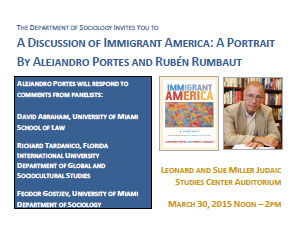
The Department of Sociology invites you to
A DISCUSSION OF IMMIGRANT AMERICA: A PORTRAIT BY ALEJANDRO PORTES AND RUBÉN RUMBAUT
Leonard and Sue Miller Judaic Studies Center Auditorium
March 30, 2015 12pm – 2pm
Read more
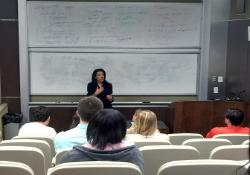 As a part of courses taught by professors in the department, nationally and locally prominent guest speakers are invited to speak about pertinent topics with real would examples of sociology in action. Last week, the department was gracious to have the opportunity to host Miami Dade County Circuit Court Judge Beatrice A. Butchko in a Business and Society (SOC 351) class taught by Dr. Michael French. Judge Butchko obtained her Juris Doctorate at DePaul University College of Law and has served as the Circuit Court Judge in the Civil Division of the Eleventh Judicial Circuit Court of Florida since 2011. During her tenure as judge in this capacity and previously in the Office of the State Attorney of Florida, she has tried 82 jury trials in both civil and criminal cases. Her guest lecture focused on the mortgage foreclosure crisis, which she analyzed from a judicial, social, ethical and economic perspective. In addition, she related her past personal experiences as a dependency court judge to broader themes in the class, grounding her real world experience in sociological concepts.
As a part of courses taught by professors in the department, nationally and locally prominent guest speakers are invited to speak about pertinent topics with real would examples of sociology in action. Last week, the department was gracious to have the opportunity to host Miami Dade County Circuit Court Judge Beatrice A. Butchko in a Business and Society (SOC 351) class taught by Dr. Michael French. Judge Butchko obtained her Juris Doctorate at DePaul University College of Law and has served as the Circuit Court Judge in the Civil Division of the Eleventh Judicial Circuit Court of Florida since 2011. During her tenure as judge in this capacity and previously in the Office of the State Attorney of Florida, she has tried 82 jury trials in both civil and criminal cases. Her guest lecture focused on the mortgage foreclosure crisis, which she analyzed from a judicial, social, ethical and economic perspective. In addition, she related her past personal experiences as a dependency court judge to broader themes in the class, grounding her real world experience in sociological concepts.
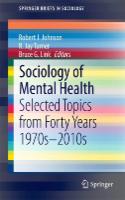 The Department of Sociology would like to congratulate Dr. Johnson on his recent publication titled, “Sociology of Mental Health Selected Topics from Forty Years 1970s-2010s”. This book discusses, at length, the history of mental health and highlights the recent strides in research made within this field. The preface of the book is written by Professor Michael Hughes, the former chair of the ASA Mental Health Section. To learn more about the publication, please click the following link: http://www.springer.com/social+sciences/book/978-3-319-07796-3
The Department of Sociology would like to congratulate Dr. Johnson on his recent publication titled, “Sociology of Mental Health Selected Topics from Forty Years 1970s-2010s”. This book discusses, at length, the history of mental health and highlights the recent strides in research made within this field. The preface of the book is written by Professor Michael Hughes, the former chair of the ASA Mental Health Section. To learn more about the publication, please click the following link: http://www.springer.com/social+sciences/book/978-3-319-07796-3
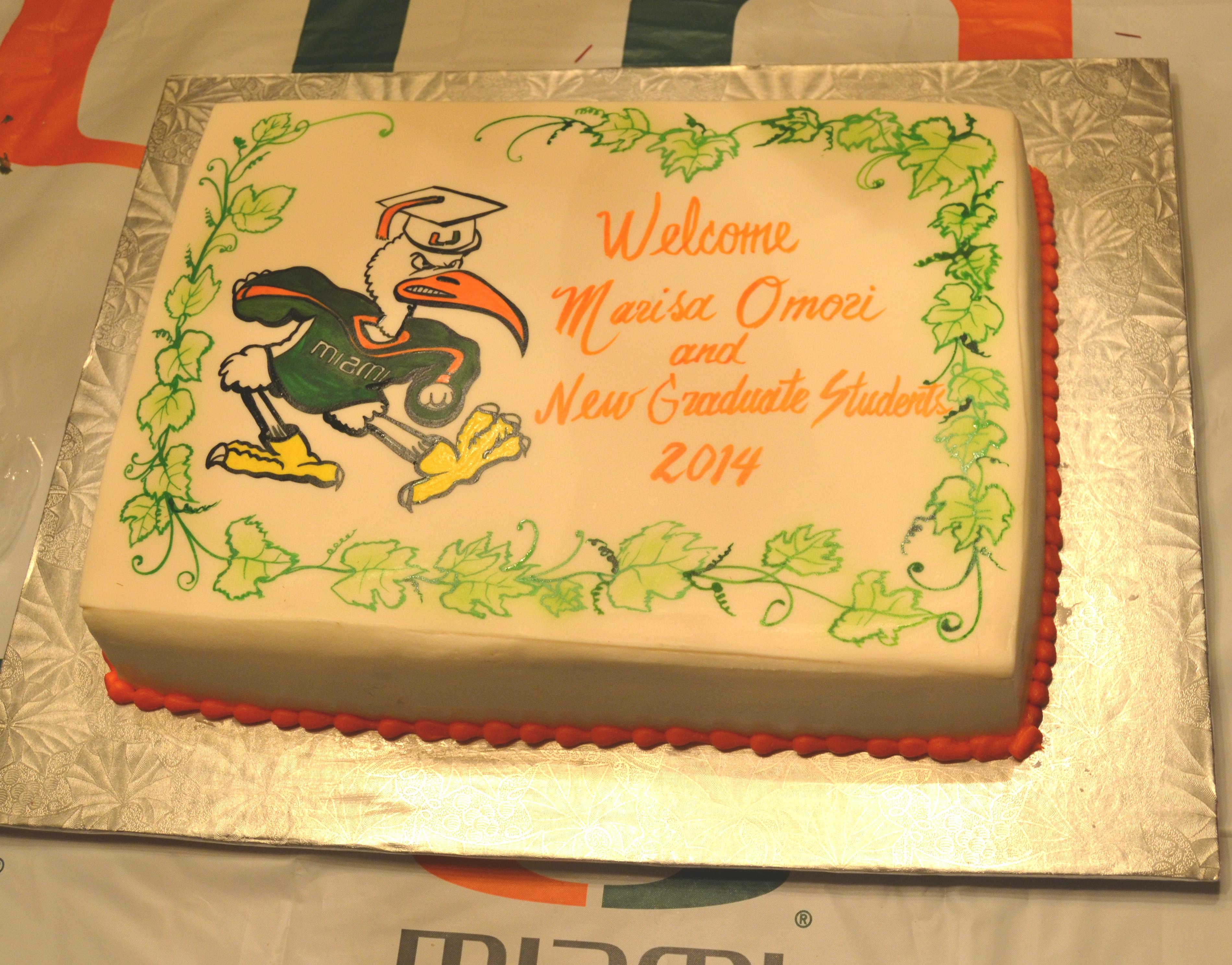 On behalf of the Department of Sociology, we would like to extend a sincere welcome to our new faculty member, Dr. Omori, as well as to the five (5) new Graduate students. The Department is extremely pleased to have such a diverse and well-rounded group of individuals joining us here at the University! We are incredibly fortunate to have all of you join us this year and look forward to the many wonderful things yet to come!
On behalf of the Department of Sociology, we would like to extend a sincere welcome to our new faculty member, Dr. Omori, as well as to the five (5) new Graduate students. The Department is extremely pleased to have such a diverse and well-rounded group of individuals joining us here at the University! We are incredibly fortunate to have all of you join us this year and look forward to the many wonderful things yet to come!
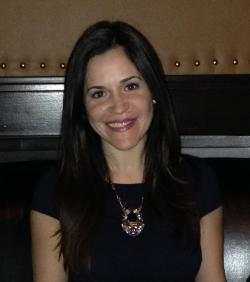 Dr. Adrienne Celaya recently successfully defended her dissertation and completed her Ph.D. in Sociology at the University of Miami. While at UM, Dr. Celaya’s two areas of specialization were criminology and race/ethnic relations, with a specific concentration on family violence. Her overall research interests involve issues surrounding minorities and immigrant populations, and their larger implications in the criminal justice system, the provision of social services, and the political practices of the state. Adrienne’s dissertation titled "Safe Havens or Danger Zones?: A Multilevel Examination of Immigration, Community and Intimate Partner Violence" examined the impact of nativity status and neighborhood immigrant concentration on IPV types, net of the effects of individual, couple and neighborhood factors, and incorporated social disorganization theory as a major theoretical framework.
Dr. Adrienne Celaya recently successfully defended her dissertation and completed her Ph.D. in Sociology at the University of Miami. While at UM, Dr. Celaya’s two areas of specialization were criminology and race/ethnic relations, with a specific concentration on family violence. Her overall research interests involve issues surrounding minorities and immigrant populations, and their larger implications in the criminal justice system, the provision of social services, and the political practices of the state. Adrienne’s dissertation titled "Safe Havens or Danger Zones?: A Multilevel Examination of Immigration, Community and Intimate Partner Violence" examined the impact of nativity status and neighborhood immigrant concentration on IPV types, net of the effects of individual, couple and neighborhood factors, and incorporated social disorganization theory as a major theoretical framework.
She hopes to continue her research on family violence and immigration at Northern Arizona University's Family Violence Institute, where she has just accepted a two-year post-doctoral fellowship. Adrienne stated that, “My professional and academic experiences have intensified my commitment to the issue of family violence and the role that culture plays in the construction of this significant social problem.” More recently, the opportunity to work under the guidance of Dr. Alejandro Portes has reinforced her interest in immigrant populations and their needs, and more specifically, second generation trajectories as they relate to criminal involvement and victimization. Dr. Adrienne Celaya’s future research plans remain in these areas, and include program and policy analysis.
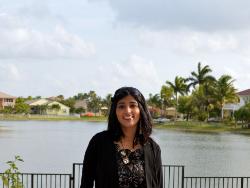 Dr. Bisma Sayed, a Department of Sociology doctoral student, recently defended her Ph.D. dissertation and accepted a highly competitive fellowship at the Centers for Disease Control and Prevention (CDC). The Prevention Effectiveness Fellowship (PEF) provides training in decision analysis, health policy, and healthcare research. As a PEF fellow, Bisma will work in the Division of Global Migration and Quarantine. She will conduct quantitative research in the areas of preventive health service delivery, health policy, and health-related burden of disease, looking specifically at how current health policy recommendations and practices shape the health of specific populations.
Dr. Bisma Sayed, a Department of Sociology doctoral student, recently defended her Ph.D. dissertation and accepted a highly competitive fellowship at the Centers for Disease Control and Prevention (CDC). The Prevention Effectiveness Fellowship (PEF) provides training in decision analysis, health policy, and healthcare research. As a PEF fellow, Bisma will work in the Division of Global Migration and Quarantine. She will conduct quantitative research in the areas of preventive health service delivery, health policy, and health-related burden of disease, looking specifically at how current health policy recommendations and practices shape the health of specific populations.
Bisma explained that, “The quantitative training I received at the University of Miami’s Department of Sociology and the Health Economics Research Group made me competitive for this fellowship, and I am very excited about this opportunity!” Indeed, the fellowship is an ideal fit with Bisma’s research interests and training in medical sociology and statistics. The fellowship’s focus on prevention is a natural extension of Bisma’s dissertation, which examines how macroeconomic and social conditions affect individuals’ use of clinical preventive services. This fellowship will allow her to collaborate with public health experts to improve our understanding of preventive healthcare in the United States. Moreover, it will allow her to play a key role in setting prevention priorities in the U.S.
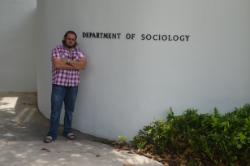 Christian A. Schlaerth successfully defended his dissertation “Community-Based Philosophy and Service-Learning: A Case Study at Barry University.” His research focuses on elements of a community-based philosophy and how they are compatible with a successful service-learning program. Mr. Schlaerth chose Barry University as the setting for his research because he has been an instructor there since 2007. The study consisted of 25 in-depth interviews, including 15 faculty members and 10 students, which were guided by an ethnomethodological background and informed by constructionism. In the interviews, participants exposed different flaws about how service-learning is practiced at Barry. The research findings can be used to develop policy recommendations to be adopted by Barry or other institutions of higher learning that want to have successful, community-based service-learning programs. His committee consisted of Drs. John W. Murphy (chair) and Roger Dunham from the Department of Sociology, Laura Kohn-Wood from Educational Psychology, and Victor Romano, from the Department of Sociology at Barry University.
Christian A. Schlaerth successfully defended his dissertation “Community-Based Philosophy and Service-Learning: A Case Study at Barry University.” His research focuses on elements of a community-based philosophy and how they are compatible with a successful service-learning program. Mr. Schlaerth chose Barry University as the setting for his research because he has been an instructor there since 2007. The study consisted of 25 in-depth interviews, including 15 faculty members and 10 students, which were guided by an ethnomethodological background and informed by constructionism. In the interviews, participants exposed different flaws about how service-learning is practiced at Barry. The research findings can be used to develop policy recommendations to be adopted by Barry or other institutions of higher learning that want to have successful, community-based service-learning programs. His committee consisted of Drs. John W. Murphy (chair) and Roger Dunham from the Department of Sociology, Laura Kohn-Wood from Educational Psychology, and Victor Romano, from the Department of Sociology at Barry University.
Mr. Schlaerth graduated in May 2014 and is currently seeking employment in the South Florida area.
 Faculty Member Receives Several Research Grants from NIH
Faculty Member Receives Several Research Grants from NIH
The National Institutes of Health (NIH) recently awarded Dr. Michael T. French, a health economist and professor in the Department of Sociology, three research grants. “Web-based CBT for Substance Misusing and PTSD Symptomatic OEF/OIF Veterans” (AA020181) is a collaborative effort with investigators at NDRI, Syracuse University, and two VA treatment centers. “Florida Node Alliance of the Drug Abuse Clinical Trials Network” (DA013720) is a multi-site study being led by faculty in the Department of Public Health Sciences at the Miller School of Medicine. For “Economic Evaluation of Recovery Management Checkups for Women Offenders (RMC-WO)” (DA031785), Professors French and McCollister (Department of Public Health Sciences) are collaborating with colleagues at the Lighthouse Institute in Chicago, Illinois. Much of Dr. French’s research involves faculty, graduate students, and undergraduate research assistants affiliated with the Health Economics Research Group (HERG) in the Department of Sociology (www.miami.edu/herg).
Professor John W. Murphy Publishes Book
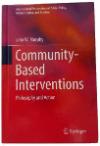 Professor John W. Murphy recently published a book, Community-Based Interventions: Philosophy and Actions (Springer 2014). [From publisher] Community-Based Interventions examines the reasons community programs tend to founder, and proposes a realistic framework for sustained success. The book’s theoretical, philosophical, and political foundations begin with the importance of context, as in local knowledge and community self-definition and engagement. Innovative, often startling approaches to planning, design and implementation begin with the recognition that communities are not “targets” or “locations” to be “fixed,” but social realities whose issues require concrete answers. The variety of examples described in these chapters demonstrate the power of community interventions in providing effective services, reducing inequalities, and giving individuals greater control over their health, their environment, and, in the long run, their lives. Attuned to the current era of health and mental health reform, Community-Based Interventions represents a major step forward in its field, and makes an inspiring text for social workers, clinical social workers, public health administrators, and community activists.
Professor John W. Murphy recently published a book, Community-Based Interventions: Philosophy and Actions (Springer 2014). [From publisher] Community-Based Interventions examines the reasons community programs tend to founder, and proposes a realistic framework for sustained success. The book’s theoretical, philosophical, and political foundations begin with the importance of context, as in local knowledge and community self-definition and engagement. Innovative, often startling approaches to planning, design and implementation begin with the recognition that communities are not “targets” or “locations” to be “fixed,” but social realities whose issues require concrete answers. The variety of examples described in these chapters demonstrate the power of community interventions in providing effective services, reducing inequalities, and giving individuals greater control over their health, their environment, and, in the long run, their lives. Attuned to the current era of health and mental health reform, Community-Based Interventions represents a major step forward in its field, and makes an inspiring text for social workers, clinical social workers, public health administrators, and community activists.
Faculty Members Conduct a Community-Based Health Project in Grenada
Drs. John W. Murphy and Crystal Adams, in collaboration with partners from Barry University, San Diego State University, and Grenada, are conducting a community-based health project in the village of St. Mark, Grenada. This project has three elements. The first includes a community health assessment, which will be conducted to gather information about the prevalence of health problems, identify the most important health needs, and guide future actions in St. Mark. Second, the project will implement a culturally appropriate breast health awareness-training program, which will be informed by the results of the health assessment. This training program will educate Lay Community Health Workers (LCHW) in breast health and train LCHWs to teach women in the St. Mark community how to conduct breast self-exams. It is expected that a total of 480 women in the St. Mark village will receive breast health education and will begin performing monthly breast self-examinations. Lastly, this program strives to create a support system between the women in St. Mark, the LCHWs, and the health care system. For more information, please visit www.stmarksproject.org/.
 Dr. Crystal Adams Joins Department as an Assistant Professor
Dr. Crystal Adams Joins Department as an Assistant Professor
The Department of Sociology enthusiastically welcomes Dr. Crystal Adams into the department. Her primary research interests are in the areas of medical sociology, community-based participatory research, health promotion, and health policy. Broadly, she is interested in cultural health identities and their role in community social change efforts. She has published in a variety of venues, including the Annual Review of Sociology, the Journal of Health and Social Behavior, and the Handbook of Medical Sociology. Her teaching interests lie in the areas of medical sociology, health disparities, and community based research, and she will be teaching at both the undergraduate and graduate levels. Dr. Adams earned her PhD in Sociology from Brown University, her MPH from the Harvard School of Public Health, and her BA from Texas A&M University.
Student Successfully Defends Dissertation and Receives Her PhD.
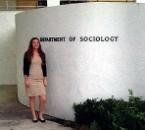 Congratulations to Berkeley Franz, who recently received her PhD in Sociology. Berkeley’s dissertation, “Far as the Curse is Found: Evangelical Protestants and the Affordable Care Act” draws from her two areas of specialization—Sociology of Religion and Medical Sociology—to explore the ways evangelical protestants understand health and healthcare. Dr. Franz applies a phenomenological approach complemented with grounded theory to understand how religious theology influences beliefs about social change. Through twenty-nine in-depth interviews with Evangelicals from three churches in the Midwest, Berkeley finds major differences in how evangelicals understand health care. She describes the following as her most profound findings: “Most Evangelicals I interviewed thought of health in individualistic terms. That is, they emphasized personal responsibility and individual health behaviors. They described wanting to help individuals through volunteering. However, many did not support social policies such as welfare and the Affordable Care Act. On the other hand, other participants supported socialized medicine and were hesitant to be labeled as Evangelicals, as the label discourages participation in public discourse.” Her dissertation committee includes Dr. John Murphy (Chair), Dr. Linda Liska Belgrave, Dr. David Kling, and Dr. Stephen Sapp. In describing her experience in the program, Berkeley commented that, “The department has been really supportive and helps get students through.” Dr. Franz will be teaching courses at the University of Miami in the Spring 2014 semester and will participate in the May Commencement Ceremony. Berkeley also plans to write academic papers using data from her dissertation as well as being active on the job market. Congratulations, Berkeley!
Congratulations to Berkeley Franz, who recently received her PhD in Sociology. Berkeley’s dissertation, “Far as the Curse is Found: Evangelical Protestants and the Affordable Care Act” draws from her two areas of specialization—Sociology of Religion and Medical Sociology—to explore the ways evangelical protestants understand health and healthcare. Dr. Franz applies a phenomenological approach complemented with grounded theory to understand how religious theology influences beliefs about social change. Through twenty-nine in-depth interviews with Evangelicals from three churches in the Midwest, Berkeley finds major differences in how evangelicals understand health care. She describes the following as her most profound findings: “Most Evangelicals I interviewed thought of health in individualistic terms. That is, they emphasized personal responsibility and individual health behaviors. They described wanting to help individuals through volunteering. However, many did not support social policies such as welfare and the Affordable Care Act. On the other hand, other participants supported socialized medicine and were hesitant to be labeled as Evangelicals, as the label discourages participation in public discourse.” Her dissertation committee includes Dr. John Murphy (Chair), Dr. Linda Liska Belgrave, Dr. David Kling, and Dr. Stephen Sapp. In describing her experience in the program, Berkeley commented that, “The department has been really supportive and helps get students through.” Dr. Franz will be teaching courses at the University of Miami in the Spring 2014 semester and will participate in the May Commencement Ceremony. Berkeley also plans to write academic papers using data from her dissertation as well as being active on the job market. Congratulations, Berkeley!
Graduate student awarded agency for healthcare research and quality (ahrq) grant
 Department of Sociology doctoral student, Ms. Bisma Sayed, was recently awarded a prestigious and highly competitive doctoral dissertation grant from the Agency for Healthcare Research and Quality (AHRQ). Bisma’s dissertation, The Effect of Economic Conditions and Social Capital on the Use of Clinical Preventive Services, links data from the General Social Survey (GSS), the Behavioral Risk Factor Surveillance System (BRFSS), and state-level economic statistics from the U.S. Census to analyze the relationships between economic conditions, social capital, and clinical preventive services (e.g., influenza vaccinations, HPV vaccinations, breast cancer screenings, cervical cancer screenings). This project is particularly timely and policy relevant given recent passage of the Affordable Care Act (ACA). The ACA seeks to increase preventive health care utilization by expanding health insurance coverage for clinical preventive services. This dissertation will form the foundation for future research on how to incentivize clinical preventive services during periods of high economic instability. Under the guidance of Drs. Michael T. French (Chair), Robert Johnson, Olena Antonaccio, and Laura Giuliano, the AHRQ grant will allow Bisma to work full time on her research.
Department of Sociology doctoral student, Ms. Bisma Sayed, was recently awarded a prestigious and highly competitive doctoral dissertation grant from the Agency for Healthcare Research and Quality (AHRQ). Bisma’s dissertation, The Effect of Economic Conditions and Social Capital on the Use of Clinical Preventive Services, links data from the General Social Survey (GSS), the Behavioral Risk Factor Surveillance System (BRFSS), and state-level economic statistics from the U.S. Census to analyze the relationships between economic conditions, social capital, and clinical preventive services (e.g., influenza vaccinations, HPV vaccinations, breast cancer screenings, cervical cancer screenings). This project is particularly timely and policy relevant given recent passage of the Affordable Care Act (ACA). The ACA seeks to increase preventive health care utilization by expanding health insurance coverage for clinical preventive services. This dissertation will form the foundation for future research on how to incentivize clinical preventive services during periods of high economic instability. Under the guidance of Drs. Michael T. French (Chair), Robert Johnson, Olena Antonaccio, and Laura Giuliano, the AHRQ grant will allow Bisma to work full time on her research.
The Department of Sociology congratulates the recipients of the 2012-2013 Departmental Awards For Outstanding Sociology Majors. Congratulations to Jahneille Cunningham on the receipt of the Alvin W. Rose Award for Outstanding Sociology Major awarded in honor of Dr. Alvin W. Rose, chair of the Department of Sociology from 1977 to 1979; and, toKate Hollenbeck on the receipt of the Award for the Alpha Kappa Delta Sociology International Honor Society in Sociology, awarded to the honor society member with highest GPA.
Congratulations to Ashley B. Mikulyuk for receiving a College of Arts and Sciences Dissertation Award. During the academic year 2013-14 the College will grant only six dissertation awards. Her selection by a small faculty committee reflects the quality of your application and your accomplishments to date as a doctoral student.




 The Department of Sociology is proud to recognize Professor Alex Piquero’s induction into the Bouchet Honor Society, a prestigious organization that honors exceptional scholarly achievement and promotes excellence in doctoral education and the professoriate. This distinction reflects Professor Piquero’s longstanding commitment to academic excellence and his dedication to advancing equity and leadership in higher education.
The Department of Sociology is proud to recognize Professor Alex Piquero’s induction into the Bouchet Honor Society, a prestigious organization that honors exceptional scholarly achievement and promotes excellence in doctoral education and the professoriate. This distinction reflects Professor Piquero’s longstanding commitment to academic excellence and his dedication to advancing equity and leadership in higher education.

 Tebogo Banthusi Sebeelo successfully defended his Ph.D. Dissertation, “Alcohol Consumption in Botswana: “What’s the Problem Represented to be” An Analysis of Policy, Governance, and the Logics of Alcohol Control Measures. 2008-2020” March 31. Congratulations, Dr. Sebeelo on a magnificent job!
Tebogo Banthusi Sebeelo successfully defended his Ph.D. Dissertation, “Alcohol Consumption in Botswana: “What’s the Problem Represented to be” An Analysis of Policy, Governance, and the Logics of Alcohol Control Measures. 2008-2020” March 31. Congratulations, Dr. Sebeelo on a magnificent job!  The Department of Sociology asks you to join us in congratulating our recent PhD graduate, Dr. Shameka Thomas. She has accepted a prestigious two-year Postdoctoral Fellowship at the National Institutes of Health/Genomics Research Institute. Her research focus will be health disparities and non-invasive prenatal testing among Black women with genetic conductions such as sickle cell. Dr. Thomas reports, “
The Department of Sociology asks you to join us in congratulating our recent PhD graduate, Dr. Shameka Thomas. She has accepted a prestigious two-year Postdoctoral Fellowship at the National Institutes of Health/Genomics Research Institute. Her research focus will be health disparities and non-invasive prenatal testing among Black women with genetic conductions such as sickle cell. Dr. Thomas reports, “ The Department of Sociology is pleased to announce the appointment of a new Chair, Professor Alex Piquero, starting August 15, 2020. After arriving in Miami this summer, he was asked to express his thoughts about joining and leading the department during these times. He wrote, “It is my honor and privilege to join the Department of Sociology as its new Chair. The Department of Sociology has educated undergraduate and graduate students for well over fifty years on critical issues including, among other topics, race/ethnicity, substance abuse, criminology and criminal justice, and stratification. The faculty are a distinguished group, not only because of their research productivity but also because of their teaching excellence. As well, the faculty in the Sociology Department are involved in important service functions in the local community, throughout Florida and the rest of the United States, and internationally as well. Now more than ever, the study of sociology and criminology is needed to help understand the world’s most salient social, racial, and health inequalities and injustices and the results of this line of research will help to inform discussions and decisions that are made in public policy. As Chair of the Sociology Department, my goal is to do all I can to advance the research, teaching, and service mission of our faculty and instructors but most important to ensure the success of our undergraduate and graduate students. As a strong proponent of teacher-student collaborations, I firmly believe that faculty and students will learn from one another. In the Department of Sociology, where we conduct rigorous and objective science to help inform policy issues, we embrace the University’s motto of “We are One U”—working in a collaborative spirit to making Miami, Florida, and the rest of the world a more just and equitable place.”
The Department of Sociology is pleased to announce the appointment of a new Chair, Professor Alex Piquero, starting August 15, 2020. After arriving in Miami this summer, he was asked to express his thoughts about joining and leading the department during these times. He wrote, “It is my honor and privilege to join the Department of Sociology as its new Chair. The Department of Sociology has educated undergraduate and graduate students for well over fifty years on critical issues including, among other topics, race/ethnicity, substance abuse, criminology and criminal justice, and stratification. The faculty are a distinguished group, not only because of their research productivity but also because of their teaching excellence. As well, the faculty in the Sociology Department are involved in important service functions in the local community, throughout Florida and the rest of the United States, and internationally as well. Now more than ever, the study of sociology and criminology is needed to help understand the world’s most salient social, racial, and health inequalities and injustices and the results of this line of research will help to inform discussions and decisions that are made in public policy. As Chair of the Sociology Department, my goal is to do all I can to advance the research, teaching, and service mission of our faculty and instructors but most important to ensure the success of our undergraduate and graduate students. As a strong proponent of teacher-student collaborations, I firmly believe that faculty and students will learn from one another. In the Department of Sociology, where we conduct rigorous and objective science to help inform policy issues, we embrace the University’s motto of “We are One U”—working in a collaborative spirit to making Miami, Florida, and the rest of the world a more just and equitable place.”
 The Department of Sociology congratulates Roberto Cancio ,Ph.D., C.P.E. on the successful completion of his Post-Doctoral fellowship at Loyola Marymount University and recognize his outstanding accomplishments. He has published 9 articles and received several grants. He is currently Assistant Professor of Sociology at Loyola Marymount University Los Angeles, CA, US Recently, he provided the following summary of his career since graduating from the University of Miami.
The Department of Sociology congratulates Roberto Cancio ,Ph.D., C.P.E. on the successful completion of his Post-Doctoral fellowship at Loyola Marymount University and recognize his outstanding accomplishments. He has published 9 articles and received several grants. He is currently Assistant Professor of Sociology at Loyola Marymount University Los Angeles, CA, US Recently, he provided the following summary of his career since graduating from the University of Miami. The Department of Sociology congratulates Anastasiia Timmer on receiving a 2020 Outstanding Graduate Student Award. Since coming to UM in 2015, Anastasiia has distinguished herself in many ways. She has a unique interdisciplinary research agenda, which combines insights from several disciplines including criminology, criminal justice, social psychology, medical sociology, and comparative cross-national research. Anastasiia’s publishing record speaks for itself. She already has five
The Department of Sociology congratulates Anastasiia Timmer on receiving a 2020 Outstanding Graduate Student Award. Since coming to UM in 2015, Anastasiia has distinguished herself in many ways. She has a unique interdisciplinary research agenda, which combines insights from several disciplines including criminology, criminal justice, social psychology, medical sociology, and comparative cross-national research. Anastasiia’s publishing record speaks for itself. She already has five  The Department of Sociology is delighted to announce Brandon Martínez has earned a 2020 Outstanding Graduate Student Award for his success in and contribution to the graduate program. Brandon joined UM in 2016 and excelled in numerous ways. Brandon served as a research assistant on numerous projects, published three articles, published one book chapter, submitted additional article manuscripts for publication consideration, helped lead the graduate student writing group, acted as the managing editor of Social Currents, and mentored diverse undergraduate students. Given increasing levels of stratification in the post-recession era, and considering changing immigration trends, Brandon’s research on the immigration-stratification nexus significantly contributes to the field. With Brandon’s help as a managing editor, Social Currents has also thrived. Brandon’s editorial efforts have been critical to making sure that Social Currents runs smoothly, positively shaping the progress and direction of the journal. For these reasons and many more, we are thrilled to name Brandon Martínez as a 2020 Outstanding Graduate Student Award co-recipient. Every achievement indicates a bright and promising future for Brandon, so we are delighted to honor him with this award.
The Department of Sociology is delighted to announce Brandon Martínez has earned a 2020 Outstanding Graduate Student Award for his success in and contribution to the graduate program. Brandon joined UM in 2016 and excelled in numerous ways. Brandon served as a research assistant on numerous projects, published three articles, published one book chapter, submitted additional article manuscripts for publication consideration, helped lead the graduate student writing group, acted as the managing editor of Social Currents, and mentored diverse undergraduate students. Given increasing levels of stratification in the post-recession era, and considering changing immigration trends, Brandon’s research on the immigration-stratification nexus significantly contributes to the field. With Brandon’s help as a managing editor, Social Currents has also thrived. Brandon’s editorial efforts have been critical to making sure that Social Currents runs smoothly, positively shaping the progress and direction of the journal. For these reasons and many more, we are thrilled to name Brandon Martínez as a 2020 Outstanding Graduate Student Award co-recipient. Every achievement indicates a bright and promising future for Brandon, so we are delighted to honor him with this award. The Board of Trustees of the University of Miami recently voted to promote Dr. Olena Antonaccio to the rank of Full Professor in the Department of Sociology. Professor Antonaccio joined the department after receiving her Ph.D. at North Carolina State University in 2008. She was tenured and promoted to the rank of Associate Professor in 2014. Dr. Antonaccio is a Director of MS & Certificate Programs in Criminology and Criminal Justice. Her areas of scholarly interest and research include crime and deviance, sociological theory, survey research, and cross-national research. Dr. Antonaccio’s work has appeared in
The Board of Trustees of the University of Miami recently voted to promote Dr. Olena Antonaccio to the rank of Full Professor in the Department of Sociology. Professor Antonaccio joined the department after receiving her Ph.D. at North Carolina State University in 2008. She was tenured and promoted to the rank of Associate Professor in 2014. Dr. Antonaccio is a Director of MS & Certificate Programs in Criminology and Criminal Justice. Her areas of scholarly interest and research include crime and deviance, sociological theory, survey research, and cross-national research. Dr. Antonaccio’s work has appeared in  The Department of Sociology congratulates Dr. Rachel Lautenschlager for successfully defending her dissertation and completing her Ph.D. in Sociology at the University of Miami.
The Department of Sociology congratulates Dr. Rachel Lautenschlager for successfully defending her dissertation and completing her Ph.D. in Sociology at the University of Miami. Congratulations to Laura Iesue for receiving the Division of International Crime, Global Research Fellowship at the ASC conference!
Congratulations to Laura Iesue for receiving the Division of International Crime, Global Research Fellowship at the ASC conference! Brittany Harder, Ph.D. received the Award for Best Publication from Sociological Spectrum this year. Her article, co-authored with J.E. Sumerau, is titled “Understanding Gender as a Fundamental Cause of Health: Simultaneous Linear Relationships between Gender, Mental Health, and Physical Health Over Time.” Sociological Spectrum, 2018, 38 (6): 387-405. The award was announced at the annual banquet of the 45th Mid-South Sociological Association conference in Jackson MS.
Brittany Harder, Ph.D. received the Award for Best Publication from Sociological Spectrum this year. Her article, co-authored with J.E. Sumerau, is titled “Understanding Gender as a Fundamental Cause of Health: Simultaneous Linear Relationships between Gender, Mental Health, and Physical Health Over Time.” Sociological Spectrum, 2018, 38 (6): 387-405. The award was announced at the annual banquet of the 45th Mid-South Sociological Association conference in Jackson MS.  Congratulations to Anastasiia Kuptsevych for receiving the Graduate School’s Dissertation Fellowship from the University of Miami for the 2018-2019 academic year.
Congratulations to Anastasiia Kuptsevych for receiving the Graduate School’s Dissertation Fellowship from the University of Miami for the 2018-2019 academic year. Congratulations to Dr. John Murphy on his recently published book titled “Community-Based Health Interventions in an Institutional Context.”
Congratulations to Dr. John Murphy on his recently published book titled “Community-Based Health Interventions in an Institutional Context.”

 Congratulations to UM Sociology faculty member Dr. Alejandro Portes for receiving the 2019 Princess of Asturias Award in the Social Sciences for his significant contributions to the study of international migration. The Spanish Crown considers these awards, which aim to “promote scientific, cultural, and humanistic values that form part of humankind’s universal heritage,” the highest form of recog
Congratulations to UM Sociology faculty member Dr. Alejandro Portes for receiving the 2019 Princess of Asturias Award in the Social Sciences for his significant contributions to the study of international migration. The Spanish Crown considers these awards, which aim to “promote scientific, cultural, and humanistic values that form part of humankind’s universal heritage,” the highest form of recog The AELS Scholarship Award was created by the UM Graduate Student Association to award monetary support to a select group of outstanding graduate students for excelling in three areas: scholarship, leadership, and service. Congratulations to Felicia Casanova and Kapriskie Seide for ranking among the top applicants this year! They are both 2019 - 2020 AELS awardees.
The AELS Scholarship Award was created by the UM Graduate Student Association to award monetary support to a select group of outstanding graduate students for excelling in three areas: scholarship, leadership, and service. Congratulations to Felicia Casanova and Kapriskie Seide for ranking among the top applicants this year! They are both 2019 - 2020 AELS awardees.


 Oshea Johnson, M.A. will be interning at the Centers for Disease Control and Prevention in the Department of Violence Prevention, Surveillance Branch, due to a recently awarded James A. Ferguson Emerging Infectious Diseases RISE Fellowship.
Oshea Johnson, M.A. will be interning at the Centers for Disease Control and Prevention in the Department of Violence Prevention, Surveillance Branch, due to a recently awarded James A. Ferguson Emerging Infectious Diseases RISE Fellowship.
 Congratulations to the following individuals for presenting at the American Society of Criminology conference, which took place in November in Atlanta, Georgia. Listed below are some of the presenters and the titles of their works:
Congratulations to the following individuals for presenting at the American Society of Criminology conference, which took place in November in Atlanta, Georgia. Listed below are some of the presenters and the titles of their works: The Department of Sociology would like to extend a sincere welcome to our three new graduate students!
The Department of Sociology would like to extend a sincere welcome to our three new graduate students!
 Congratulations to Dr. Yader Lanuza on his recent article with Nina Bandelj titled “Economic Expectations of Young Adults,” which was featured in the “Journal Highlights” section of the American Sociological Association newsletter.
Congratulations to Dr. Yader Lanuza on his recent article with Nina Bandelj titled “Economic Expectations of Young Adults,” which was featured in the “Journal Highlights” section of the American Sociological Association newsletter. Congratulations to Dr. Kathryn Nowotny for being awarded the
Congratulations to Dr. Kathryn Nowotny for being awarded the  Congratulations to Kapriskie Seide and Laura Iesue for being awarded fellowships at UM’s Institute for the Advanced Study of the Americas, which awards three distinguished fellowships every year to fund doctoral students in areas of Latin American, Caribbean, Latino and Diasporic studies.
Congratulations to Kapriskie Seide and Laura Iesue for being awarded fellowships at UM’s Institute for the Advanced Study of the Americas, which awards three distinguished fellowships every year to fund doctoral students in areas of Latin American, Caribbean, Latino and Diasporic studies. The Department of Sociology is pleased to announce that Dr. Wilson, who has been a faculty member at UM for 24 years, is the new Chair of the department! Below is a statement from Dr. Wilson on what he hopes to offer the department as Chair.
The Department of Sociology is pleased to announce that Dr. Wilson, who has been a faculty member at UM for 24 years, is the new Chair of the department! Below is a statement from Dr. Wilson on what he hopes to offer the department as Chair. Congratulations to UM faculty member, Dr. Michael French, on his recent publication in Human relations, one of the top business journals. The study examined the effects of tattoos on potential employees. Contrary to popular belief, the research showed that having a tattoo does not associate with discrimination in the hiring market. Tattoos have become more prevalent in society as a form of self-expression, with almost 40% of young adults having at least one tattoo. "Tattoos are so common that if you disqualify candidates because of them, you're going to be in a worse position because you're missing out on talent," said Dr. French. The study has been featured in several published stories by various media outlets, including Miami Herald, Chicago Tribune, Harvard Business Review, and Newsweek.
Congratulations to UM faculty member, Dr. Michael French, on his recent publication in Human relations, one of the top business journals. The study examined the effects of tattoos on potential employees. Contrary to popular belief, the research showed that having a tattoo does not associate with discrimination in the hiring market. Tattoos have become more prevalent in society as a form of self-expression, with almost 40% of young adults having at least one tattoo. "Tattoos are so common that if you disqualify candidates because of them, you're going to be in a worse position because you're missing out on talent," said Dr. French. The study has been featured in several published stories by various media outlets, including Miami Herald, Chicago Tribune, Harvard Business Review, and Newsweek.  A team of University of Miami faculty and students released an unprecedented report that examined the role of race and ethnicity across multiple stages of the criminal justice system: arrest, bond and pretrial detention, charging and disposition, and sentencing. The two Assistant Professors of Sociology that led the study, Dr. Nick Petersen and Dr. Marisa Omori, and several graduate and undergraduate students traced the outcomes of about 200,000 adult arrests in Miami-Dade over a six-year period. Their findings revealed that Blacks are overrepresented in Miami-Dade’s criminal justice system relative to their share of the population, but it is especially Black Hispanics that are the most overrepresented at almost every stage of the system. The ACLU of Florida plans to use this report to promote policies aimed at reducing the racial and ethnic disparities of Miami-Dade County’s criminal justice system.
A team of University of Miami faculty and students released an unprecedented report that examined the role of race and ethnicity across multiple stages of the criminal justice system: arrest, bond and pretrial detention, charging and disposition, and sentencing. The two Assistant Professors of Sociology that led the study, Dr. Nick Petersen and Dr. Marisa Omori, and several graduate and undergraduate students traced the outcomes of about 200,000 adult arrests in Miami-Dade over a six-year period. Their findings revealed that Blacks are overrepresented in Miami-Dade’s criminal justice system relative to their share of the population, but it is especially Black Hispanics that are the most overrepresented at almost every stage of the system. The ACLU of Florida plans to use this report to promote policies aimed at reducing the racial and ethnic disparities of Miami-Dade County’s criminal justice system. Congratulations to Mallory Morken for successfully defending her thesis, titled "America’s Pastime: Racist Nativism among non-Hispanic White Major League Baseball Fans."
Congratulations to Mallory Morken for successfully defending her thesis, titled "America’s Pastime: Racist Nativism among non-Hispanic White Major League Baseball Fans." Congratulations to Dr. John Murphy for receiving a nomination for Outstanding Graduate Program Director at the University of Miami’s Graduate School Annual Awards Ceremony!
Congratulations to Dr. John Murphy for receiving a nomination for Outstanding Graduate Program Director at the University of Miami’s Graduate School Annual Awards Ceremony!  Congratulations to the following individuals for presenting at the annual meetings at the Southern Sociological Society, which took place this April in New Orleans, LA. Listed below are the presenters and the titles of their works:
Congratulations to the following individuals for presenting at the annual meetings at the Southern Sociological Society, which took place this April in New Orleans, LA. Listed below are the presenters and the titles of their works:  The Department of Sociology congratulates Brandon Martinez for successfully defending his thesis, titled "Housing Inequality: Racial Disparities among Patterns of Homeownership and Home Equity."
The Department of Sociology congratulates Brandon Martinez for successfully defending his thesis, titled "Housing Inequality: Racial Disparities among Patterns of Homeownership and Home Equity." The Department of Sociology congratulates Oshea Johnson for successfully defending his thesis, titled "Assessment of Racial/Ethnic Differences in 'Patient Satisfaction that Impact Perceived Quality Health Care Treatment."
The Department of Sociology congratulates Oshea Johnson for successfully defending his thesis, titled "Assessment of Racial/Ethnic Differences in 'Patient Satisfaction that Impact Perceived Quality Health Care Treatment." Congratulations to Dr. Marisa Omori for being awarded a Provost Research Award, which is designed to foster excellence in research and creative activity at the University of Miami. The title of her research project is “Racial Segregation, Immigration, and Life Course of Crime in Neighborhoods.”
Congratulations to Dr. Marisa Omori for being awarded a Provost Research Award, which is designed to foster excellence in research and creative activity at the University of Miami. The title of her research project is “Racial Segregation, Immigration, and Life Course of Crime in Neighborhoods.” Congratulations to Anastasiia Kuptsevych for receiving the Dean’s Summer Research Fellowship, which is designed to offer additional support to doctoral students in their research and dissertation work. The title of her project is “What is actually happening in Miami schools? A comprehensive analysis of student violence and delinquency in Miami-Dade County.”
Congratulations to Anastasiia Kuptsevych for receiving the Dean’s Summer Research Fellowship, which is designed to offer additional support to doctoral students in their research and dissertation work. The title of her project is “What is actually happening in Miami schools? A comprehensive analysis of student violence and delinquency in Miami-Dade County.” Congratulations to Rachel Lautenschlager, Dr. Marisa Omori, Brandon Martinez, Dr. Nick Peterson, and Dr. Wilson on their recently published book chapters!
Congratulations to Rachel Lautenschlager, Dr. Marisa Omori, Brandon Martinez, Dr. Nick Peterson, and Dr. Wilson on their recently published book chapters!  The Department of Sociology would like to congratulate Doctoral Candidate Eric R. Louderback for his recent peer-reviewed publication in The British Journal of Criminology entitled: “Integrating Social Disorganization and Routine Activity Theories and Testing the Effectiveness of Neighbourhood Crime Watch Programs: Case Study of Miami-Dade County, 2007–15.” The study investigates the effectiveness of citizens’ community crime watch programs in reducing crime. It is part of an interdisciplinary collaboration with Dr. Shouraseni Sen Roy from the Department of Geography and Regional Studies at University of Miami.
The Department of Sociology would like to congratulate Doctoral Candidate Eric R. Louderback for his recent peer-reviewed publication in The British Journal of Criminology entitled: “Integrating Social Disorganization and Routine Activity Theories and Testing the Effectiveness of Neighbourhood Crime Watch Programs: Case Study of Miami-Dade County, 2007–15.” The study investigates the effectiveness of citizens’ community crime watch programs in reducing crime. It is part of an interdisciplinary collaboration with Dr. Shouraseni Sen Roy from the Department of Geography and Regional Studies at University of Miami. The Department of Sociology is pleased to announce that Dr. George Wilson has been appointed the next editor of Social Currents, the official journal of the Southern Sociological Society.
The Department of Sociology is pleased to announce that Dr. George Wilson has been appointed the next editor of Social Currents, the official journal of the Southern Sociological Society.
 Congratulations to Dr. Crystal Adams for receiving the William R. Jones Outstanding Mentor Award at the Annual McKnight Doctoral Fellows Meeting, which took place in Tampa, FL on October 13-15. Shameka Thomas, a present graduate student of the Department of Sociology, nominated Dr. Adams for the award. The McKnight Doctoral Fellowship program provides support to African Americans and Hispanics pursuing Ph.D.'s, and more than 500 fellows have graduated with Ph.D.'s with support from the program.
Congratulations to Dr. Crystal Adams for receiving the William R. Jones Outstanding Mentor Award at the Annual McKnight Doctoral Fellows Meeting, which took place in Tampa, FL on October 13-15. Shameka Thomas, a present graduate student of the Department of Sociology, nominated Dr. Adams for the award. The McKnight Doctoral Fellowship program provides support to African Americans and Hispanics pursuing Ph.D.'s, and more than 500 fellows have graduated with Ph.D.'s with support from the program.  The Department of Sociology would like to congratulate Dr. John Murphy on his two recenly published books titled “Narrative Medicine and Community-Based Health Care and Planning” and "Dimensions of Community-Based Projects in Health Care."
The Department of Sociology would like to congratulate Dr. John Murphy on his two recenly published books titled “Narrative Medicine and Community-Based Health Care and Planning” and "Dimensions of Community-Based Projects in Health Care."  The Department of Sociology would like to extend a sincere welcome to our seven new graduate students!
The Department of Sociology would like to extend a sincere welcome to our seven new graduate students!  The Department of Sociology would like to congratulate Dr. Jomills Braddock II on his recently published two-volume anthology on women in sports titled "Women in Sports: Breaking Barriers, Facing Obstacles." The collection was edited by Dr. Braddock and his former student, Dr. Adrienne Milner. It also includes chapters authored by several recent graduates of the Department of Sociology’s doctoral program.
The Department of Sociology would like to congratulate Dr. Jomills Braddock II on his recently published two-volume anthology on women in sports titled "Women in Sports: Breaking Barriers, Facing Obstacles." The collection was edited by Dr. Braddock and his former student, Dr. Adrienne Milner. It also includes chapters authored by several recent graduates of the Department of Sociology’s doctoral program. The Department of Sociology would like to congratulate graduate student Roberto Cancio on his upcoming publication in The Journal of Interpersonal Violence titled “Structural Pathways Between Race/Ethnicity, Substance Use, Military Service, and Male-Perpetrated Intimate Partner Violence (IPV) in Pre-9/11 Military Families.” This study contributes to the existing literature on IPV by employing structural equation modeling (SEM) to explore how perpetrator characteristics, including military experience, are related to IPV committed under the influence of various substances. The results of the study suggest that pre-9/11 veteran perpetrators commit verbal and mental abuse more often than other types of IPV, although there are differences in IPV perpetration trends and substance use across racial and ethnic groups. Additionally, veteran and non-veteran perpetrators demonstrate different IPV trends, regardless of race or ethnicity.
The Department of Sociology would like to congratulate graduate student Roberto Cancio on his upcoming publication in The Journal of Interpersonal Violence titled “Structural Pathways Between Race/Ethnicity, Substance Use, Military Service, and Male-Perpetrated Intimate Partner Violence (IPV) in Pre-9/11 Military Families.” This study contributes to the existing literature on IPV by employing structural equation modeling (SEM) to explore how perpetrator characteristics, including military experience, are related to IPV committed under the influence of various substances. The results of the study suggest that pre-9/11 veteran perpetrators commit verbal and mental abuse more often than other types of IPV, although there are differences in IPV perpetration trends and substance use across racial and ethnic groups. Additionally, veteran and non-veteran perpetrators demonstrate different IPV trends, regardless of race or ethnicity. The Department of Sociology would like to congratulate Assistant Professor Crystal Adams, Ph.D., and recent graduate Brittany Harder, Ph.D. on their publication in Critical Public Health titled “Diet, exercise…and drugs: social constructions of healthy lifestyles in weight-related prescription drug advertisements.”
The Department of Sociology would like to congratulate Assistant Professor Crystal Adams, Ph.D., and recent graduate Brittany Harder, Ph.D. on their publication in Critical Public Health titled “Diet, exercise…and drugs: social constructions of healthy lifestyles in weight-related prescription drug advertisements.” The Department of Sociology would like to congratulate the recipients of the following awards given out at the Departmental Awards Ceremony for the 2016-2017 academic year! The awardees are:
The Department of Sociology would like to congratulate the recipients of the following awards given out at the Departmental Awards Ceremony for the 2016-2017 academic year! The awardees are: Kyra Wenthen, Bachelor of Arts in Criminology with Departmental Honors. Minors in Finance and Anthropology.
Kyra Wenthen, Bachelor of Arts in Criminology with Departmental Honors. Minors in Finance and Anthropology. Emily Handy, Bachelor of Arts in Sociology with Departmental Honors. Minors in Criminology and Psychology.
Emily Handy, Bachelor of Arts in Sociology with Departmental Honors. Minors in Criminology and Psychology. Nicholas Sconzo, Bachelor of Arts in Criminology, Psychology, and Spanish. Honors Program and Dual Degree Honors Program in Law.
Nicholas Sconzo, Bachelor of Arts in Criminology, Psychology, and Spanish. Honors Program and Dual Degree Honors Program in Law. Devin Rivero, Bachelor of Arts in Criminology with Departmental Honors. Minors in Political Science and English. Outstanding Member of the Alpha Phi Sigma, National Criminal Justice Honor Society.
Devin Rivero, Bachelor of Arts in Criminology with Departmental Honors. Minors in Political Science and English. Outstanding Member of the Alpha Phi Sigma, National Criminal Justice Honor Society. Earlier this month, two graduate students in the department presented their papers at the Southern Sociological Society Annual Meeting in Greenville, South Carolina!
Earlier this month, two graduate students in the department presented their papers at the Southern Sociological Society Annual Meeting in Greenville, South Carolina!  Felecia Theune successfully defended her dissertation entitled “The Effect of Intercollegiate Athletic Participation on Graduation from College and Preparation for Life After Sports at Selective Colleges and Universities,” which quantitatively and longitudinally examined the cumulative effects of individual student characteristics, pre-college backgrounds and college environmental factors on feeling prepared for the future at different stages of development for the same students, both athletes and non-athletes, before, during and at the end of college. This study found that athletes at academically selective colleges and universities differ from their non-athlete peers but not in the manner and not to the degree often portrayed by the media. Most importantly, the study found that while graduation from college was positively associated with feeling prepared for the future for non-athletes, there was no significant relationship between graduation from college and feeling prepared for life after college for athletes. These results highlight the importance of extending the measure of academic success beyond earning a college degree. Felecia’s dissertation committee consisted of Dr. Marvin P. Dawkins (chair), Dr. Jomills Braddock and Dr. George Wilson from the University of Miami, and Dr. Eddie Comeaux from University of California, Riverside.
Felecia Theune successfully defended her dissertation entitled “The Effect of Intercollegiate Athletic Participation on Graduation from College and Preparation for Life After Sports at Selective Colleges and Universities,” which quantitatively and longitudinally examined the cumulative effects of individual student characteristics, pre-college backgrounds and college environmental factors on feeling prepared for the future at different stages of development for the same students, both athletes and non-athletes, before, during and at the end of college. This study found that athletes at academically selective colleges and universities differ from their non-athlete peers but not in the manner and not to the degree often portrayed by the media. Most importantly, the study found that while graduation from college was positively associated with feeling prepared for the future for non-athletes, there was no significant relationship between graduation from college and feeling prepared for life after college for athletes. These results highlight the importance of extending the measure of academic success beyond earning a college degree. Felecia’s dissertation committee consisted of Dr. Marvin P. Dawkins (chair), Dr. Jomills Braddock and Dr. George Wilson from the University of Miami, and Dr. Eddie Comeaux from University of California, Riverside. The Department of Sociology would like to congratulate Tebogo Sebeelo for successfully defending his master thesis, titled “Structure of Agency: Gaining meanings and Insights into alcohol consumption in Botswana.” Using constructivist grounded theory and symbolic interactionism, the study explored the everyday experience of drinkers in Botswana, the meanings they attach to drinking and how alcohol control policies impacted their drinking. Data collection was done via twenty alcohol drinkers in Gaborone, Botswana. Findings of the study indicate that drinkers constantly negotiate their drinking selves and adjust them throughout the life-course. At each stage, drinking becomes unique, contextual, and situated. The theory developed from the study indicate that beer drinkers in Botswana resisted alcohol control policies through drinking networks and seeking alternative drinking spots. The findings of the study advance the literature on alcohol policy in Sub-Saharan Africa by showing that individual acts of resistance work as effectively as organized resistance usually associated with social movements in sociological literature. Committee Chair: Dr. Linda Belgrave, Dr. John Murphy and Dr. Karen Callaghan (Barry University).
The Department of Sociology would like to congratulate Tebogo Sebeelo for successfully defending his master thesis, titled “Structure of Agency: Gaining meanings and Insights into alcohol consumption in Botswana.” Using constructivist grounded theory and symbolic interactionism, the study explored the everyday experience of drinkers in Botswana, the meanings they attach to drinking and how alcohol control policies impacted their drinking. Data collection was done via twenty alcohol drinkers in Gaborone, Botswana. Findings of the study indicate that drinkers constantly negotiate their drinking selves and adjust them throughout the life-course. At each stage, drinking becomes unique, contextual, and situated. The theory developed from the study indicate that beer drinkers in Botswana resisted alcohol control policies through drinking networks and seeking alternative drinking spots. The findings of the study advance the literature on alcohol policy in Sub-Saharan Africa by showing that individual acts of resistance work as effectively as organized resistance usually associated with social movements in sociological literature. Committee Chair: Dr. Linda Belgrave, Dr. John Murphy and Dr. Karen Callaghan (Barry University). The Department of Sociology is pleased to congratulate Brittany M. Harder for successfully defending her dissertation entitled, “The American Medical Association’s Designation of Obesity as a Disease and its Influences on Experiences of Body Weight.” Brittany traces the socio-historical efforts to medicalize body weight in the United States overtime and focuses on the latest and most extreme of these efforts which was the American Medical Association’s (AMA) designation of obesity as a “disease” in June 2013. This controversial movement has been named the “most profound act of medicalization in American medicine” and the effects of this movement up until now have been unknown.
The Department of Sociology is pleased to congratulate Brittany M. Harder for successfully defending her dissertation entitled, “The American Medical Association’s Designation of Obesity as a Disease and its Influences on Experiences of Body Weight.” Brittany traces the socio-historical efforts to medicalize body weight in the United States overtime and focuses on the latest and most extreme of these efforts which was the American Medical Association’s (AMA) designation of obesity as a “disease” in June 2013. This controversial movement has been named the “most profound act of medicalization in American medicine” and the effects of this movement up until now have been unknown. The Department of Sociology would like to congratulate Liza Hayes Mathias for successfully defending her doctoral dissertation, The Embodied Experience of Pain: A Phenomenological Study of Pain in Adults Diagnosed With and Treated for Cancer.” The purpose of this dissertation was to understand and explain the meaning of pain among 15 adults who are diagnosed with and treated for cancer. Based on this study, the meaning of pain is related to the process of making meaning. In the first stage, pain disrupts the spacio-temporality and everyday lives of adults.
The Department of Sociology would like to congratulate Liza Hayes Mathias for successfully defending her doctoral dissertation, The Embodied Experience of Pain: A Phenomenological Study of Pain in Adults Diagnosed With and Treated for Cancer.” The purpose of this dissertation was to understand and explain the meaning of pain among 15 adults who are diagnosed with and treated for cancer. Based on this study, the meaning of pain is related to the process of making meaning. In the first stage, pain disrupts the spacio-temporality and everyday lives of adults. The department would like to congratulate Dr. Bisma Sayed, Ph.D. graduate of the Department of Sociology (2014) and Dr. Michael T. French, Professor of Sociology and Health Policy Administration, on their recent publication in the top-tier, peer-reviewed journal Social Science & Medicine entitled: " To Your Health!: Re-examining the Health Benefits of Moderate Alcohol Use."
The department would like to congratulate Dr. Bisma Sayed, Ph.D. graduate of the Department of Sociology (2014) and Dr. Michael T. French, Professor of Sociology and Health Policy Administration, on their recent publication in the top-tier, peer-reviewed journal Social Science & Medicine entitled: " To Your Health!: Re-examining the Health Benefits of Moderate Alcohol Use." Our department is pleased to announce that Ph.D. student, Rachel Lautenschlager, has been awarded the Dean’s Summer Research Fellowship from the University of Miami College of Arts and Sciences! This prestigious fellowship provides funding for doctoral students to pursue independent research projects.
Our department is pleased to announce that Ph.D. student, Rachel Lautenschlager, has been awarded the Dean’s Summer Research Fellowship from the University of Miami College of Arts and Sciences! This prestigious fellowship provides funding for doctoral students to pursue independent research projects. 
 The Department of Sociology, in conjunction with the University of Miami Institute for Advanced Study of the Americas and The UM Cuban Heritage Collection, hosted a Colloquium centered around the work “Spanish Legacies: The Coming of Age of the Second Generation,” written by Dr. Alejandro Portes and two co-authors.
The Department of Sociology, in conjunction with the University of Miami Institute for Advanced Study of the Americas and The UM Cuban Heritage Collection, hosted a Colloquium centered around the work “Spanish Legacies: The Coming of Age of the Second Generation,” written by Dr. Alejandro Portes and two co-authors.  The Department of Sociology would like to congratulate three of our esteemed professors, Dr. Nowotny, Dr. Omori, and Dr. Petersen, for being granted a Faculty Learning Community Fellowship! The Faculty Learning Community is a group of faculty members engaged in regular meetings to increase their knowledge about teaching, to increase their motivation to pursue innovation, and to become more scholarly in their approach to teaching.
The Department of Sociology would like to congratulate three of our esteemed professors, Dr. Nowotny, Dr. Omori, and Dr. Petersen, for being granted a Faculty Learning Community Fellowship! The Faculty Learning Community is a group of faculty members engaged in regular meetings to increase their knowledge about teaching, to increase their motivation to pursue innovation, and to become more scholarly in their approach to teaching. Justin Stoler (Geography), Jessica Williams (Nursing), Donna Coker (Law), and Nick Petersen (Sociology - pictured left) recently received a U-MIA Interdisciplinary Working Group grant to study intimate partner violence in Miami-Dade County. The project will create an IPV knowledge base that will serve as an important public resource for linking IPV, health care, and legal service providers, and act as a reference guide for local residents in need of assistance. The clearinghouse will also provide a platform for future research exploring disparities in community-level IPV indicators and resources. The project will fund several student research opportunities this summer (TBA).
Justin Stoler (Geography), Jessica Williams (Nursing), Donna Coker (Law), and Nick Petersen (Sociology - pictured left) recently received a U-MIA Interdisciplinary Working Group grant to study intimate partner violence in Miami-Dade County. The project will create an IPV knowledge base that will serve as an important public resource for linking IPV, health care, and legal service providers, and act as a reference guide for local residents in need of assistance. The clearinghouse will also provide a platform for future research exploring disparities in community-level IPV indicators and resources. The project will fund several student research opportunities this summer (TBA). The Department of Sociology would like to congratulate Dr. Portes on being appointed Chair of the Post-Doctoral Selection Committee of the Joint National Academy of Education- Spencer Foundation Program! This is a nation-wide program to which recent doctoral graduates in the field of education apply to support their research projects. It is a highly competitive program.
The Department of Sociology would like to congratulate Dr. Portes on being appointed Chair of the Post-Doctoral Selection Committee of the Joint National Academy of Education- Spencer Foundation Program! This is a nation-wide program to which recent doctoral graduates in the field of education apply to support their research projects. It is a highly competitive program. The Department of Sociology invites you to join us in our first Colloquium Speaker Series of the semester! Jason Schnittker, Ph.D., will be presenting on "Birth Conditions and Adult Depression Over the 20th Century" on Monday, February 27th!
The Department of Sociology invites you to join us in our first Colloquium Speaker Series of the semester! Jason Schnittker, Ph.D., will be presenting on "Birth Conditions and Adult Depression Over the 20th Century" on Monday, February 27th! Alejandro Portes is Professor Emeritus of Sociology (Howard Harrison and Gabrielle Snyder Beck Chair) at Princeton University and Professor-Researcher at the University of Miami, United States of America. He is now one of the most prominent North American sociologists, with outstanding work in the fields of sociology of migration, urban, economic, institutions and development, as well as important contributions to sociological theory.
Alejandro Portes is Professor Emeritus of Sociology (Howard Harrison and Gabrielle Snyder Beck Chair) at Princeton University and Professor-Researcher at the University of Miami, United States of America. He is now one of the most prominent North American sociologists, with outstanding work in the fields of sociology of migration, urban, economic, institutions and development, as well as important contributions to sociological theory. The Department would like to congratulate the multiple graduate students and faculty members who attended the American Society of Criminology conference earlier this month! Below is a list of all those who presented:
The Department would like to congratulate the multiple graduate students and faculty members who attended the American Society of Criminology conference earlier this month! Below is a list of all those who presented: Katrina Carter-Tellison was recently named dean of Lynn’s College of Liberal Education, after serving as the chair of the university’s nationally-recognized, innovative core curriculum, The Dialogues of Learning, and as associate professor of sociology.
Katrina Carter-Tellison was recently named dean of Lynn’s College of Liberal Education, after serving as the chair of the university’s nationally-recognized, innovative core curriculum, The Dialogues of Learning, and as associate professor of sociology. The Department of Sociology congratulates Kikie Seide for successfully defending her thesis, titled “In The Midst of It All: A Grounded Theory Study of the Everyday Life of Haitians During a Cholera Epidemic,” which explores the social dimension of the cholera epidemic in Haiti. It examines the extent to which the epidemic changed the everyday life of Haitians since its onset in 2010 with a focus on the processes by which people are adapting to cholera related disruptions. Kikie's thesis committee consisted of Dr. Linda Belgrave (chair), Dr. Marvin Dawkins, and Dr. Kate Ramsey.
The Department of Sociology congratulates Kikie Seide for successfully defending her thesis, titled “In The Midst of It All: A Grounded Theory Study of the Everyday Life of Haitians During a Cholera Epidemic,” which explores the social dimension of the cholera epidemic in Haiti. It examines the extent to which the epidemic changed the everyday life of Haitians since its onset in 2010 with a focus on the processes by which people are adapting to cholera related disruptions. Kikie's thesis committee consisted of Dr. Linda Belgrave (chair), Dr. Marvin Dawkins, and Dr. Kate Ramsey. Last year, the Institute for Economics & Peace placed Ukraine in the top-ten list of nations that have suffered most from terrorism. The trauma from terrorism is compounded by the ongoing ethnic conflict (known as the Donbass War) in the eastern Donbass region of the country.
Last year, the Institute for Economics & Peace placed Ukraine in the top-ten list of nations that have suffered most from terrorism. The trauma from terrorism is compounded by the ongoing ethnic conflict (known as the Donbass War) in the eastern Donbass region of the country.  On behalf of the Department of Sociology, we would like to extend a sincere welcome to our new faculty member, Dr. Nowotny, as well as to the five new Graduate students.
On behalf of the Department of Sociology, we would like to extend a sincere welcome to our new faculty member, Dr. Nowotny, as well as to the five new Graduate students.  Alejandro Portesis a best-selling UC Press author, Howard Harrison and Gabrielle S. Beck professor of sociology (emeritus) at Princeton University, and Research Professor at the University of Miami. Using an extensive data set based on both survey and ethnographic material, Spanish Legacies describes the experiences of growing up by the large population of second generation youths in Spain and the principal outcomes of the process – from national self-identification and experiences of discrimination to educational attainment and labor market entry.
Alejandro Portesis a best-selling UC Press author, Howard Harrison and Gabrielle S. Beck professor of sociology (emeritus) at Princeton University, and Research Professor at the University of Miami. Using an extensive data set based on both survey and ethnographic material, Spanish Legacies describes the experiences of growing up by the large population of second generation youths in Spain and the principal outcomes of the process – from national self-identification and experiences of discrimination to educational attainment and labor market entry. The Department of Sociology would like to congratulate the recipients of the following awards given out at the Departmental Awards Ceremony for the 2015 – 2016 academic year! The awardees are:
The Department of Sociology would like to congratulate the recipients of the following awards given out at the Departmental Awards Ceremony for the 2015 – 2016 academic year! The awardees are: The Department of Sociology would like to congratulate Armando Torres on successfully defending his M.A. thesis, “A Developmental Theory Analysis of the Puerto Rican Popular Democratic Party’s (PPD) Economic Policy.” For this project he evaluated the PPD’s governmental platform and interviews with party officials through the lens of developmental theory, specifically Amartya Sen’s Capabilities Approach, Neoliberalism, and Developmentalism. The results of his analysis suggest that by promoting both Developmentalist and Neoliberal policies, the PPD fails to abide by a particular developmental theory. He also argues that this theoretical ambivalence may help explain developmental inefficiency or failure. Armando’s thesis committee consisted of Dr. John Murphy (chair), Dr. Linda Belgrave, and Dr. Bruce M. Bagley. Congratulations, Armando!
The Department of Sociology would like to congratulate Armando Torres on successfully defending his M.A. thesis, “A Developmental Theory Analysis of the Puerto Rican Popular Democratic Party’s (PPD) Economic Policy.” For this project he evaluated the PPD’s governmental platform and interviews with party officials through the lens of developmental theory, specifically Amartya Sen’s Capabilities Approach, Neoliberalism, and Developmentalism. The results of his analysis suggest that by promoting both Developmentalist and Neoliberal policies, the PPD fails to abide by a particular developmental theory. He also argues that this theoretical ambivalence may help explain developmental inefficiency or failure. Armando’s thesis committee consisted of Dr. John Murphy (chair), Dr. Linda Belgrave, and Dr. Bruce M. Bagley. Congratulations, Armando! The Department of Sociology would like to congratulate Rachel Lautenschlager for successfully defending her Masters thesis! Rachel’s thesis, “Proactive or Predetermined?: Contextualizing color-blind policing practices in New York City,” examines the mechanisms driving racial disparities in police decision-making processes and outcomes. She addresses this issue by conducting a neighborhood-level analysis of the reasons that police officers provided for making 4.5 million stops over a period of twelve years as a part of the New York City Police Department’s stop and frisk policy.
The Department of Sociology would like to congratulate Rachel Lautenschlager for successfully defending her Masters thesis! Rachel’s thesis, “Proactive or Predetermined?: Contextualizing color-blind policing practices in New York City,” examines the mechanisms driving racial disparities in police decision-making processes and outcomes. She addresses this issue by conducting a neighborhood-level analysis of the reasons that police officers provided for making 4.5 million stops over a period of twelve years as a part of the New York City Police Department’s stop and frisk policy. The Department of Sociology would like to acknowledge fourth year Ph.D. student Eric Louderback for his presentation entitled “Toward an Integrated Account of Cybercrime Victimization: Self-Control, Social Learning and Routine Activities” at the Academy of Criminal Justice Sciences 2016 Annual Meeting last week in Denver, Colorado with Associate Professor Dr. Olena Antonaccio. His presentation integrated three major individual-level social psychological criminological theories to explain computer-focused cybercrime victimization with primary survey data and found that each of the three perspectives were empirically supported, with the strongest results for self-control theory.
The Department of Sociology would like to acknowledge fourth year Ph.D. student Eric Louderback for his presentation entitled “Toward an Integrated Account of Cybercrime Victimization: Self-Control, Social Learning and Routine Activities” at the Academy of Criminal Justice Sciences 2016 Annual Meeting last week in Denver, Colorado with Associate Professor Dr. Olena Antonaccio. His presentation integrated three major individual-level social psychological criminological theories to explain computer-focused cybercrime victimization with primary survey data and found that each of the three perspectives were empirically supported, with the strongest results for self-control theory.  Last week, Department of Sociology Professor Dr. Alejandro Portes took part in a discussion with a distinguished panel of scholars about his new book entitled The State and the Grassroots: Immigrant Transnational Organizations in Four Continents, co-authored by Dr. Patricia Fernández-Kelly. Drawing from the main concepts in the book, the discussion focused on how immigrants collectively mobilize to create transnational organizations, acquire resources and learn new skills in countries they migrate to, and how doing so provides important benefits upon returning to their home country in a process of “circular” migration.
Last week, Department of Sociology Professor Dr. Alejandro Portes took part in a discussion with a distinguished panel of scholars about his new book entitled The State and the Grassroots: Immigrant Transnational Organizations in Four Continents, co-authored by Dr. Patricia Fernández-Kelly. Drawing from the main concepts in the book, the discussion focused on how immigrants collectively mobilize to create transnational organizations, acquire resources and learn new skills in countries they migrate to, and how doing so provides important benefits upon returning to their home country in a process of “circular” migration.  Congratulations to Dr. Michael T. French and Dr. Philip K. Robins for their recent publication on tattoos and earnings that was picked up by local news outlets, including the Sun Sentinel. French and Robins (2016) conclude based on their most recent study that tattoos have no effect on an individual's employment or earnings.
Congratulations to Dr. Michael T. French and Dr. Philip K. Robins for their recent publication on tattoos and earnings that was picked up by local news outlets, including the Sun Sentinel. French and Robins (2016) conclude based on their most recent study that tattoos have no effect on an individual's employment or earnings. The Department of Sociology would like to extend sincere congratulations to Dr. Christina Sanchez Volatier, who successfully defended her dissertation last Tuesday, March 22nd, and earned her Ph.D.
The Department of Sociology would like to extend sincere congratulations to Dr. Christina Sanchez Volatier, who successfully defended her dissertation last Tuesday, March 22nd, and earned her Ph.D. The Department of Sociology is pleased to announce that Dr. La Fleur F. Small will become the director of the Applied Behavioral Sciences M.A. program at Wright State University. She earned a Ph.D. from the University of Miami in Medical Sociology and Epidemiology and holds a joint appointment in the Department of Sociology and Anthropology and the Department of Geriatrics in the Boonshoft School of Medicine.
The Department of Sociology is pleased to announce that Dr. La Fleur F. Small will become the director of the Applied Behavioral Sciences M.A. program at Wright State University. She earned a Ph.D. from the University of Miami in Medical Sociology and Epidemiology and holds a joint appointment in the Department of Sociology and Anthropology and the Department of Geriatrics in the Boonshoft School of Medicine. The Department of Sociology congratulates Dr. Braddock on being selected as a Fellow for the 2016 American Educational Research Association (AERA)! The American Educational Research Association (AERA) is the largest national interdisciplinary research association devoted to the scientific study of education and learning. Founded in 1916, AERA advances knowledge about education, encourages scholarly inquiry related to education, and promotes the use of research to improve education and serve the public good.
The Department of Sociology congratulates Dr. Braddock on being selected as a Fellow for the 2016 American Educational Research Association (AERA)! The American Educational Research Association (AERA) is the largest national interdisciplinary research association devoted to the scientific study of education and learning. Founded in 1916, AERA advances knowledge about education, encourages scholarly inquiry related to education, and promotes the use of research to improve education and serve the public good.  Congratulations to Dr. John W. Murphy (University of Miami) and co-editor Dr. Vicenete Berdayes (Barry University) on their recent publication, Neoliberalism, Economic Radicalism, and the Normalization of Violence. The book analyzes the wide-scale societal impact of neoliberal economic policy on contemporary life and behavior. Synthesizing multiple perspectives, they argue that market-driven public institutions promote antisocial thinking, discourage critical reflection, and inure individuals to inequity and cruelty. Chapters cite the ubiquity of violence in modern society, from the marketing of the military to impersonal mass upheavals in the job market, as devauling human worth and thus self-worth. The editors also assert that these currents are not terminal, and the book concludes by identifying conditions potentially leading to a more civil and egalitarian future.
Congratulations to Dr. John W. Murphy (University of Miami) and co-editor Dr. Vicenete Berdayes (Barry University) on their recent publication, Neoliberalism, Economic Radicalism, and the Normalization of Violence. The book analyzes the wide-scale societal impact of neoliberal economic policy on contemporary life and behavior. Synthesizing multiple perspectives, they argue that market-driven public institutions promote antisocial thinking, discourage critical reflection, and inure individuals to inequity and cruelty. Chapters cite the ubiquity of violence in modern society, from the marketing of the military to impersonal mass upheavals in the job market, as devauling human worth and thus self-worth. The editors also assert that these currents are not terminal, and the book concludes by identifying conditions potentially leading to a more civil and egalitarian future. Congratulations to Adrienne N. Milner, Ph.D., and Jomills Henry Braddock, Ph.D., on their recent publication titled, “Sex Segregation in Sports: Why Separate Is Not Equal.” Dr. Braddock is currently a Sociology professor at the University of Miami and Dr. Milner is an assistant professor of Sociology at the University of Alabama and received her Ph.D. from UM! This book examines the controversial issue of sex segregation in sports, arguing that "separate but equal" is neither achievable nor constitutional.
Congratulations to Adrienne N. Milner, Ph.D., and Jomills Henry Braddock, Ph.D., on their recent publication titled, “Sex Segregation in Sports: Why Separate Is Not Equal.” Dr. Braddock is currently a Sociology professor at the University of Miami and Dr. Milner is an assistant professor of Sociology at the University of Alabama and received her Ph.D. from UM! This book examines the controversial issue of sex segregation in sports, arguing that "separate but equal" is neither achievable nor constitutional.  Professor Alejandro Portes will be inducted into the National Academy of Education in Washington D.C. on October 30-31st. He is one of sixteen elected to membership into this highly prestigious organization.
Professor Alejandro Portes will be inducted into the National Academy of Education in Washington D.C. on October 30-31st. He is one of sixteen elected to membership into this highly prestigious organization. We are pleased to announce the publication of a new book by Dr. Alejandro Portes, who holds joint faculty appointments at the University of Miami and Princeton University. Whereas most of the literature on migration focuses on individuals and their families, "The State and Grassroots: Immigrat Transnational Organizations on Four Continents," studies the organizations created by immigrants to protect themselves in their receiving states.
We are pleased to announce the publication of a new book by Dr. Alejandro Portes, who holds joint faculty appointments at the University of Miami and Princeton University. Whereas most of the literature on migration focuses on individuals and their families, "The State and Grassroots: Immigrat Transnational Organizations on Four Continents," studies the organizations created by immigrants to protect themselves in their receiving states.  The Department of Sociology would like to extend a warm welcome to Dr. Nick Petersen and our three new graduate students! We are delighted to be welcoming such talented individuals to our department. We are thrilled to commence a new year with such distinguished and diverse additions to the department and cannot wait to see what lies ahead this upcoming year at the U!
The Department of Sociology would like to extend a warm welcome to Dr. Nick Petersen and our three new graduate students! We are delighted to be welcoming such talented individuals to our department. We are thrilled to commence a new year with such distinguished and diverse additions to the department and cannot wait to see what lies ahead this upcoming year at the U! "Critical Issues in Policing" offers fresh perspective and research on the most current trends in policing. Its comprehensive and balanced coverage provides access to the brightest and best minds in the field of policing, and encourages readers to hold the police accountable for specific goals, tasks, and objectives. Also it encourages the police to work in concert with citizens to promote secure communities and protect the legal rights of citizens.
"Critical Issues in Policing" offers fresh perspective and research on the most current trends in policing. Its comprehensive and balanced coverage provides access to the brightest and best minds in the field of policing, and encourages readers to hold the police accountable for specific goals, tasks, and objectives. Also it encourages the police to work in concert with citizens to promote secure communities and protect the legal rights of citizens. The department would like to congratulate Dr. Anwesa Chatterjee for successfully defending her dissertation and earning her Ph.D. Dr. Chatterjee's dissertation, "Gaining Insight Into the Meaning of Complementary/Alternative Healing Among Chronically Ill Individuals" attempts to understand the meaning and experience of using complementary/alternative healing among chronically ill individuals. She approached this project from a symbolic interactionist standpoint and used grounded theory methodology to collect and analyze data. This project was based in Miami where she conducted interviews with 16 women and 5 men with varied chronic illnesses/conditions and using other healing options outside of regular allopathic medicine. She would like to thank her Dissertation Committee, Chair Dr. Linda L. Belgrave, and Committee Members - Dr. Marvin P. Dawkins, Dr. Crystal Adams, and Dr. Doris N. Ugarriza. Congratulations, Dr. Chatterjee!
The department would like to congratulate Dr. Anwesa Chatterjee for successfully defending her dissertation and earning her Ph.D. Dr. Chatterjee's dissertation, "Gaining Insight Into the Meaning of Complementary/Alternative Healing Among Chronically Ill Individuals" attempts to understand the meaning and experience of using complementary/alternative healing among chronically ill individuals. She approached this project from a symbolic interactionist standpoint and used grounded theory methodology to collect and analyze data. This project was based in Miami where she conducted interviews with 16 women and 5 men with varied chronic illnesses/conditions and using other healing options outside of regular allopathic medicine. She would like to thank her Dissertation Committee, Chair Dr. Linda L. Belgrave, and Committee Members - Dr. Marvin P. Dawkins, Dr. Crystal Adams, and Dr. Doris N. Ugarriza. Congratulations, Dr. Chatterjee! The Department of Sociology would like to extend a warm congratulations to Dr. Karie Peralta. Dr. Peralta earned her Ph.D. from our department in May 2015 and recently accepted a tenure-track, Assistant Professor in the Department of Sociology and Anthropology at the University of Toledo beginning this Fall. Her research will focus on community-based approaches to addressing local urban issues in Toledo and the Dominican Republic. She will be teaching courses that are part of the Sociology and Urban Studies programs such as, "Sociology of Organizations" and "Communities." Karie is originally from Indiana and is happy to be returning to the Mid-west. She is thankful for her graduate training in the Department of Sociology at the University of Miami and especially appreciative of the support she received from her fellow graduate students, Teresa Amador, Dr. John Murphy, Dr. George Wilson, Dr. Marvin Dawkins, and Dr. Crystal Adams. Congratulations, Dr. Peralta!
The Department of Sociology would like to extend a warm congratulations to Dr. Karie Peralta. Dr. Peralta earned her Ph.D. from our department in May 2015 and recently accepted a tenure-track, Assistant Professor in the Department of Sociology and Anthropology at the University of Toledo beginning this Fall. Her research will focus on community-based approaches to addressing local urban issues in Toledo and the Dominican Republic. She will be teaching courses that are part of the Sociology and Urban Studies programs such as, "Sociology of Organizations" and "Communities." Karie is originally from Indiana and is happy to be returning to the Mid-west. She is thankful for her graduate training in the Department of Sociology at the University of Miami and especially appreciative of the support she received from her fellow graduate students, Teresa Amador, Dr. John Murphy, Dr. George Wilson, Dr. Marvin Dawkins, and Dr. Crystal Adams. Congratulations, Dr. Peralta! The department would like to recognize Dr. Isabelle Beulaygue for successfully defending her dissertation and earning her Ph.D. Dr.
The department would like to recognize Dr. Isabelle Beulaygue for successfully defending her dissertation and earning her Ph.D. Dr.  Rob Cancio, M.A.
Rob Cancio, M.A. Sami Polenberg, M.A.
Sami Polenberg, M.A.
 As a part of courses taught by professors in the department, nationally and locally prominent guest speakers are invited to speak about pertinent topics with real would examples of sociology in action. Last week, the department was gracious to have the opportunity to host Miami Dade County Circuit Court Judge Beatrice A. Butchko in a Business and Society (SOC 351) class taught by Dr. Michael French. Judge Butchko obtained her Juris Doctorate at DePaul University College of Law and has served as the Circuit Court Judge in the Civil Division of the Eleventh Judicial Circuit Court of Florida since 2011. During her tenure as judge in this capacity and previously in the Office of the State Attorney of Florida, she has tried 82 jury trials in both civil and criminal cases. Her guest lecture focused on the mortgage foreclosure crisis, which she analyzed from a judicial, social, ethical and economic perspective. In addition, she related her past personal experiences as a dependency court judge to broader themes in the class, grounding her real world experience in sociological concepts.
As a part of courses taught by professors in the department, nationally and locally prominent guest speakers are invited to speak about pertinent topics with real would examples of sociology in action. Last week, the department was gracious to have the opportunity to host Miami Dade County Circuit Court Judge Beatrice A. Butchko in a Business and Society (SOC 351) class taught by Dr. Michael French. Judge Butchko obtained her Juris Doctorate at DePaul University College of Law and has served as the Circuit Court Judge in the Civil Division of the Eleventh Judicial Circuit Court of Florida since 2011. During her tenure as judge in this capacity and previously in the Office of the State Attorney of Florida, she has tried 82 jury trials in both civil and criminal cases. Her guest lecture focused on the mortgage foreclosure crisis, which she analyzed from a judicial, social, ethical and economic perspective. In addition, she related her past personal experiences as a dependency court judge to broader themes in the class, grounding her real world experience in sociological concepts. The Department of Sociology would like to congratulate Dr. Johnson on his recent publication titled, “Sociology of Mental Health Selected Topics from Forty Years 1970s-2010s”. This book discusses, at length, the history of mental health and highlights the recent strides in research made within this field. The preface of the book is written by Professor Michael Hughes, the former chair of the ASA Mental Health Section. To learn more about the publication, please click the following link:
The Department of Sociology would like to congratulate Dr. Johnson on his recent publication titled, “Sociology of Mental Health Selected Topics from Forty Years 1970s-2010s”. This book discusses, at length, the history of mental health and highlights the recent strides in research made within this field. The preface of the book is written by Professor Michael Hughes, the former chair of the ASA Mental Health Section. To learn more about the publication, please click the following link:  On behalf of the Department of Sociology, we would like to extend a sincere welcome to our new faculty member, Dr. Omori, as well as to the five (5) new Graduate students. The Department is extremely pleased to have such a diverse and well-rounded group of individuals joining us here at the University! We are incredibly fortunate to have all of you join us this year and look forward to the many wonderful things yet to come!
On behalf of the Department of Sociology, we would like to extend a sincere welcome to our new faculty member, Dr. Omori, as well as to the five (5) new Graduate students. The Department is extremely pleased to have such a diverse and well-rounded group of individuals joining us here at the University! We are incredibly fortunate to have all of you join us this year and look forward to the many wonderful things yet to come!  Dr. Adrienne Celaya recently successfully defended her dissertation and completed her Ph.D. in Sociology at the University of Miami. While at UM, Dr. Celaya’s two areas of specialization were criminology and race/ethnic relations, with a specific concentration on family violence. Her overall research interests involve issues surrounding minorities and immigrant populations, and their larger implications in the criminal justice system, the provision of social services, and the political practices of the state. Adrienne’s dissertation titled "Safe Havens or Danger Zones?: A Multilevel Examination of Immigration, Community and Intimate Partner Violence" examined the impact of nativity status and neighborhood immigrant concentration on IPV types, net of the effects of individual, couple and neighborhood factors, and incorporated social disorganization theory as a major theoretical framework.
Dr. Adrienne Celaya recently successfully defended her dissertation and completed her Ph.D. in Sociology at the University of Miami. While at UM, Dr. Celaya’s two areas of specialization were criminology and race/ethnic relations, with a specific concentration on family violence. Her overall research interests involve issues surrounding minorities and immigrant populations, and their larger implications in the criminal justice system, the provision of social services, and the political practices of the state. Adrienne’s dissertation titled "Safe Havens or Danger Zones?: A Multilevel Examination of Immigration, Community and Intimate Partner Violence" examined the impact of nativity status and neighborhood immigrant concentration on IPV types, net of the effects of individual, couple and neighborhood factors, and incorporated social disorganization theory as a major theoretical framework. Dr. Bisma Sayed, a Department of Sociology doctoral student, recently defended her Ph.D. dissertation and accepted a highly competitive fellowship at the Centers for Disease Control and Prevention (CDC). The Prevention Effectiveness Fellowship (PEF) provides training in decision analysis, health policy, and healthcare research. As a PEF fellow, Bisma will work in the Division of Global Migration and Quarantine. She will conduct quantitative research in the areas of preventive health service delivery, health policy, and health-related burden of disease, looking specifically at how current health policy recommendations and practices shape the health of specific populations.
Dr. Bisma Sayed, a Department of Sociology doctoral student, recently defended her Ph.D. dissertation and accepted a highly competitive fellowship at the Centers for Disease Control and Prevention (CDC). The Prevention Effectiveness Fellowship (PEF) provides training in decision analysis, health policy, and healthcare research. As a PEF fellow, Bisma will work in the Division of Global Migration and Quarantine. She will conduct quantitative research in the areas of preventive health service delivery, health policy, and health-related burden of disease, looking specifically at how current health policy recommendations and practices shape the health of specific populations. Christian A. Schlaerth successfully defended his dissertation “Community-Based Philosophy and Service-Learning: A Case Study at Barry University.” His research focuses on elements of a community-based philosophy and how they are compatible with a successful service-learning program. Mr. Schlaerth chose Barry University as the setting for his research because he has been an instructor there since 2007. The study consisted of 25 in-depth interviews, including 15 faculty members and 10 students, which were guided by an ethnomethodological background and informed by constructionism. In the interviews, participants exposed different flaws about how service-learning is practiced at Barry. The research findings can be used to develop policy recommendations to be adopted by Barry or other institutions of higher learning that want to have successful, community-based service-learning programs. His committee consisted of Drs. John W. Murphy (chair) and Roger Dunham from the Department of Sociology, Laura Kohn-Wood from Educational Psychology, and Victor Romano, from the Department of Sociology at Barry University.
Christian A. Schlaerth successfully defended his dissertation “Community-Based Philosophy and Service-Learning: A Case Study at Barry University.” His research focuses on elements of a community-based philosophy and how they are compatible with a successful service-learning program. Mr. Schlaerth chose Barry University as the setting for his research because he has been an instructor there since 2007. The study consisted of 25 in-depth interviews, including 15 faculty members and 10 students, which were guided by an ethnomethodological background and informed by constructionism. In the interviews, participants exposed different flaws about how service-learning is practiced at Barry. The research findings can be used to develop policy recommendations to be adopted by Barry or other institutions of higher learning that want to have successful, community-based service-learning programs. His committee consisted of Drs. John W. Murphy (chair) and Roger Dunham from the Department of Sociology, Laura Kohn-Wood from Educational Psychology, and Victor Romano, from the Department of Sociology at Barry University.  Faculty Member Receives Several Research Grants from NIH
Faculty Member Receives Several Research Grants from NIH Professor John W. Murphy recently published a book, Community-Based Interventions: Philosophy and Actions (Springer 2014). [From publisher] Community-Based Interventions examines the reasons community programs tend to founder, and proposes a realistic framework for sustained success. The book’s theoretical, philosophical, and political foundations begin with the importance of context, as in local knowledge and community self-definition and engagement. Innovative, often startling approaches to planning, design and implementation begin with the recognition that communities are not “targets” or “locations” to be “fixed,” but social realities whose issues require concrete answers. The variety of examples described in these chapters demonstrate the power of community interventions in providing effective services, reducing inequalities, and giving individuals greater control over their health, their environment, and, in the long run, their lives. Attuned to the current era of health and mental health reform, Community-Based Interventions represents a major step forward in its field, and makes an inspiring text for social workers, clinical social workers, public health administrators, and community activists.
Professor John W. Murphy recently published a book, Community-Based Interventions: Philosophy and Actions (Springer 2014). [From publisher] Community-Based Interventions examines the reasons community programs tend to founder, and proposes a realistic framework for sustained success. The book’s theoretical, philosophical, and political foundations begin with the importance of context, as in local knowledge and community self-definition and engagement. Innovative, often startling approaches to planning, design and implementation begin with the recognition that communities are not “targets” or “locations” to be “fixed,” but social realities whose issues require concrete answers. The variety of examples described in these chapters demonstrate the power of community interventions in providing effective services, reducing inequalities, and giving individuals greater control over their health, their environment, and, in the long run, their lives. Attuned to the current era of health and mental health reform, Community-Based Interventions represents a major step forward in its field, and makes an inspiring text for social workers, clinical social workers, public health administrators, and community activists. Dr. Crystal Adams Joins Department as an Assistant Professor
Dr. Crystal Adams Joins Department as an Assistant Professor Congratulations to Berkeley Franz, who recently received her PhD in Sociology. Berkeley’s dissertation, “Far as the Curse is Found: Evangelical Protestants and the Affordable Care Act” draws from her two areas of specialization—Sociology of Religion and Medical Sociology—to explore the ways evangelical protestants understand health and healthcare. Dr. Franz applies a phenomenological approach complemented with grounded theory to understand how religious theology influences beliefs about social change. Through twenty-nine in-depth interviews with Evangelicals from three churches in the Midwest, Berkeley finds major differences in how evangelicals understand health care. She describes the following as her most profound findings: “Most Evangelicals I interviewed thought of health in individualistic terms. That is, they emphasized personal responsibility and individual health behaviors. They described wanting to help individuals through volunteering. However, many did not support social policies such as welfare and the Affordable Care Act. On the other hand, other participants supported socialized medicine and were hesitant to be labeled as Evangelicals, as the label discourages participation in public discourse.” Her dissertation committee includes Dr. John Murphy (Chair), Dr. Linda Liska Belgrave, Dr. David Kling, and Dr. Stephen Sapp. In describing her experience in the program, Berkeley commented that, “The department has been really supportive and helps get students through.” Dr. Franz will be teaching courses at the University of Miami in the Spring 2014 semester and will participate in the May Commencement Ceremony. Berkeley also plans to write academic papers using data from her dissertation as well as being active on the job market. Congratulations, Berkeley!
Congratulations to Berkeley Franz, who recently received her PhD in Sociology. Berkeley’s dissertation, “Far as the Curse is Found: Evangelical Protestants and the Affordable Care Act” draws from her two areas of specialization—Sociology of Religion and Medical Sociology—to explore the ways evangelical protestants understand health and healthcare. Dr. Franz applies a phenomenological approach complemented with grounded theory to understand how religious theology influences beliefs about social change. Through twenty-nine in-depth interviews with Evangelicals from three churches in the Midwest, Berkeley finds major differences in how evangelicals understand health care. She describes the following as her most profound findings: “Most Evangelicals I interviewed thought of health in individualistic terms. That is, they emphasized personal responsibility and individual health behaviors. They described wanting to help individuals through volunteering. However, many did not support social policies such as welfare and the Affordable Care Act. On the other hand, other participants supported socialized medicine and were hesitant to be labeled as Evangelicals, as the label discourages participation in public discourse.” Her dissertation committee includes Dr. John Murphy (Chair), Dr. Linda Liska Belgrave, Dr. David Kling, and Dr. Stephen Sapp. In describing her experience in the program, Berkeley commented that, “The department has been really supportive and helps get students through.” Dr. Franz will be teaching courses at the University of Miami in the Spring 2014 semester and will participate in the May Commencement Ceremony. Berkeley also plans to write academic papers using data from her dissertation as well as being active on the job market. Congratulations, Berkeley! Department of Sociology doctoral student, Ms. Bisma Sayed, was recently awarded a prestigious and highly competitive doctoral dissertation grant from the Agency for Healthcare Research and Quality (AHRQ). Bisma’s dissertation, The Effect of Economic Conditions and Social Capital on the Use of Clinical Preventive Services, links data from the General Social Survey (GSS), the Behavioral Risk Factor Surveillance System (BRFSS), and state-level economic statistics from the U.S. Census to analyze the relationships between economic conditions, social capital, and clinical preventive services (e.g., influenza vaccinations, HPV vaccinations, breast cancer screenings, cervical cancer screenings). This project is particularly timely and policy relevant given recent passage of the Affordable Care Act (ACA). The ACA seeks to increase preventive health care utilization by expanding health insurance coverage for clinical preventive services. This dissertation will form the foundation for future research on how to incentivize clinical preventive services during periods of high economic instability. Under the guidance of Drs. Michael T. French (Chair), Robert Johnson, Olena Antonaccio, and Laura Giuliano, the AHRQ grant will allow Bisma to work full time on her research.
Department of Sociology doctoral student, Ms. Bisma Sayed, was recently awarded a prestigious and highly competitive doctoral dissertation grant from the Agency for Healthcare Research and Quality (AHRQ). Bisma’s dissertation, The Effect of Economic Conditions and Social Capital on the Use of Clinical Preventive Services, links data from the General Social Survey (GSS), the Behavioral Risk Factor Surveillance System (BRFSS), and state-level economic statistics from the U.S. Census to analyze the relationships between economic conditions, social capital, and clinical preventive services (e.g., influenza vaccinations, HPV vaccinations, breast cancer screenings, cervical cancer screenings). This project is particularly timely and policy relevant given recent passage of the Affordable Care Act (ACA). The ACA seeks to increase preventive health care utilization by expanding health insurance coverage for clinical preventive services. This dissertation will form the foundation for future research on how to incentivize clinical preventive services during periods of high economic instability. Under the guidance of Drs. Michael T. French (Chair), Robert Johnson, Olena Antonaccio, and Laura Giuliano, the AHRQ grant will allow Bisma to work full time on her research.